Shows
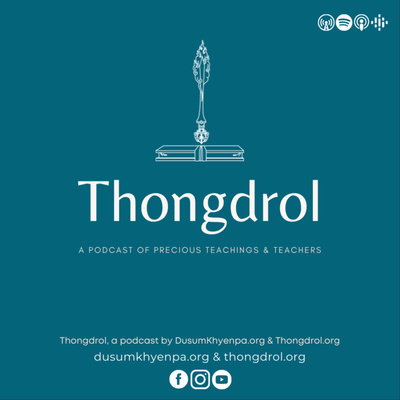
ThongdrolSherab Nyingpo Teaching by Geshe Lobsang Dawa Ep 7Sherab Nyingpo Teaching by Geshe Lobsang DawaThe Heart Sūtra or Sherab Nyingpo (ཤེས་རབ་སྙིང་པོ་) is perhaps the most popular Buddhist sūtra and certainly the sūtra most widely used and chanted in Tibet. Its full title in Sanskrit is Bhagavatīprajñāpāramitāhṛdaya and in Tibetan བཅོམ་ལྡན་འདས་མ་ཤེས་རབ་ཀྱི་ཕ་རོལ་ཏུ་ཕྱིན་པའི་སྙིང་པོ་ which translates as 'The Heart of the Blessed Perfection of Wisdom.' The followers of Mahāyāna Buddhism consider it as a sacred literature which falls within the category of the words of the Buddha. Thus, it is placed within the Perfection of Wisdom (ཤེར་ཕྱྱིན་) section of the kangyur (བཀའ་འགྱུར་) canon.According to the sūtra itself, the Heart Sūtra was taught by the Buddha while he was on Vulture Peak, Rajagṛha with his monastic and...
2021-10-112h 00
ThongdrolSherab Nyingpo Teaching by Geshe Lobsang Dawa Ep 6Sherab Nyingpo Teaching by Geshe Lobsang DawaThe Heart Sūtra or Sherab Nyingpo (ཤེས་རབ་སྙིང་པོ་) is perhaps the most popular Buddhist sūtra and certainly the sūtra most widely used and chanted in Tibet. Its full title in Sanskrit is Bhagavatīprajñāpāramitāhṛdaya and in Tibetan བཅོམ་ལྡན་འདས་མ་ཤེས་རབ་ཀྱི་ཕ་རོལ་ཏུ་ཕྱིན་པའི་སྙིང་པོ་ which translates as 'The Heart of the Blessed Perfection of Wisdom.' The followers of Mahāyāna Buddhism consider it as a sacred literature which falls within the category of the words of the Buddha. Thus, it is placed within the Perfection of Wisdom (ཤེར་ཕྱྱིན་) section of the kangyur (བཀའ་འགྱུར་) canon.According to the sūtra itself, the Heart Sūtra was taught by the Buddha while he was on Vulture Peak, Rajagṛha with his monastic and...
2021-10-111h 40
ThongdrolSherab Nyingpo Teaching by Geshe Lobsang Dawa Ep 5Sherab Nyingpo Teaching by Geshe Lobsang DawaThe Heart Sūtra or Sherab Nyingpo (ཤེས་རབ་སྙིང་པོ་) is perhaps the most popular Buddhist sūtra and certainly the sūtra most widely used and chanted in Tibet. Its full title in Sanskrit is Bhagavatīprajñāpāramitāhṛdaya and in Tibetan བཅོམ་ལྡན་འདས་མ་ཤེས་རབ་ཀྱི་ཕ་རོལ་ཏུ་ཕྱིན་པའི་སྙིང་པོ་ which translates as 'The Heart of the Blessed Perfection of Wisdom.' The followers of Mahāyāna Buddhism consider it as a sacred literature which falls within the category of the words of the Buddha. Thus, it is placed within the Perfection of Wisdom (ཤེར་ཕྱྱིན་) section of the kangyur (བཀའ་འགྱུར་) canon.According to the sūtra itself, the Heart Sūtra was taught by the Buddha while he was on Vulture Peak, Rajagṛha with his monastic and...
2021-10-111h 30
ThongdrolSherab Nyingpo Teaching by Geshe Lobsang Dawa Ep 4Sherab Nyingpo Teaching by Geshe Lobsang DawaThe Heart Sūtra or Sherab Nyingpo (ཤེས་རབ་སྙིང་པོ་) is perhaps the most popular Buddhist sūtra and certainly the sūtra most widely used and chanted in Tibet. Its full title in Sanskrit is Bhagavatīprajñāpāramitāhṛdaya and in Tibetan བཅོམ་ལྡན་འདས་མ་ཤེས་རབ་ཀྱི་ཕ་རོལ་ཏུ་ཕྱིན་པའི་སྙིང་པོ་ which translates as 'The Heart of the Blessed Perfection of Wisdom.' The followers of Mahāyāna Buddhism consider it as a sacred literature which falls within the category of the words of the Buddha. Thus, it is placed within the Perfection of Wisdom (ཤེར་ཕྱྱིན་) section of the kangyur (བཀའ་འགྱུར་) canon.According to the sūtra itself, the Heart Sūtra was taught by the Buddha while he was on Vulture Peak, Rajagṛha with his monastic and...
2021-10-1140 min
ThongdrolSherab Nyingpo Teaching by Geshe Lobsang Dawa Ep 3Sherab Nyingpo Teaching by Geshe Lobsang DawaThe Heart Sūtra or Sherab Nyingpo (ཤེས་རབ་སྙིང་པོ་) is perhaps the most popular Buddhist sūtra and certainly the sūtra most widely used and chanted in Tibet. Its full title in Sanskrit is Bhagavatīprajñāpāramitāhṛdaya and in Tibetan བཅོམ་ལྡན་འདས་མ་ཤེས་རབ་ཀྱི་ཕ་རོལ་ཏུ་ཕྱིན་པའི་སྙིང་པོ་ which translates as 'The Heart of the Blessed Perfection of Wisdom.' The followers of Mahāyāna Buddhism consider it as a sacred literature which falls within the category of the words of the Buddha. Thus, it is placed within the Perfection of Wisdom (ཤེར་ཕྱྱིན་) section of the kangyur (བཀའ་འགྱུར་) canon.According to the sūtra itself, the Heart Sūtra was taught by the Buddha while he was on Vulture Peak, Rajagṛha with his monastic and...
2021-10-1149 min
ThongdrolSherab Nyingpo Teaching by Geshe Lobsang Dawa Ep 2Sherab Nyingpo Teaching by Geshe Lobsang Dawa Ep 1The Heart Sūtra or Sherab Nyingpo (ཤེས་རབ་སྙིང་པོ་) is perhaps the most popular Buddhist sūtra and certainly the sūtra most widely used and chanted in Tibet. Its full title in Sanskrit is Bhagavatīprajñāpāramitāhṛdaya and in Tibetan བཅོམ་ལྡན་འདས་མ་ཤེས་རབ་ཀྱི་ཕ་རོལ་ཏུ་ཕྱིན་པའི་སྙིང་པོ་ which translates as 'The Heart of the Blessed Perfection of Wisdom.' The followers of Mahāyāna Buddhism consider it as a sacred literature which falls within the category of the words of the Buddha. Thus, it is placed within the Perfection of Wisdom (ཤེར་ཕྱྱིན་) section of the kangyur (བཀའ་འགྱུར་) canon.According to the sūtra itself, the Heart Sūtra was taught by the Buddha while he was on Vulture Peak, Rajagṛha with his monastic...
2021-10-1148 min
ThongdrolSherab Nyingpo Teaching by Geshe Lobsang Dawa Ep 1Sherab Nyingpo Teaching by Geshe Lobsang Dawa Ep 1The Heart Sūtra or Sherab Nyingpo (ཤེས་རབ་སྙིང་པོ་) is perhaps the most popular Buddhist sūtra and certainly the sūtra most widely used and chanted in Tibet. Its full title in Sanskrit is Bhagavatīprajñāpāramitāhṛdaya and in Tibetan བཅོམ་ལྡན་འདས་མ་ཤེས་རབ་ཀྱི་ཕ་རོལ་ཏུ་ཕྱིན་པའི་སྙིང་པོ་ which translates as 'The Heart of the Blessed Perfection of Wisdom.' The followers of Mahāyāna Buddhism consider it as a sacred literature which falls within the category of the words of the Buddha. Thus, it is placed within the Perfection of Wisdom (ཤེར་ཕྱྱིན་) section of the kangyur (བཀའ་འགྱུར་) canon.According to the sūtra itself, the Heart Sūtra was taught by the Buddha while he was on Vulture Peak, Rajagṛha with his monastic and...
2021-10-111h 37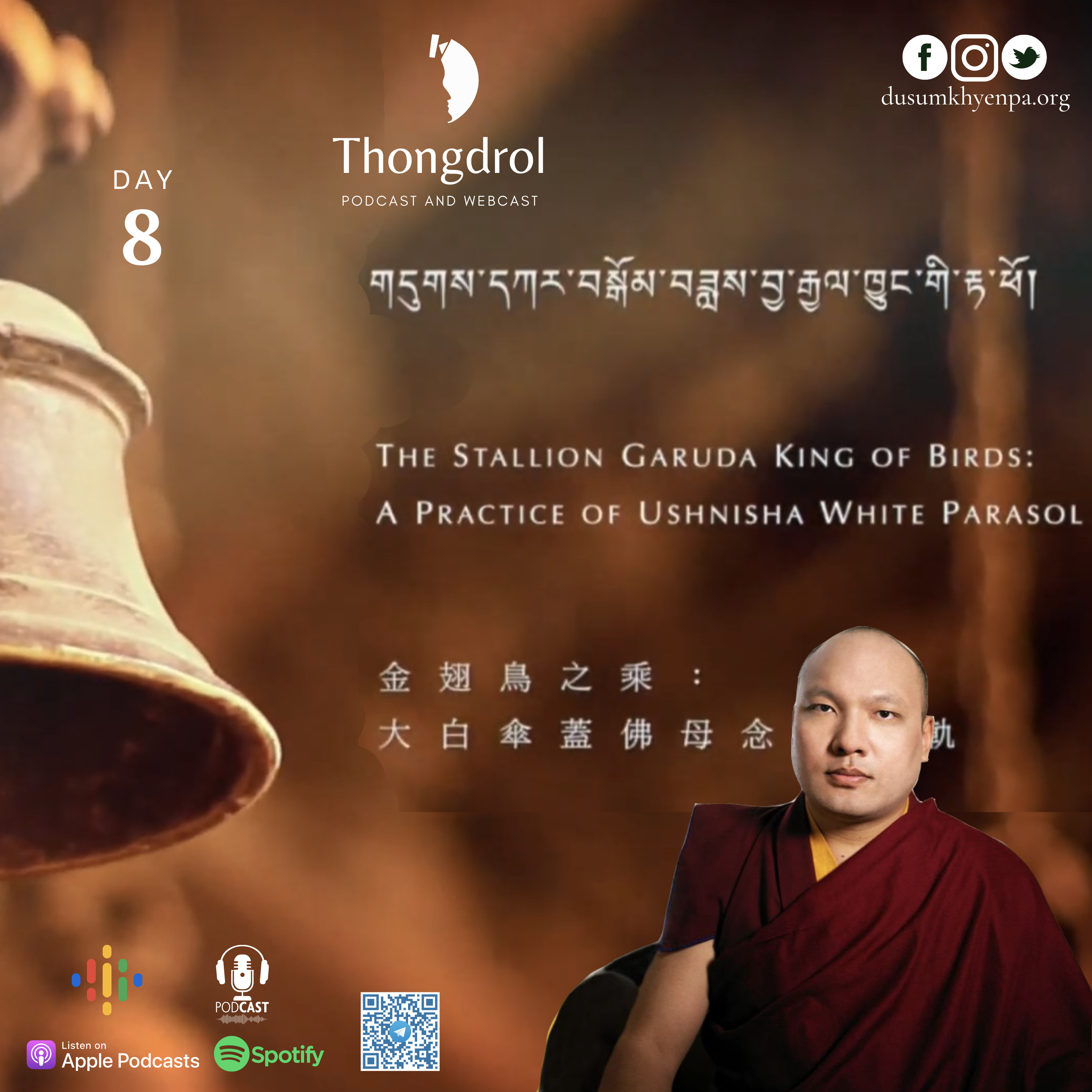
Thongdrolགདུགས་དཀར། སེང་གདོང་མ། འོད་ཟེར་ཅན་མའི་གཟུངས། ས་སྐྱ་ནད་གྲོལ། Dharani Mantras, Prayer that Saved Sakya from Disease - Day 8རྐྱེན་ཟློག་སྨོན་ལམ་ཆེན་མོ། བདེ་སྨོན། ཉིན་དྲུག་པ། Aspirations to End Adversity Day 8
གདུགས་དཀར།་སེང་གདོང་མ།་འོད་ཟེར་ཅན་མའི་གཟུངས།་ས་སྐྱ་ནད་གྲོལ། The Dharani Mantras of Sitatapatra, Simhamukha, and Marichi . The Prayer that Saved Sakya from Disease
An aspiration to End Adversity, Online Prayer led by HH the Gyalwang Karmapa.
January 20 to 27, 2021, IST 6:30 PM
2021-01-271h 16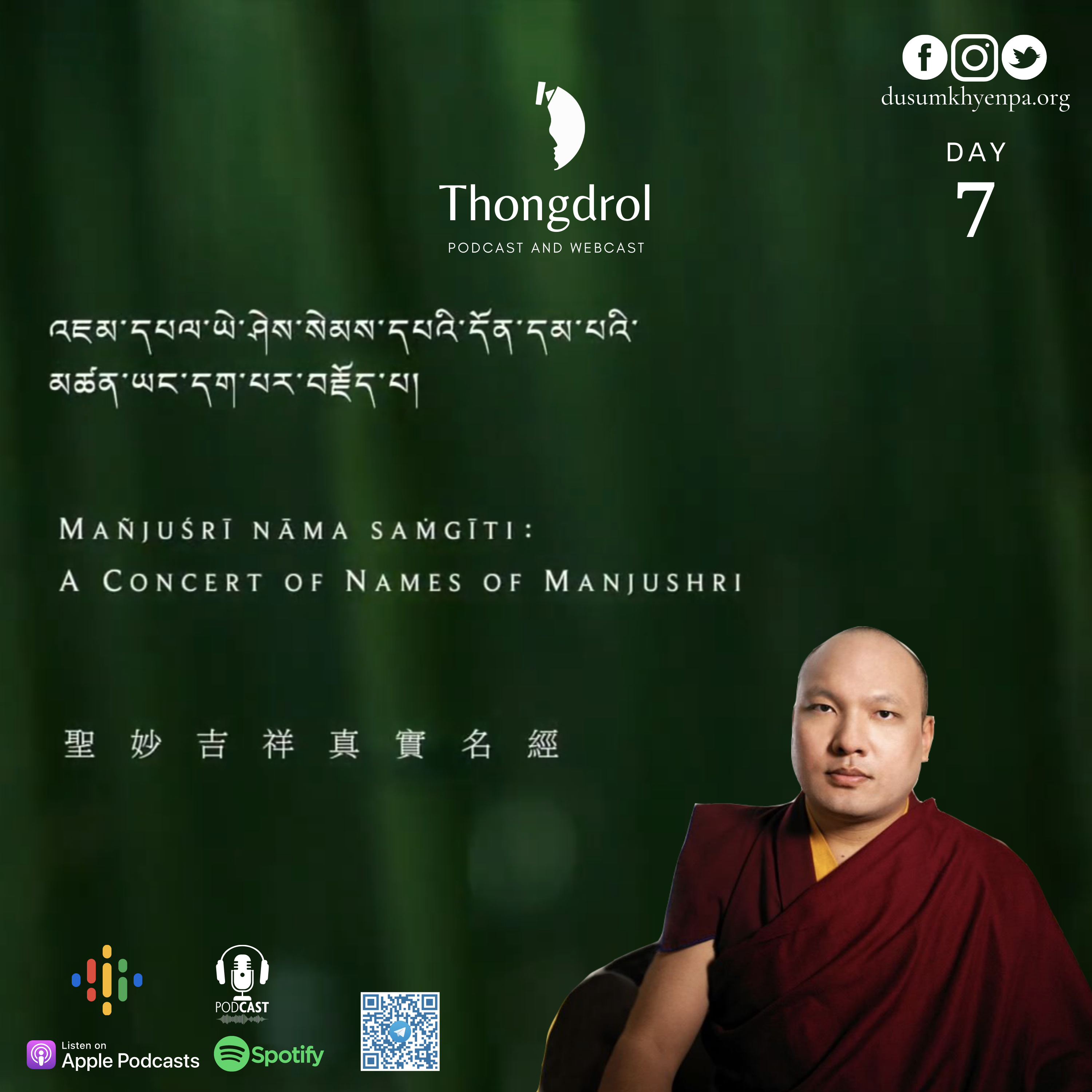
Thongdrolའཇམ་དཔལ་མཚན་བརྫོད། Professing the Qualities of Manjushri - Day 7རྐྱེན་ཟློག་སྨོན་ལམ་ཆེན་མོ། བདེ་སྨོན། ཉིན་དྲུག་པ། Aspirations to End Adversity Day 7
འཇམ་དཔལ་མཚན་བརྫོད། Professing the Qualities of Manjushri
An aspiration to End Adversity, Online Prayer led by HH the Gyalwang Karmapa.
January 20 to 27, 2021, IST 6:30 PM
2021-01-2635 min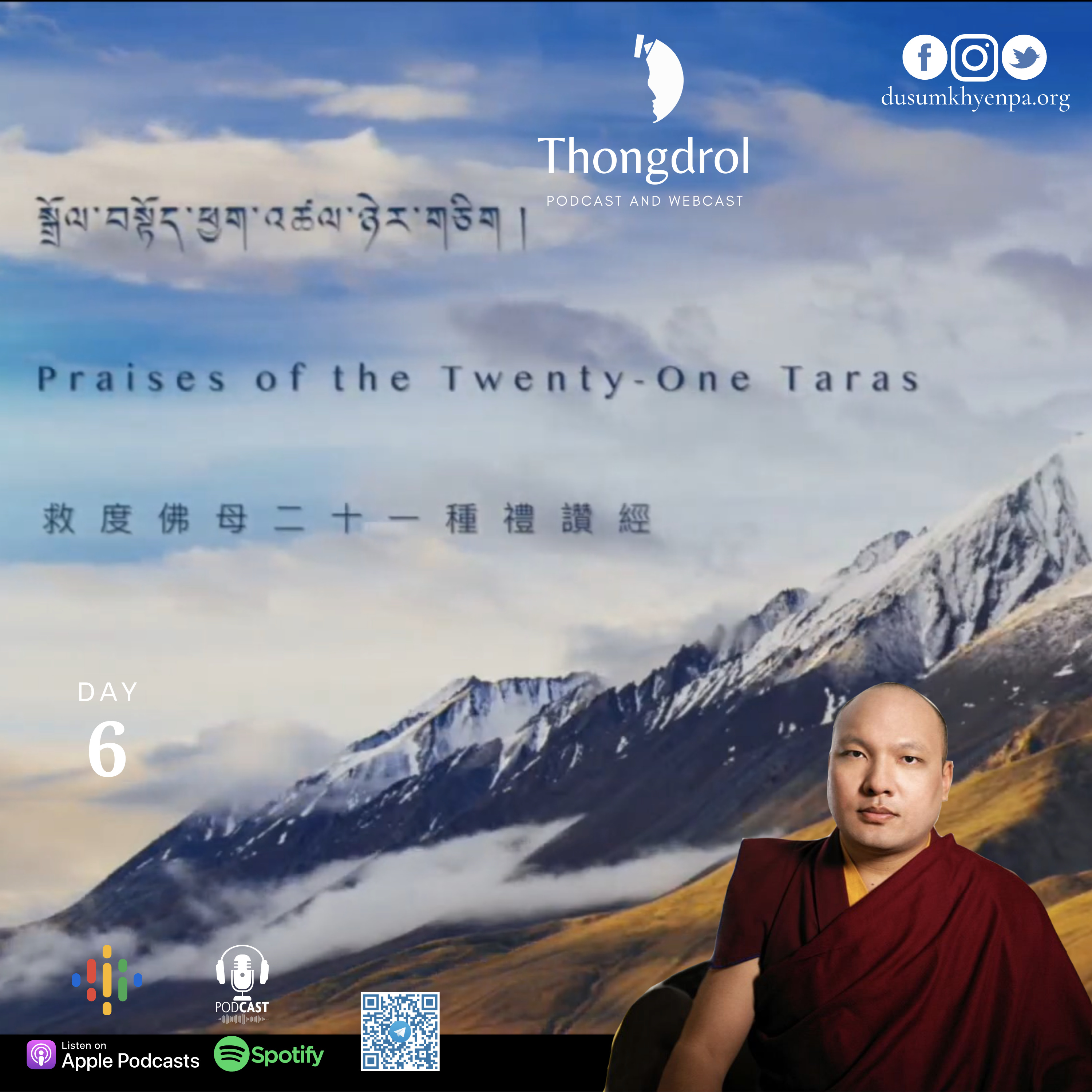
Thongdrolབར་བསམ་སྒྲོལ་གསུམ། Supplication to Guru Rinpoche | Praises of Tara - Day 6རྐྱེན་ཟློག་སྨོན་ལམ་ཆེན་མོ། བདེ་སྨོན། ཉིན་དྲུག་པ། Aspirations to End Adversity Day 6
བར་བསམ་སྒྲོལ་གསུམ། Supplication to Guru Rinpoche | Praises of Tara
An aspiration to End Adversity, Online Prayer led by HH the Gyalwang Karmapa.
January 20 to 27, 2021, IST 6:30 PM
2021-01-2554 min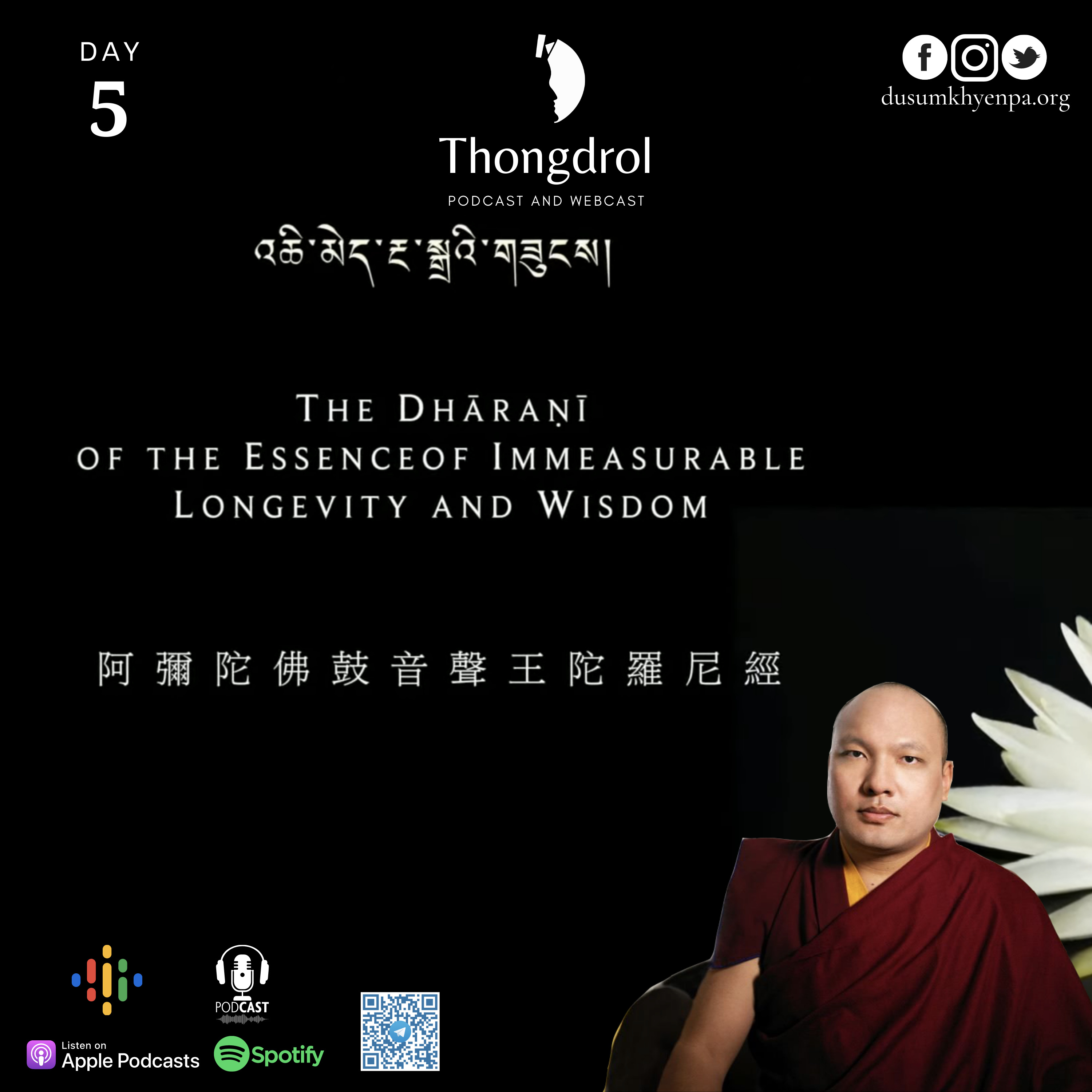
Thongdrolའཆི་་མེད་རྔ་སྒྲའི་གཟུགས་མདོ། བདེ་སྨོན། The Dharani Sutra of the Sound of Drum of Deathlessness - Day 5རྐྱེན་ཟློག་སྨོན་ལམ་ཆེན་མོ། བདེ་སྨོན། ཉིན་ལྔ་པ། Aspirations to End Adversity Day 5
འཆི་་མེད་རྔ་སྒྲའི་གཟུགས་མདོ། བདེ་སྨོན། The Dharani Sutra of the Sound of Drum of Deathlessness
An aspiration to End Adversity, Online Prayer led by HH the Gyalwang Karmapa.
January 20 to 27, 2021, IST 6:30 PM
2021-01-2437 min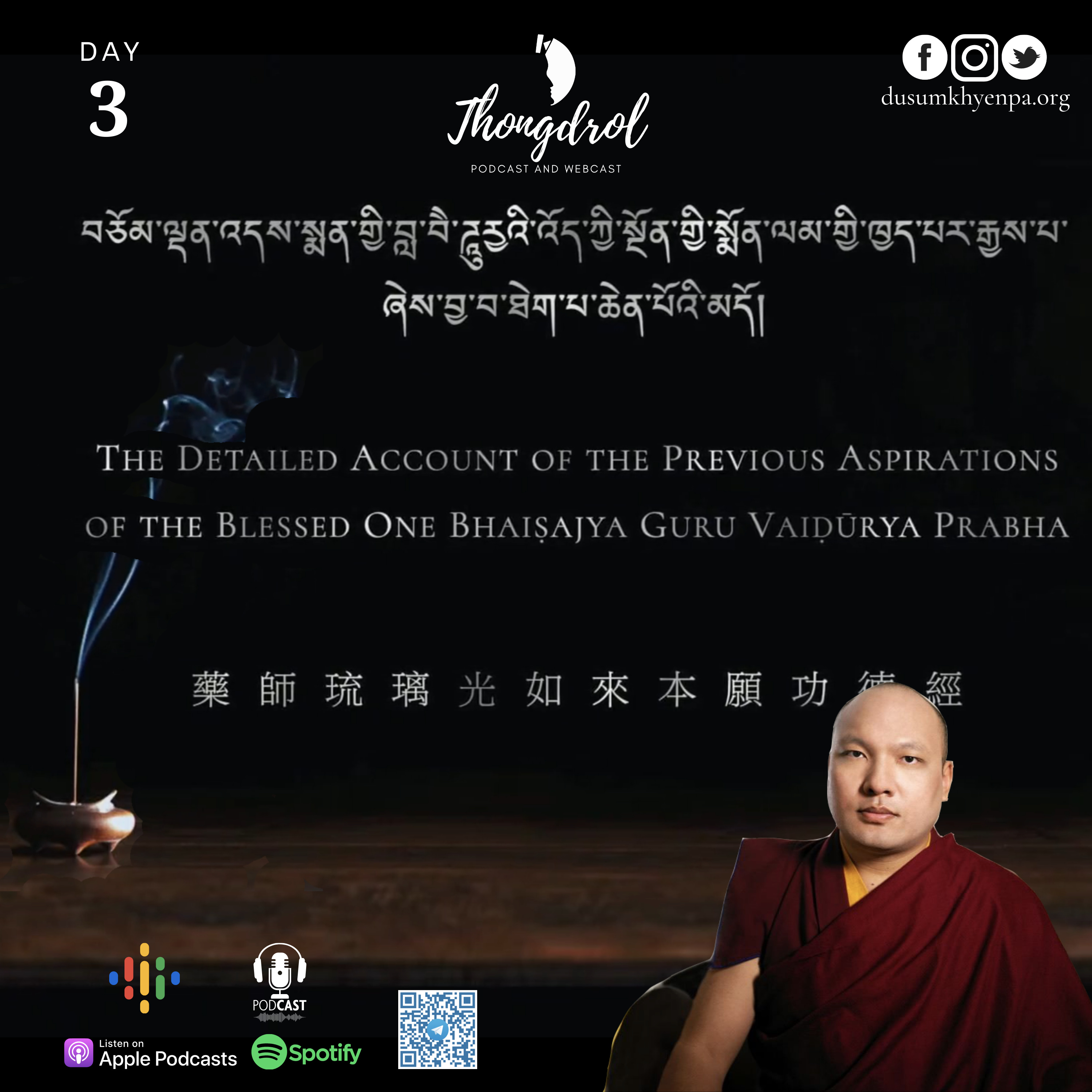
Thongdrolསྨན་བླའི་མདོ། The Medicine Buddha Sutra - Day 4རྐྱེན་ཟློག་སྨོན་ལམ་ཆེན་མོ། ཉིན་བཞི་པ། Aspirations to End Adversity Day 4
སྨན་བླའི་མདོ། The Medicine Buddha Sutra
An aspiration to End Adversity, Online Prayer led by HH the Gyalwang Karmapa.
January 20 to 27, 2021, IST 6:30 PM
2021-01-2343 min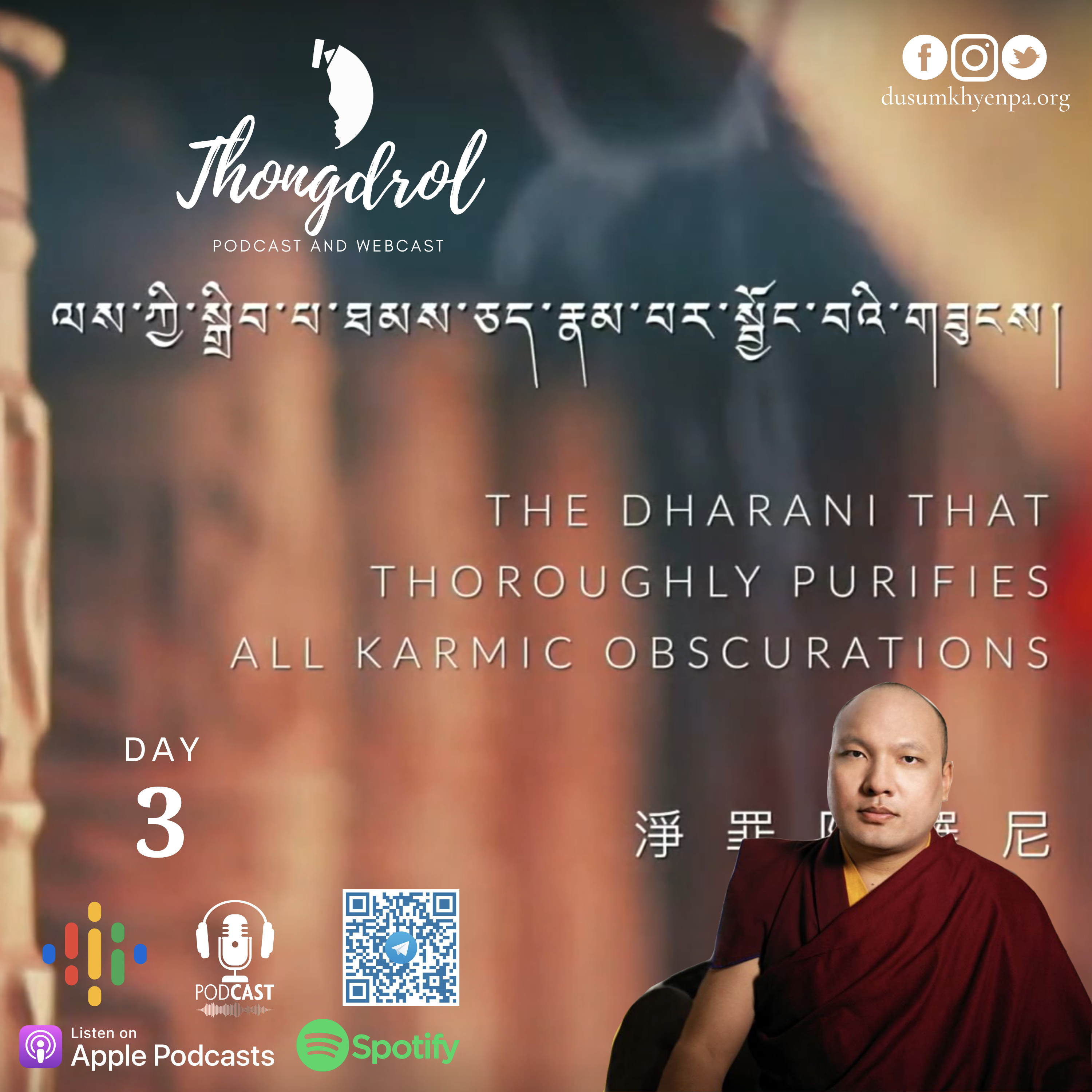
Thongdrolམི་འཁྲུགས་པའི་གཟུངས་མདོ། Sutras of the Dharani of Akshobhya - Day 3རྐྱེན་ཟློག་སྨོན་ལམ་ཆེན་མོ། ཉིན་ ༣ ། Aspirations to End Adversity Day 3
མི་འཁྲུགས་པའི་གཟུངས་མདོ། Sutras of the Dharani of Akshobhya
An aspiration to End Adversity, Online Prayer led by HH the Gyalwang Karmapa.
January 20 to 27, 2021, IST 6:30 PM
2021-01-2248 min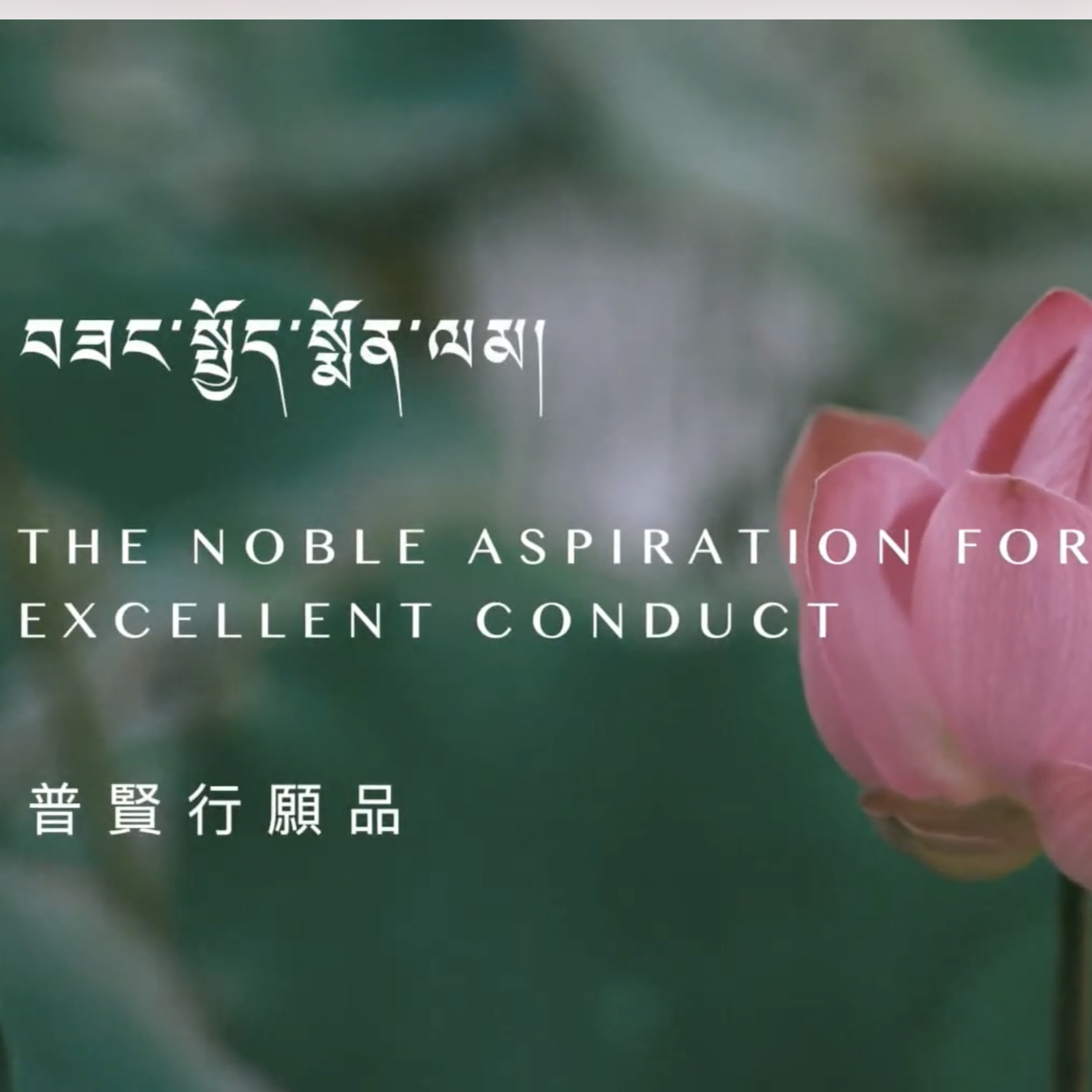
Thongdrolབཟང་སྤྱོད། ལྟུང་བཤགས། The Noble Aspiration for Excellent Conduct | The Sutra in Three Sections - Day 2རྐྱེན་ཟློག་སྨོན་ལམ་ཆེན་མོ། ཉིན་དང་པོ། Aspirations to End Adversity Day 2
བཟང་སྤྱོད། ལྟུང་བཤགས། The Noble Aspiration for Excellent Conduct | The Sutra in Three Sections
An aspiration to End Adversity, Online Prayer led by HH the Gyalwang Karmapa.
January 20 to 27, 2021, IST 6:30 PM
2021-01-2145 min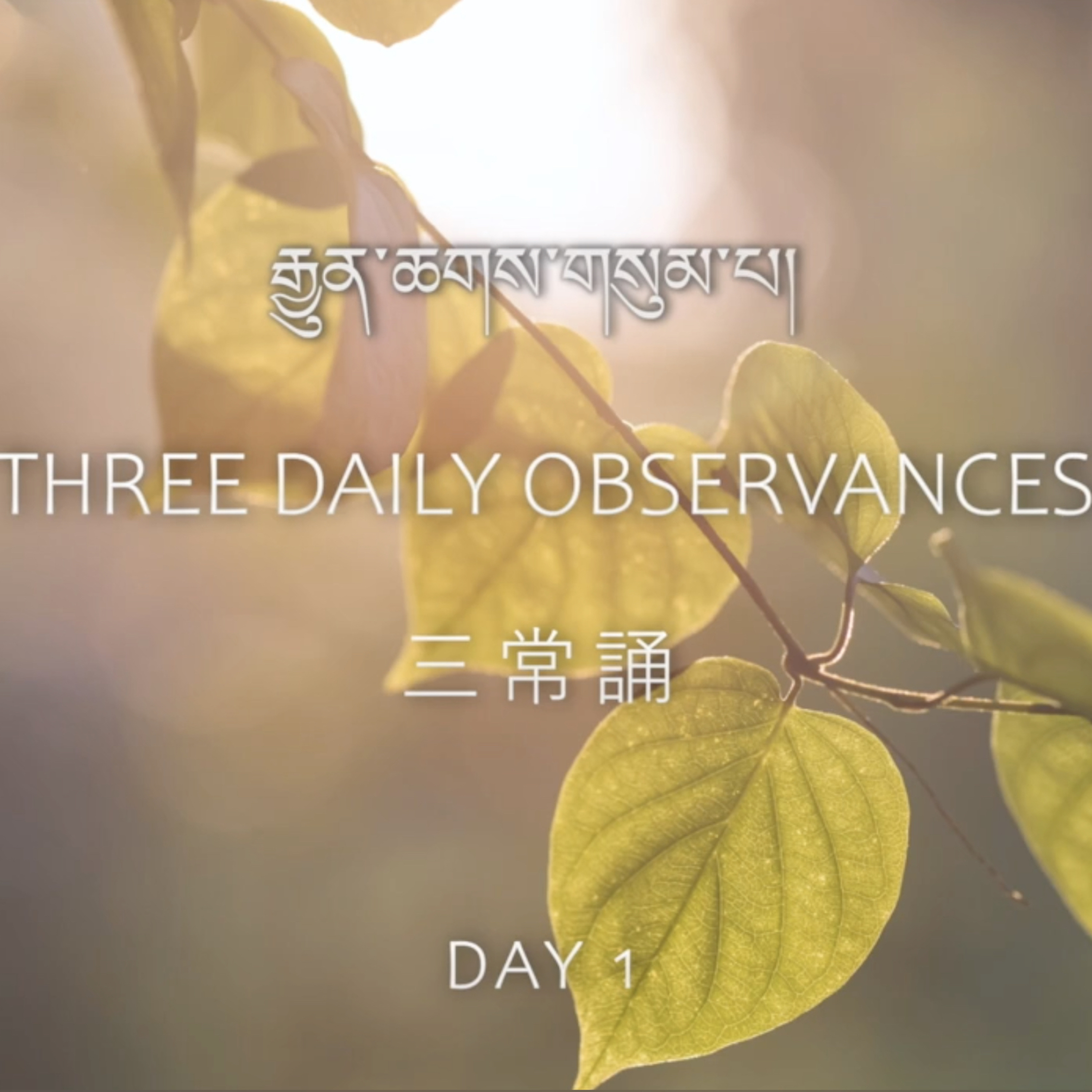
Thongdrolརྒྱུན་ཆགས་གསུམ་པ་དང་། ཤེར་སྙིང་བདུད་ཟློག ། - The Heart Sutra with the Repulsion of Maras - Day 1རྐྱེན་ཟློག་སྨོན་ལམ་ཆེན་མོ། ཉིན་དང་པོ། Aspirations to End Adversity Day 1
རྒྱུན་ཆགས་གསུམ་པ་དང་། ཤེར་སྙིང་བདུད་ཟློག ། The Three Daily Practices - The Heart Sutra with the Repulsion of Maras
An aspiration to End Adversity, Online Prayer led by HH the Gyalwang Karmapa.
January 20 to 27, 2021, IST 6:30 PM
2021-01-2138 min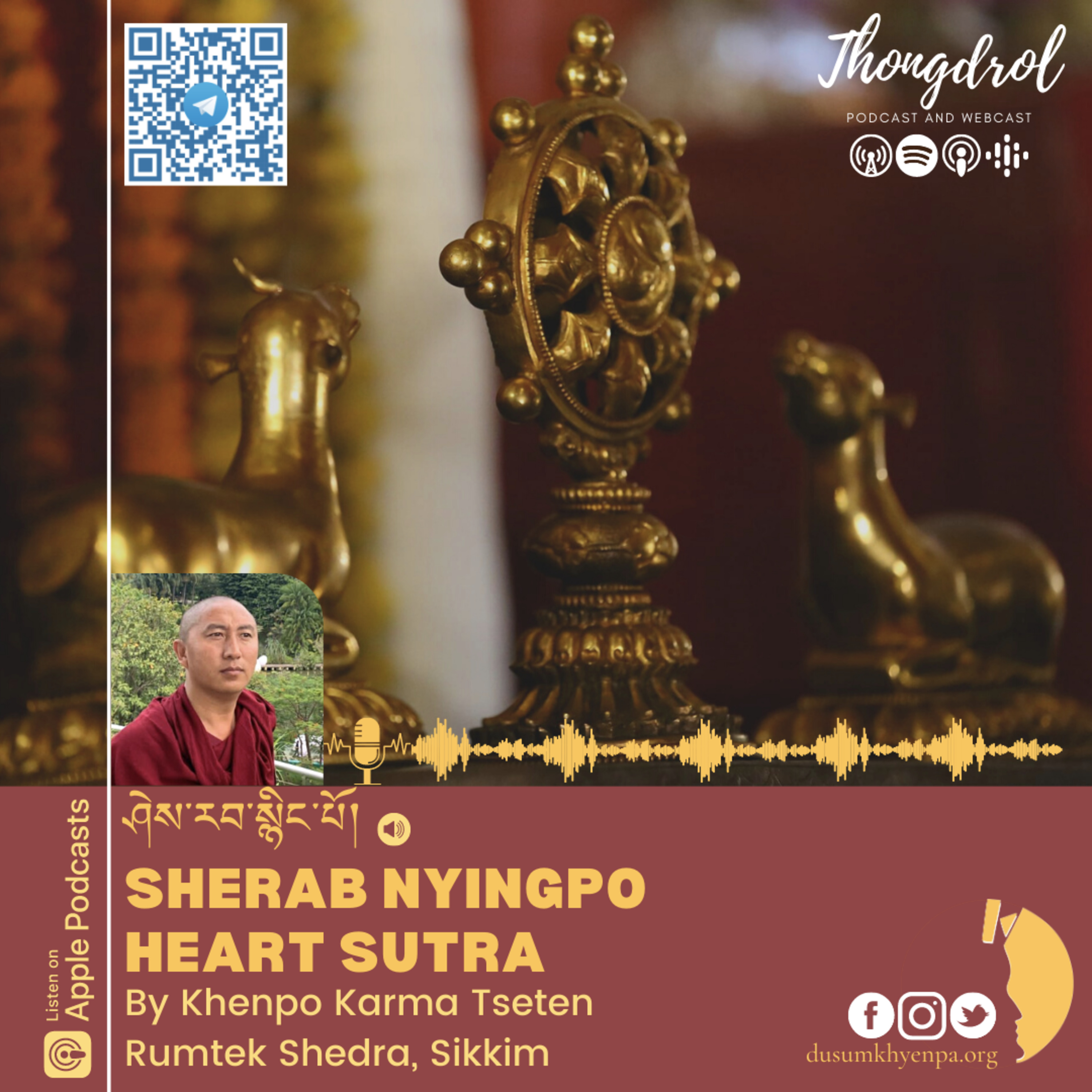
ThongdrolSherab Nyingpo Ep 7 - Heart Sutra by Khenpo Karma Tseten - 7The Heart Sutra(བཅོམ་ལྡན་འདས་མ་ཤེས་རབ་ཀྱི་ཕ་རོལ་ཏུ་ཕྱིན་པའི་སྙིང་པོ) is the most widely known sutra of the Mahayana tradition of Tibetan Buddhism. It is part of the Prajnaparamita Sutras, which is a collection of about 40 sutras composed between 100 BCE and 500 CE. The Heart Sutra is a presentation of profound wisdom on the nature of emptiness.
The Sutra famously states, "Form is emptiness (śūnyatā), emptiness is form." It is a condensed exposé on the Buddhist Mahayana teaching of the Two Truths doctrine, which says that ultimately all phenomena are sunyata, empty of an unchanging essence. This emptiness is a 'characteristic' of all phenomena, and not a transcendent reality, but also "empty" of essence of its own. Specifically, it is a response to Sarv...
2020-11-1900 min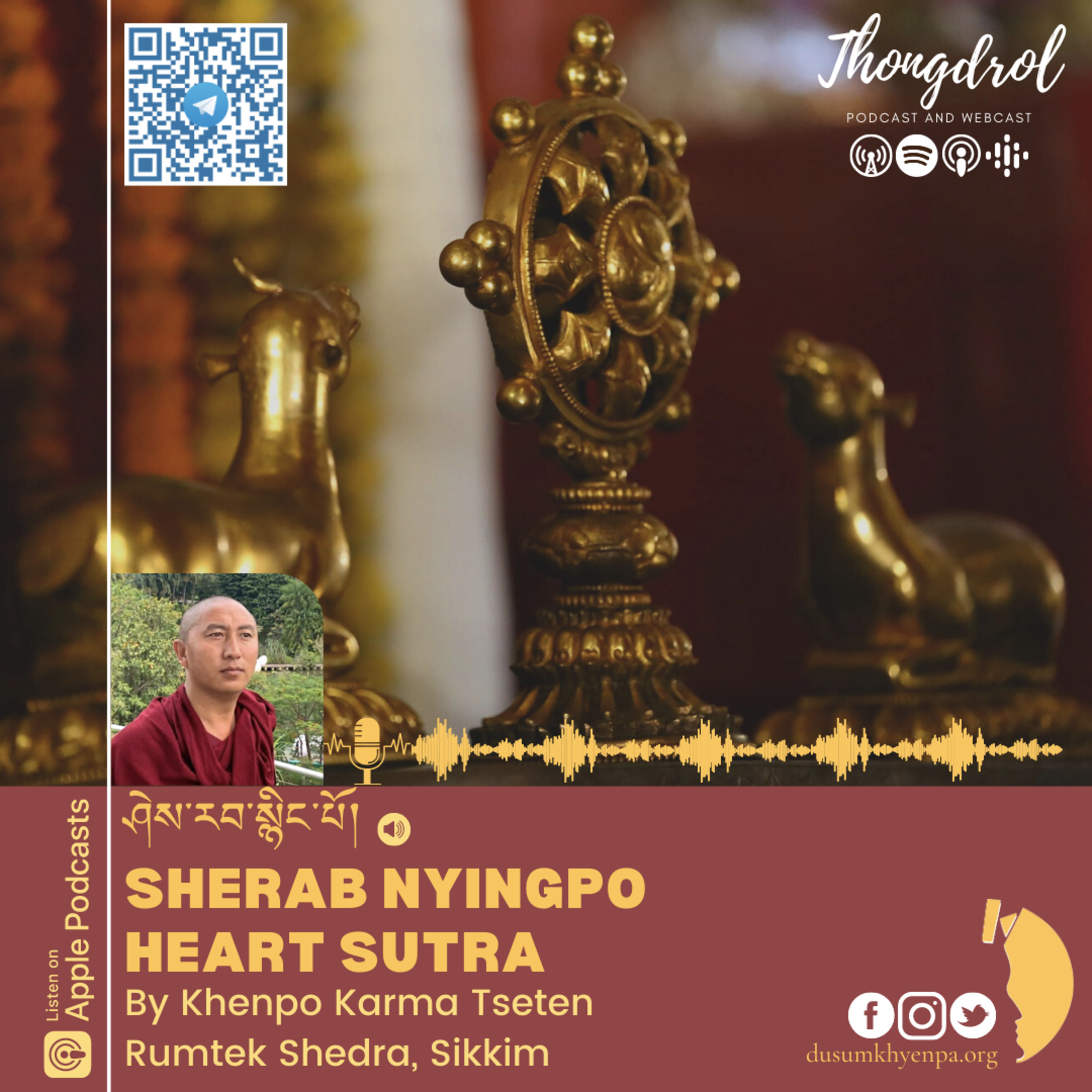
ThongdrolSherab Nyingpo Ep 6 - Heart Sutra by Khenpo Karma Tseten - 6The Heart Sutra(བཅོམ་ལྡན་འདས་མ་ཤེས་རབ་ཀྱི་ཕ་རོལ་ཏུ་ཕྱིན་པའི་སྙིང་པོ) is the most widely known sutra of the Mahayana tradition of Tibetan Buddhism. It is part of the Prajnaparamita Sutras, which is a collection of about 40 sutras composed between 100 BCE and 500 CE. The Heart Sutra is a presentation of profound wisdom on the nature of emptiness.
The Sutra famously states, "Form is emptiness (śūnyatā), emptiness is form." It is a condensed exposé on the Buddhist Mahayana teaching of the Two Truths doctrine, which says that ultimately all phenomena are sunyata, empty of an unchanging essence. This emptiness is a 'characteristic' of all phenomena, and not a transcendent reality, but also "empty" of essence of its own. Specifically, it is a response to Sarv...
2020-11-1900 min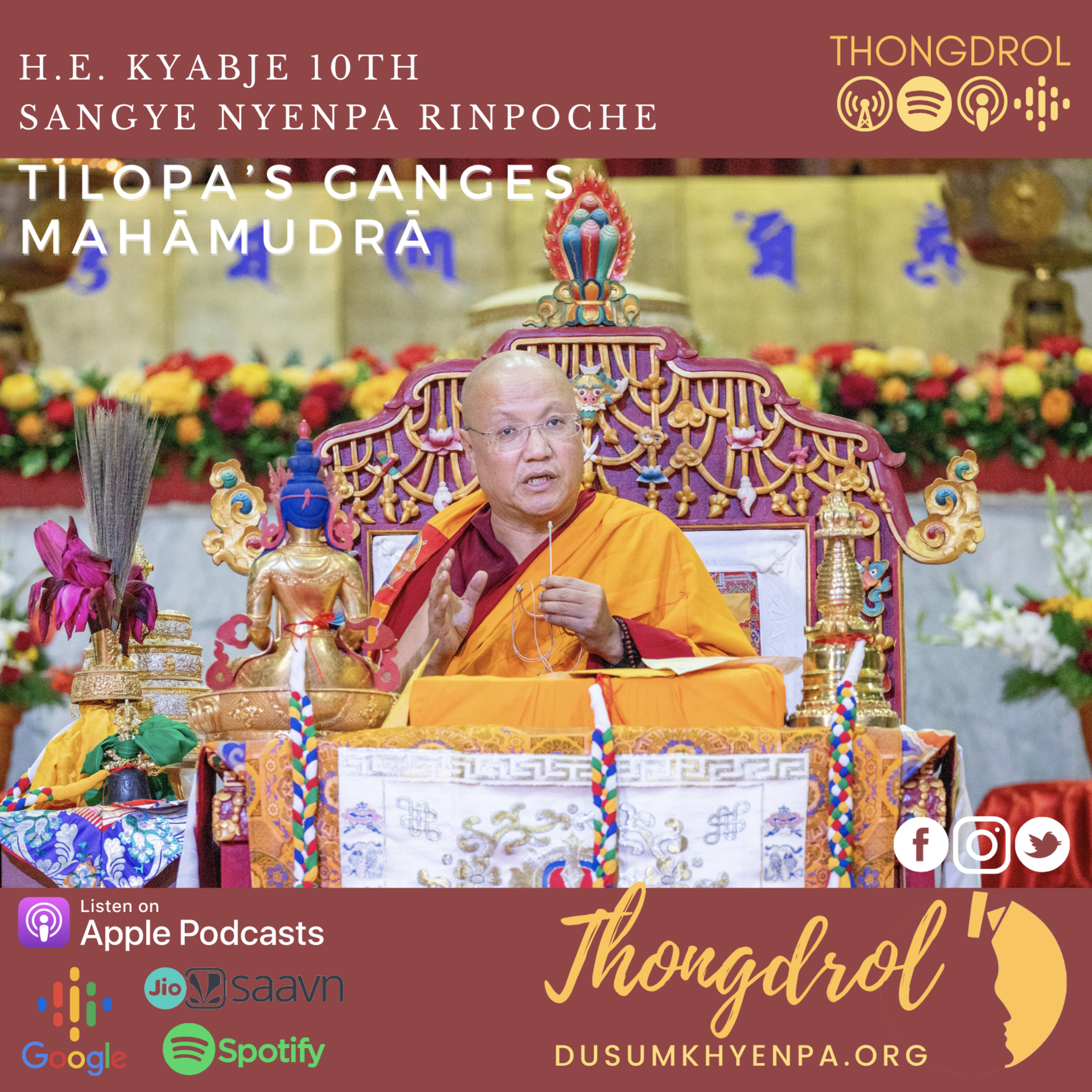
ThongdrolTilopa’s Ganges Mahāmudrā Ep 6 (ENGLISH) Sangye Nyenpa RinpocheRinpoche instructed that to “rest in naked awareness” is for the mind to be natural, unaltered, fresh. All the intellectual dharmas are created and you will not be able to see the uncreated meaning. So, for this reason, take all practices and all appearances as the path without heed. The best practice, whether sitting and looking at the mind, is to practice without any sessions or breaks. Look at the mind all the time whether you are going, lying down, eating, or sitting. This is called the spiritual practice of no sessions or b...
2020-11-1700 min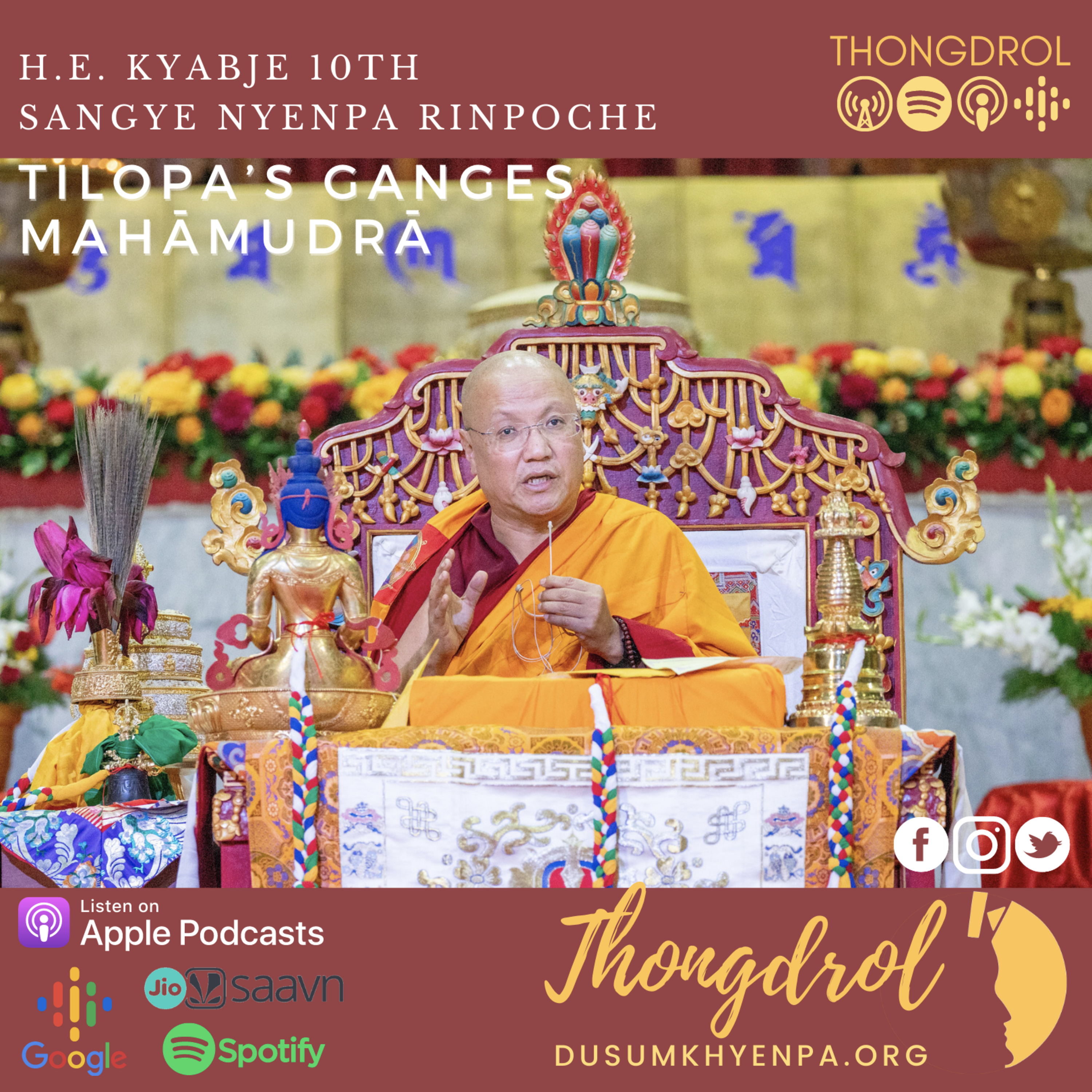
ThongdrolTilopa’s Ganges Mahāmudrā Ep 5 (ENGLISH) Sangye Nyenpa RinpocheIgnorance Is a Problem
If that is so, how does samsara come about? In the beginning of Entering the Middle Way, Chandrakirti explains:
First you think “I” and cling to a self,
Then you think “mine” and cling to things.” (Ch. 1, v3ab)
Like a turning water wheel, you circle around in samsara due to clinging to an “I,” and once you have fixated on this self, there is “mine,” what belongs to you, and then comes the “other,” those seen as enemies, and so forth. This is the usual way that samsara app...
2020-11-1700 min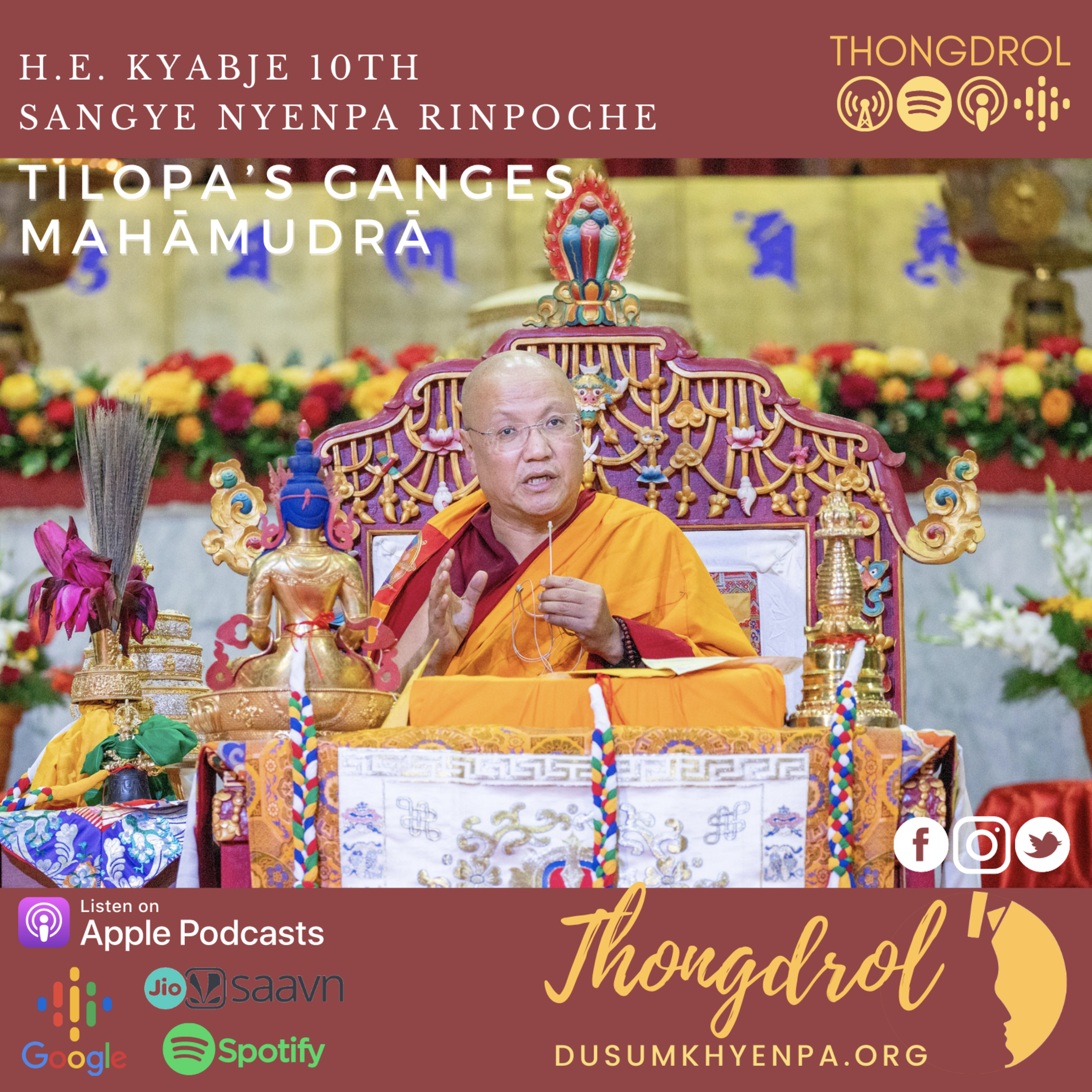
ThongdrolTilopa’s Ganges Mahāmudrā Ep 4 (ENGLISH) Sangye Nyenpa RinpocheIn the afternoon session on The Ganges Mahāmudrā (Mahāmudrā Upadeśa), HE Kyabje Drubwang Sangye Nyenpa Rinpoche continued his teaching by discussing conduct. In the morning session, he discussed the view and meditation on non-arising and non-fixation. Conduct is what manifests naturally from that view and meditation. Rinpoche said that “to manifest non-arising we need to follow the stages of the path to realize that.”
One of the first points Rinpoche discussed was the importance of not being attached to your own views, and disparaging the views of others. This...
2020-11-1700 min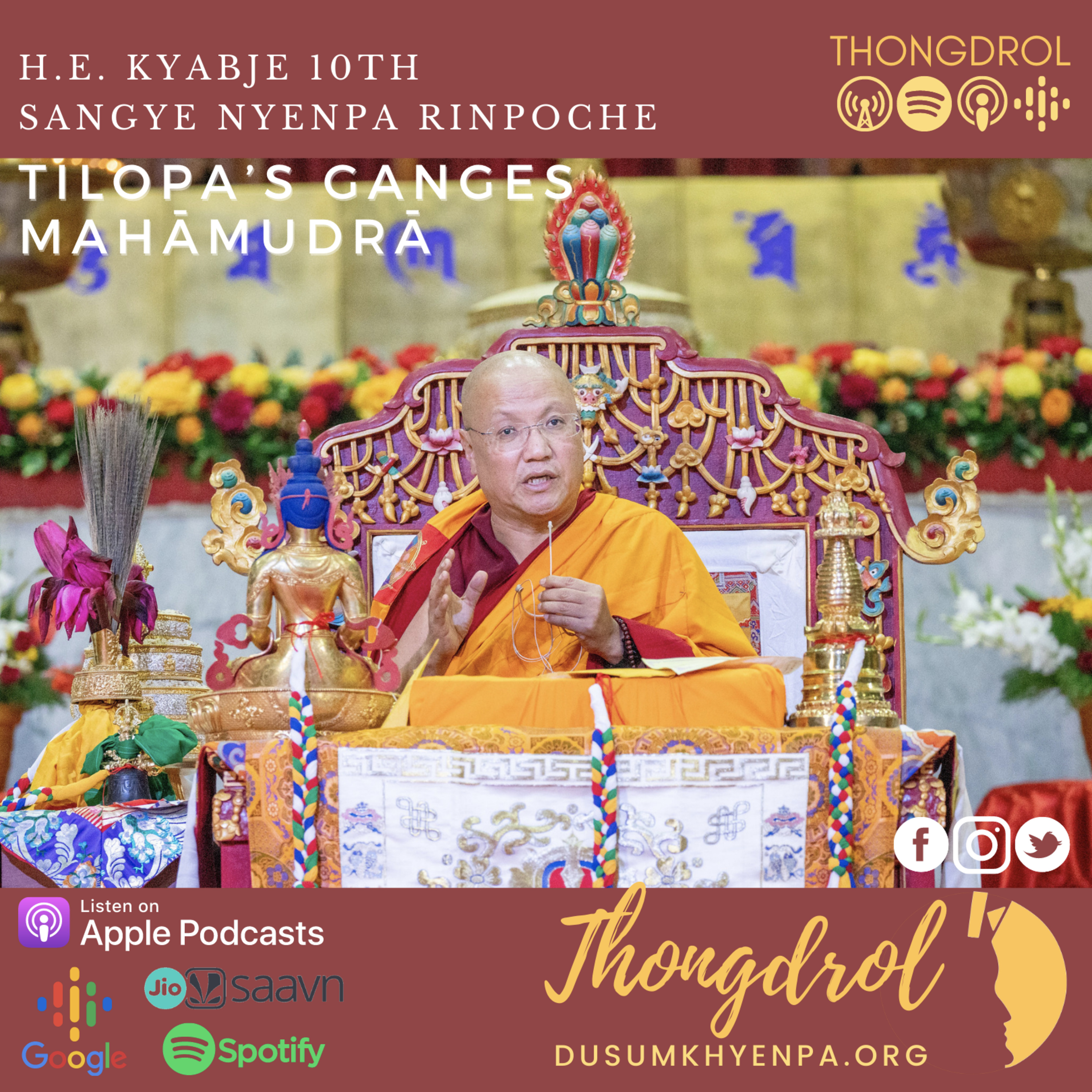
ThongdrolTilopa’s Ganges Mahāmudrā Ep 3 (ENGLISH) Sangye Nyenpa RinpocheHE Kyabje Drubwang Sangye Nyenpa Rinpoche began the second day of teachings on the The Ganges Mahāmudrā (Mahāmudrā Upadeśa) summarizing key aspects of the first afternoon session. Given their importance, he re-emphasized the four characteristics of the student who can be taught the profound instructions. These characteristics – enduring hardship, guru devotion, bearing suffering, and intelligent wisdom (prajña) – are key for any student who sincerely takes to heart that Mahāmudrā cannot be shown. Using the analogy of moonlight hidden by clouds, Rinpoche stressed that obscurations of thought also dissipate from th...
2020-11-1700 min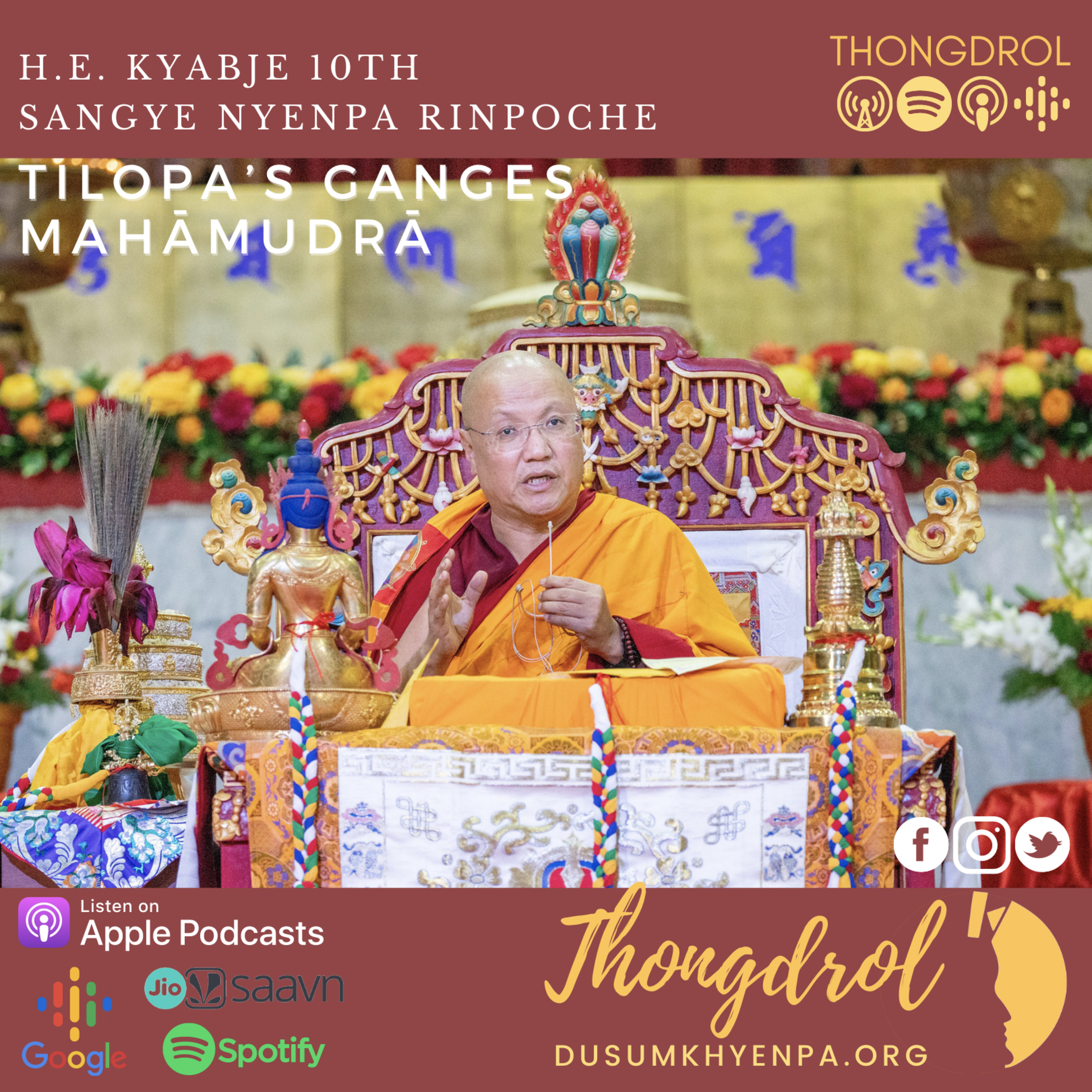
ThongdrolTilopa’s Ganges Mahāmudrā Ep 6 (TIBETAN) Sangye Nyenpa RinpocheThroughout the teaching, Rinpoche reminded us that in order to realize this ultimate view, we begin with going forth and following the stages of the path. The View must be connected with scripture and logic. Then, we can practice meditation on egoless-ness. Meditation must be connected with non-fixation and Conduct becomes manifest with experience. The verse says,
Alas! Examine worldly phenomena well.
They cannot withstand analysis, like dreams and illusions.
Dreams and illusions do not exist in actuality.
Therefore, rouse weariness and give up worldly affairs.
Sever all ties...
2020-11-1700 min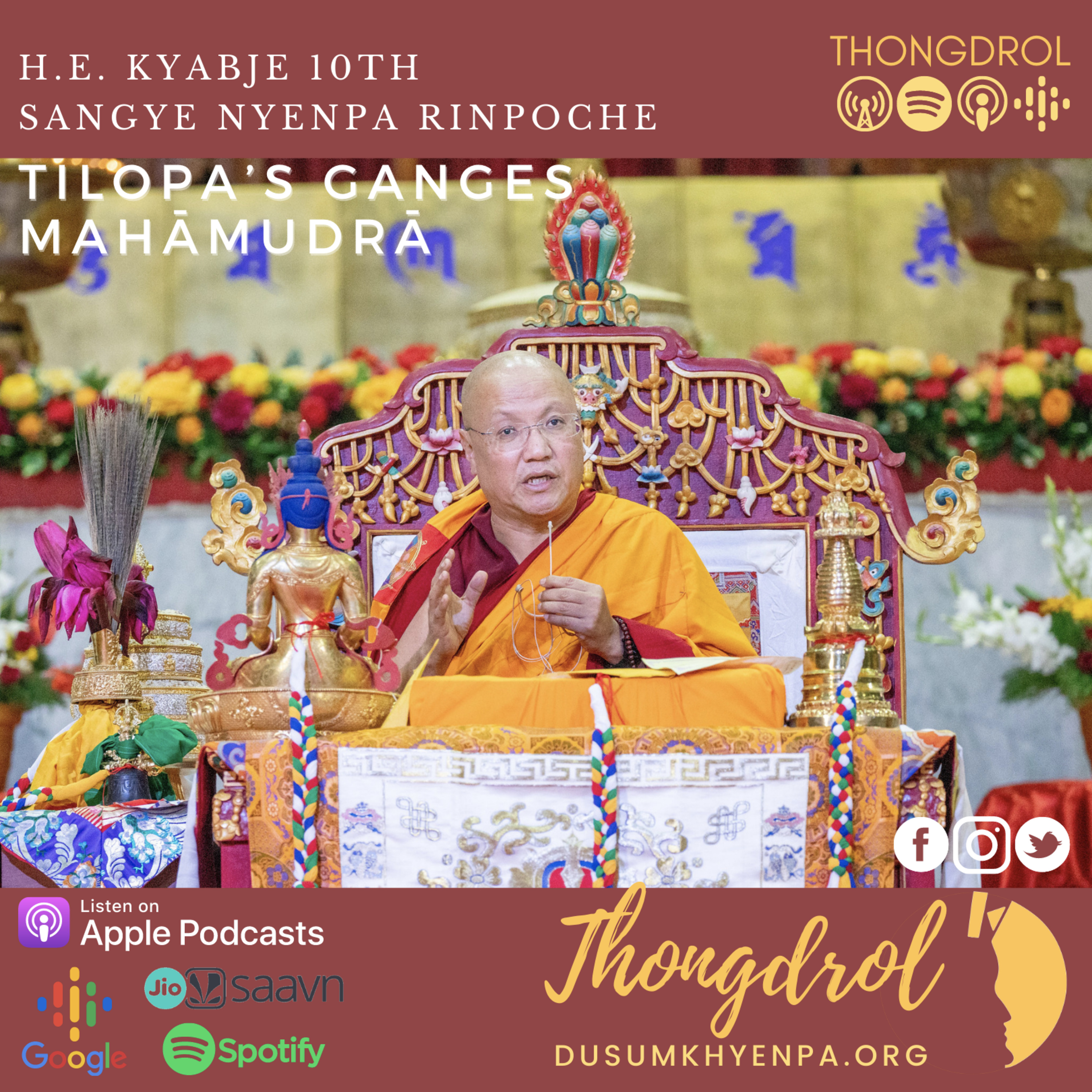
ThongdrolTilopa’s Ganges Mahāmudrā Ep 5 (TIBETAN) Sangye Nyenpa RinpocheReminding everyone to hold bodhichitta in their hearts, Kyabje Drubwang Sangye Nyenpa Rinpoche began his third and last day of teaching Tilopa’s Ganges Mahamudra, the upadesha or key instructions for the practice of mahamudra. At the start of his talk, Nyenpa Rinpoche reviewed the previous verses and added new commentary. He explained that highly developed adepts could realize the whole text by simply hearing the title. Summarizing the text’s meaning at the next level comes in the traditional prostration of the translator:
I prostrate to the glorious Vajra Dakini.
He...
2020-11-1700 min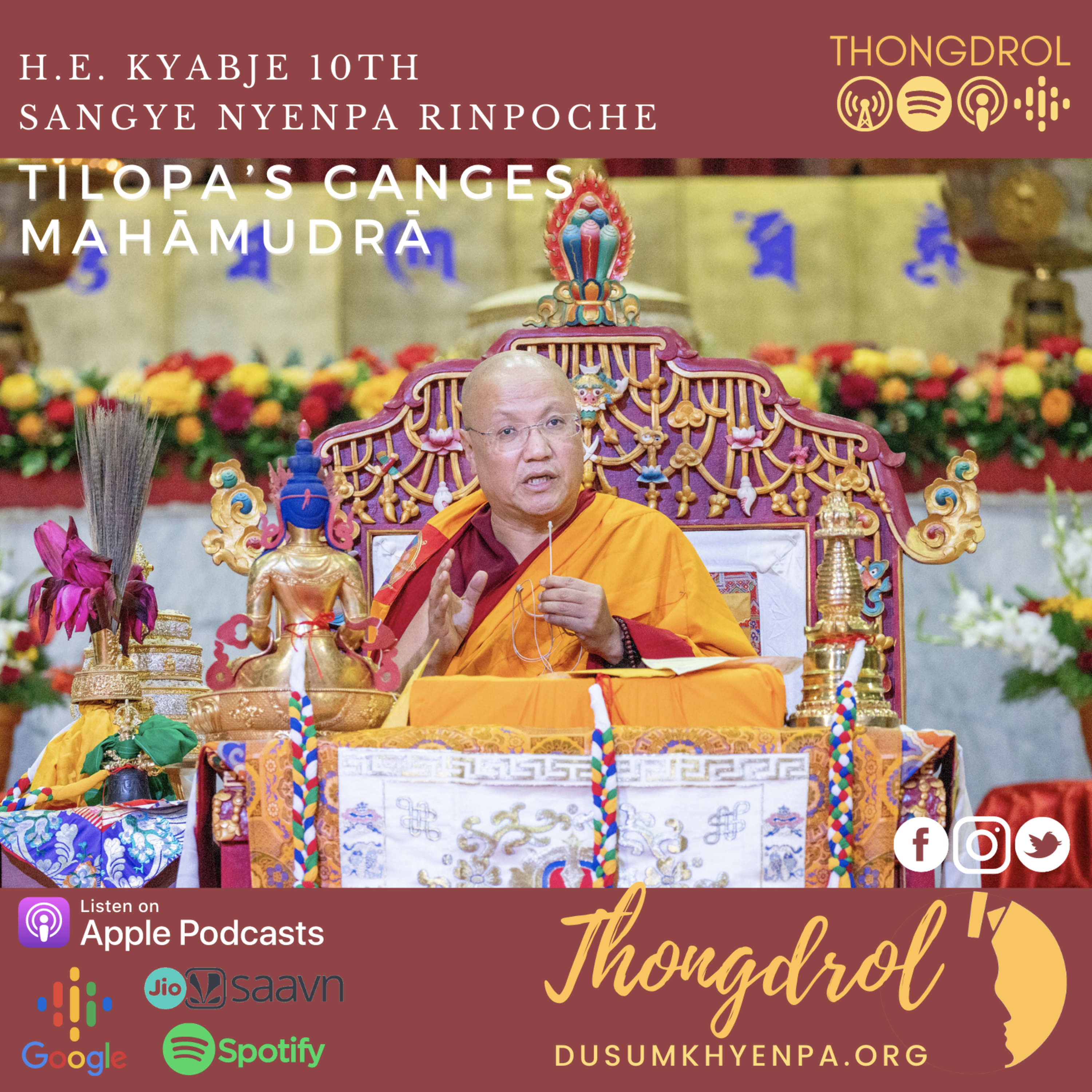
ThongdrolTilopa’s Ganges Mahāmudrā Ep 4 (TIBETAN) Sangye Nyenpa RinpocheIn the afternoon session on The Ganges Mahāmudrā (Mahāmudrā Upadeśa), HE Kyabje Drubwang Sangye Nyenpa Rinpoche continued his teaching by discussing conduct. In the morning session, he discussed the view and meditation on non-arising and non-fixation. Conduct is what manifests naturally from that view and meditation. Rinpoche said that “to manifest non-arising we need to follow the stages of the path to realize that.”
One of the first points Rinpoche discussed was the importance of not being attached to your own views, and disparaging the views of others. This...
2020-11-1700 min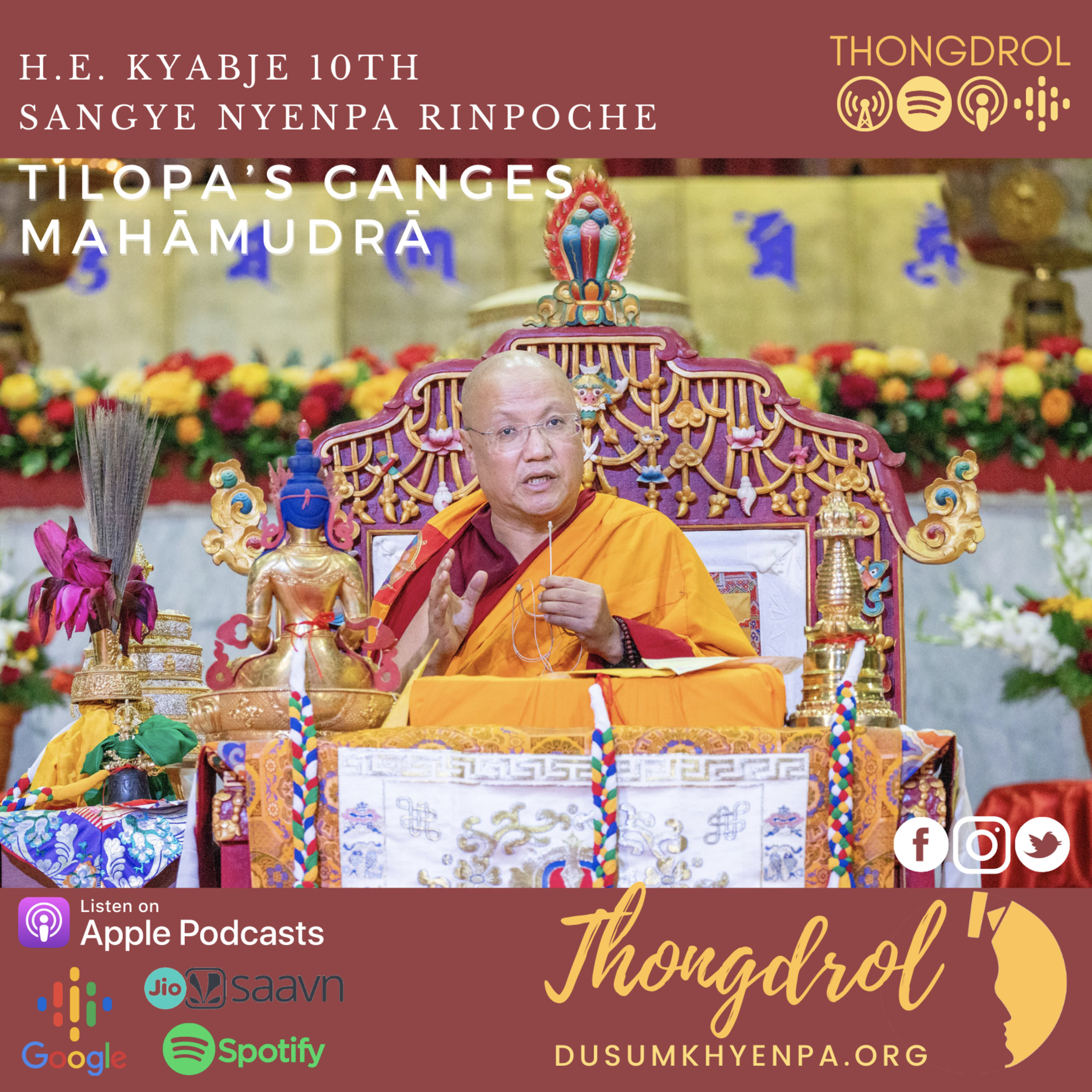
ThongdrolTilopa’s Ganges Mahāmudrā Ep 3 (TIBETAN) Sangye Nyenpa RinpocheHE Kyabje Drubwang Sangye Nyenpa Rinpoche began the second day of teachings on the The Ganges Mahāmudrā (Mahāmudrā Upadeśa) summarizing key aspects of the first afternoon session. Given their importance, he re-emphasized the four characteristics of the student who can be taught the profound instructions. These characteristics – enduring hardship, guru devotion, bearing suffering, and intelligent wisdom (prajña) – are key for any student who sincerely takes to heart that Mahāmudrā cannot be shown. Using the analogy of moonlight hidden by clouds, Rinpoche stressed that obscurations of thought also dissipate from th...
2020-11-1700 min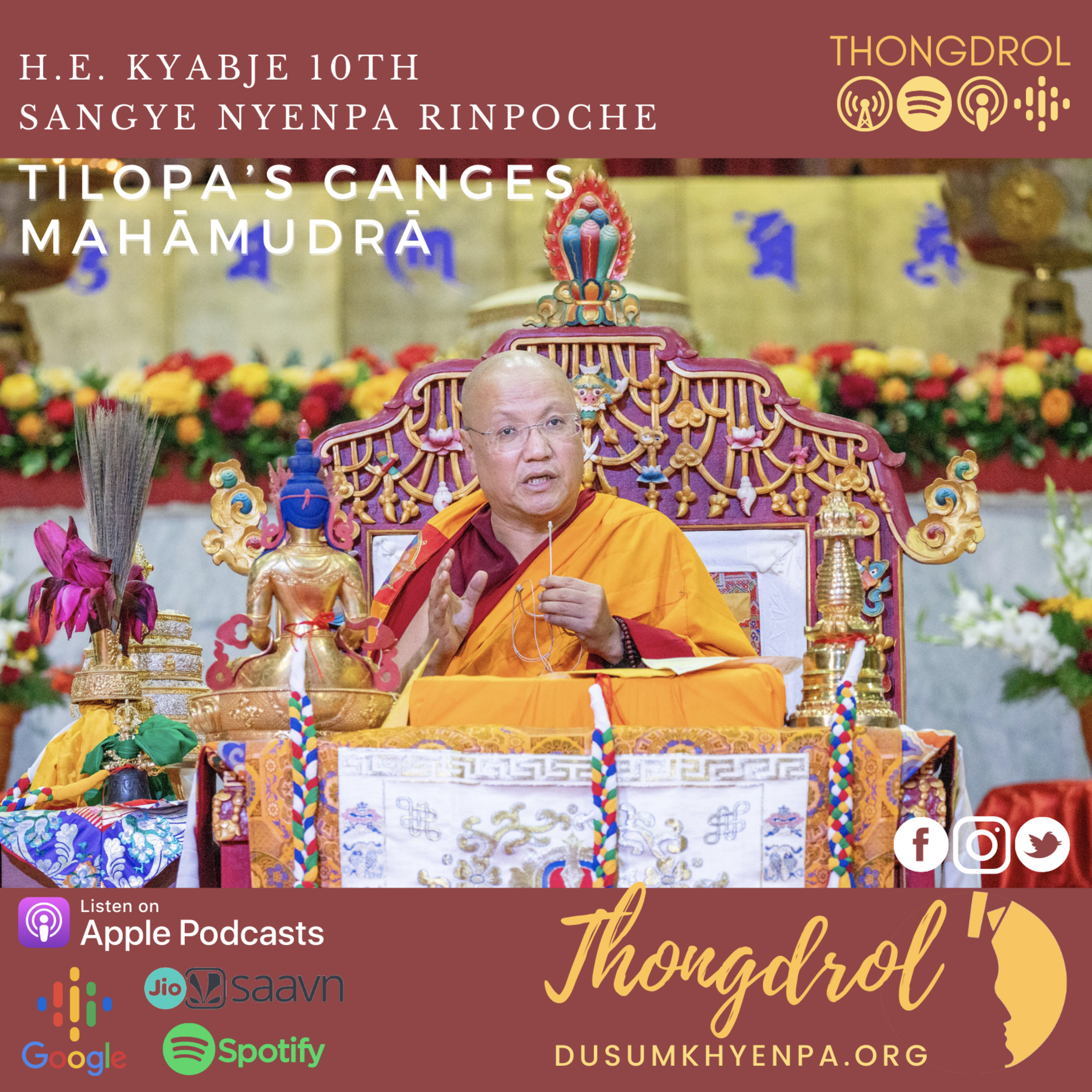
ThongdrolTilopa’s Ganges Mahāmudrā Ep 2 (TIBETAN) Sangye Nyenpa RinpocheThe first line of Tilopa’s teaching: "I prostrate to the glorious Vajra dakini". Vajra refers to method. Dakini is prajña. Dakini means sky goers, that is, emptiness, the base of all phenomena. It doesn’t refer to the female. Dakini is emptiness, Vajra is the means, unchanging and indestructible.
In these 2 words are included all of ground path and fruition. The Ganges Mahāmudrā teaches the way it is.
The first verse: The pledge to give the pith instruction
Intelligent Naropa, who endures hardship, Respects the guru and bears s...
2020-11-1600 min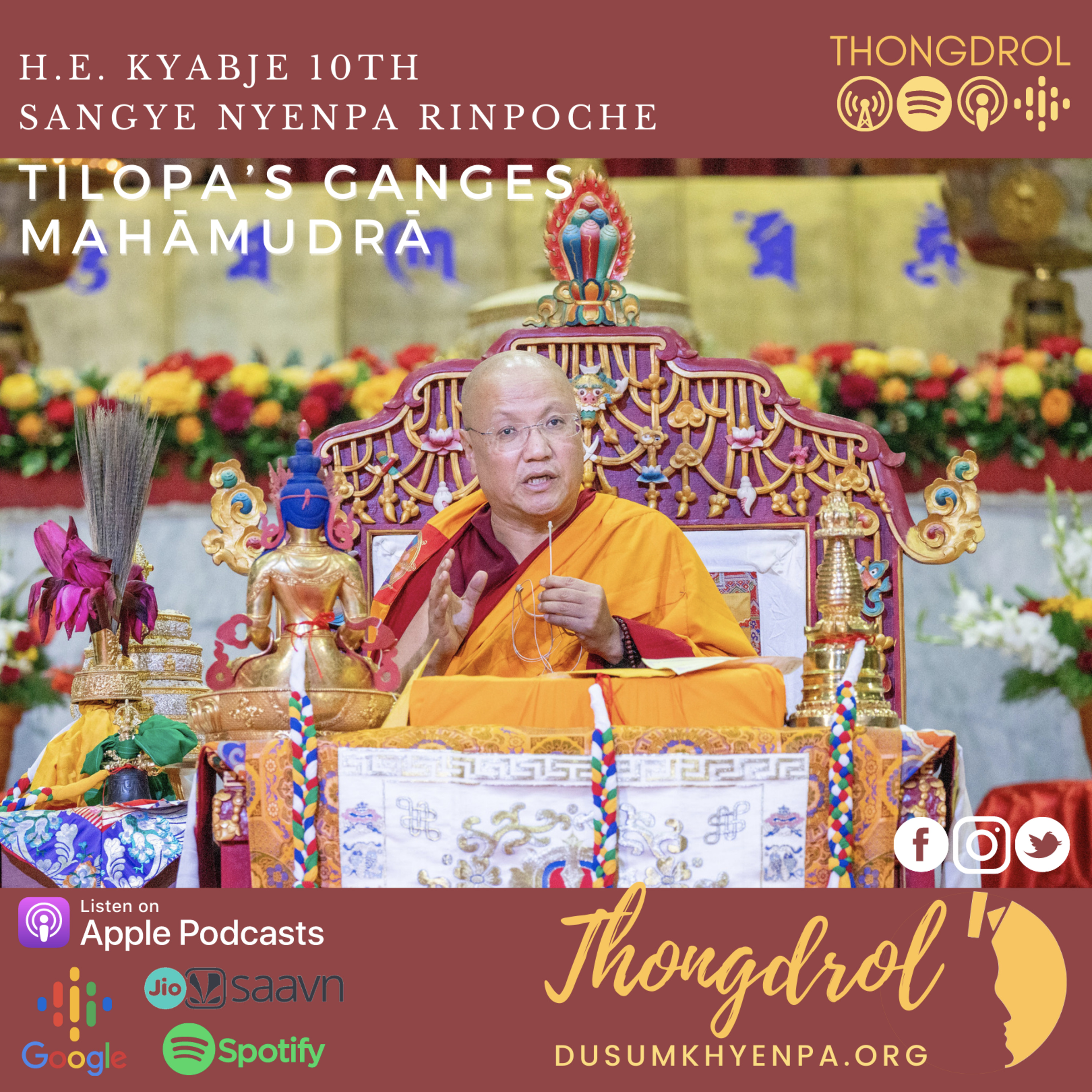
ThongdrolTilopa’s Ganges Mahāmudrā Ep 1 (TIBETAN) Sangye Nyenpa RinpocheI, Tilo, have nothing to show you. Mahāmudrā cannot be shown.
Over a thousand years ago on the banks of the river Ganges, the Mahasiddha Tilopa offered the pith instructions on Mahāmudrā to his heart son Naropa. Not only had Naropa been the greatest scholar at Nalanda university but he had endured 12 years of inconceivable hardship following every ‘crazy’ command of his guru. The pith instructions of 29 quintessential verses spoken on the essence of non- meditation, flowed spontaneously, like the Ganges, from the ultimate realization of the supremely enlightened master. It is said that after Naropa h...
2020-11-1600 min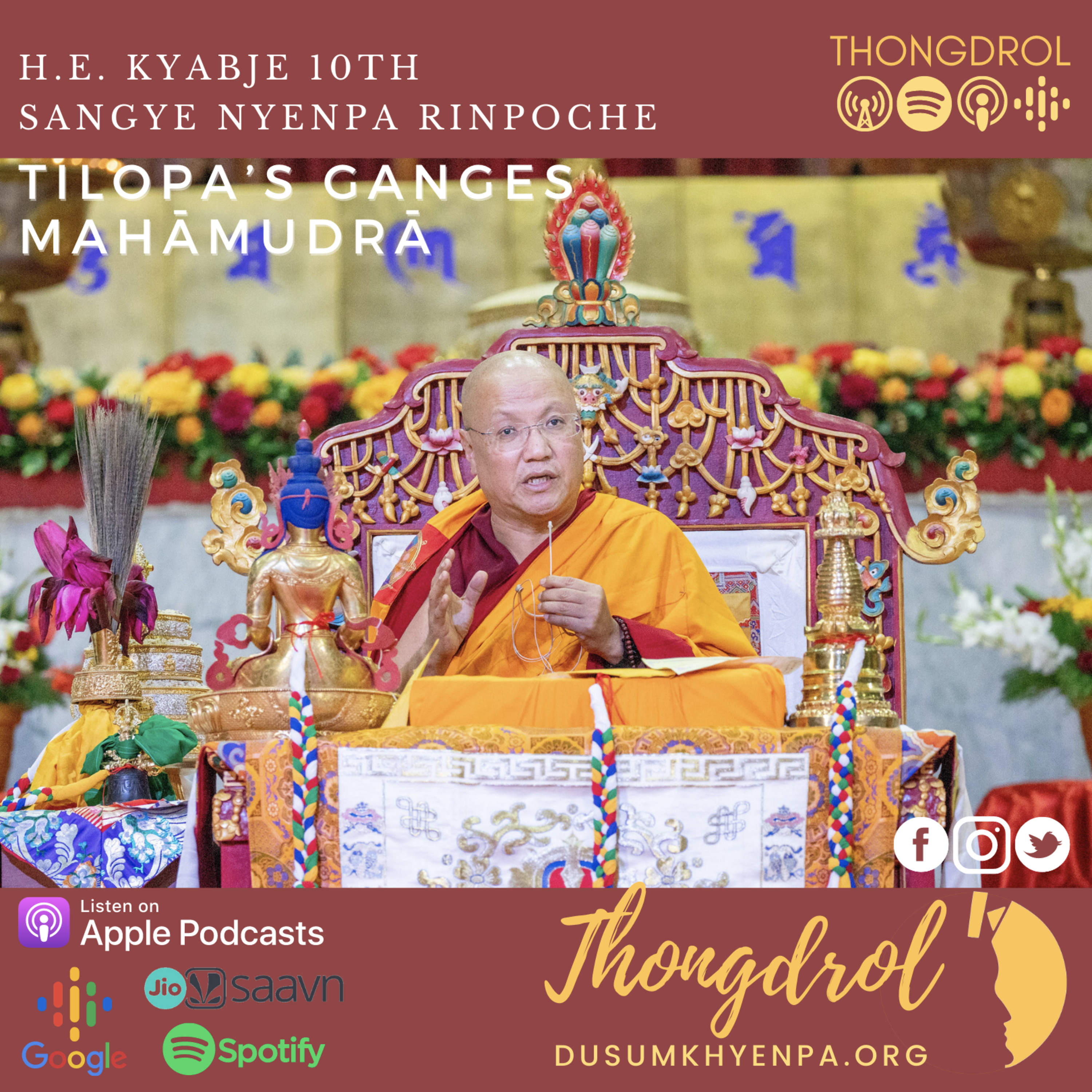
ThongdrolTilopa’s Ganges Mahāmudrā Ep 2 (ENGLISH) Sangye Nyenpa RinpocheThe first line of Tilopa’s teaching: "I prostrate to the glorious Vajra dakini". Vajra refers to method. Dakini is prajña. Dakini means sky goers, that is, emptiness, the base of all phenomena. It doesn’t refer to the female. Dakini is emptiness, Vajra is the means, unchanging and indestructible.
In these 2 words are included all of ground path and fruition. The Ganges Mahāmudrā teaches the way it is.
The first verse: The pledge to give the pith instruction
Intelligent Naropa, who endures hardship,
Respects the guru and bea...
2020-11-1600 min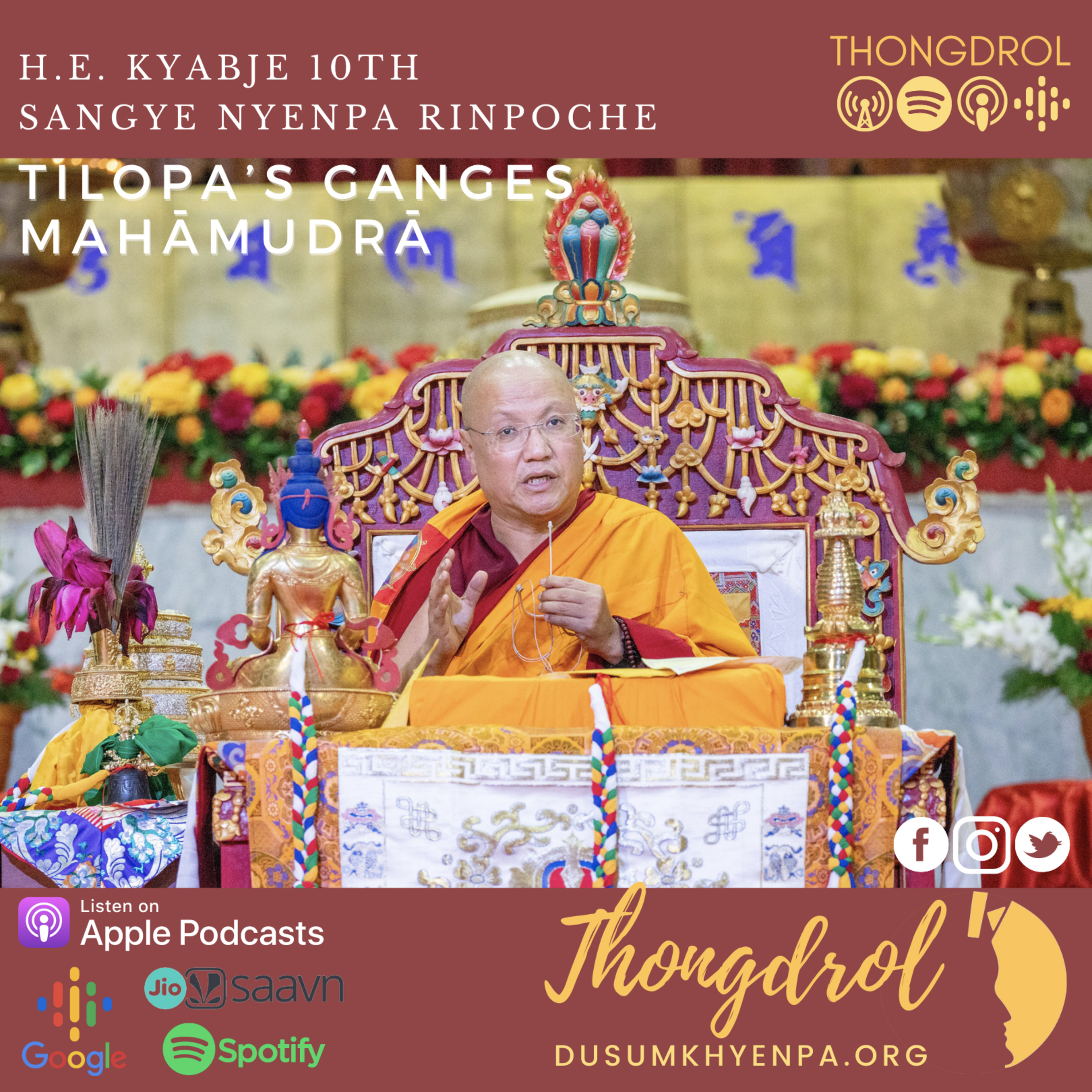
ThongdrolTilopa’s Ganges Mahāmudrā Ep 1 (ENGLISH) Sangye Nyenpa Rinpoche I, Tilo, have nothing to show you. Mahāmudrā cannot be shown.
Over a thousand years ago on the banks of the river Ganges, the Mahasiddha Tilopa offered the pith instructions on Mahāmudrā to his heart son Naropa. Not only had Naropa been the greatest scholar at Nalanda university but he had endured 12 years of inconceivable hardship following every ‘crazy’ command of his guru. The pith instructions of 29 quintessential verses spoken on the essence of non- meditation, flowed spontaneously, like the Ganges, from the ultimate realization of the supremely enlightened master. It is said...
2020-11-1600 min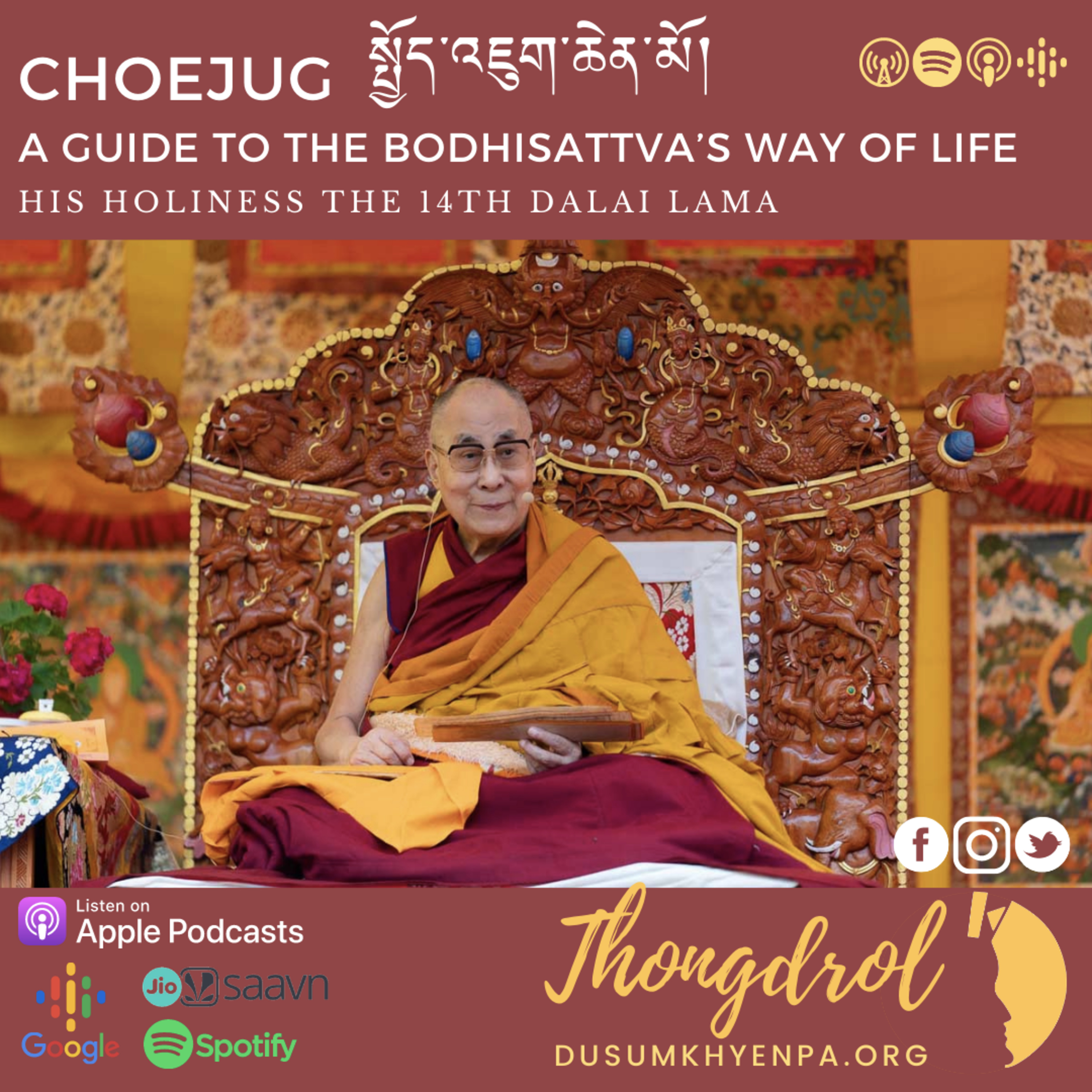
ThongdrolChoejug སྤྱོད་འཇུག་ཆེན་མོ། Ep 20 by His Holiness the 14th Dalai Lama 20The teaching is on Shantideva’s ‘A Guide to the Bodhisattva’s Way of Life’ (Tibetan: Choejug) by His Holiness the 14th Dalai Lama
The Bodhicharyavatara (The Guide) of the eighth-century Indian master Shantideva is one of the great works of Buddhist literature. It has been translated into Western languages at least a dozen times in this century and is already well-known to many students of Buddhism in its venerable translation by Stephen Batchelor, published by the Library of Tibetan Works and Archives as A Guide to the Bodhisattva’s Way of Life. Though Batchelor’s work will not soo...
2020-11-1200 min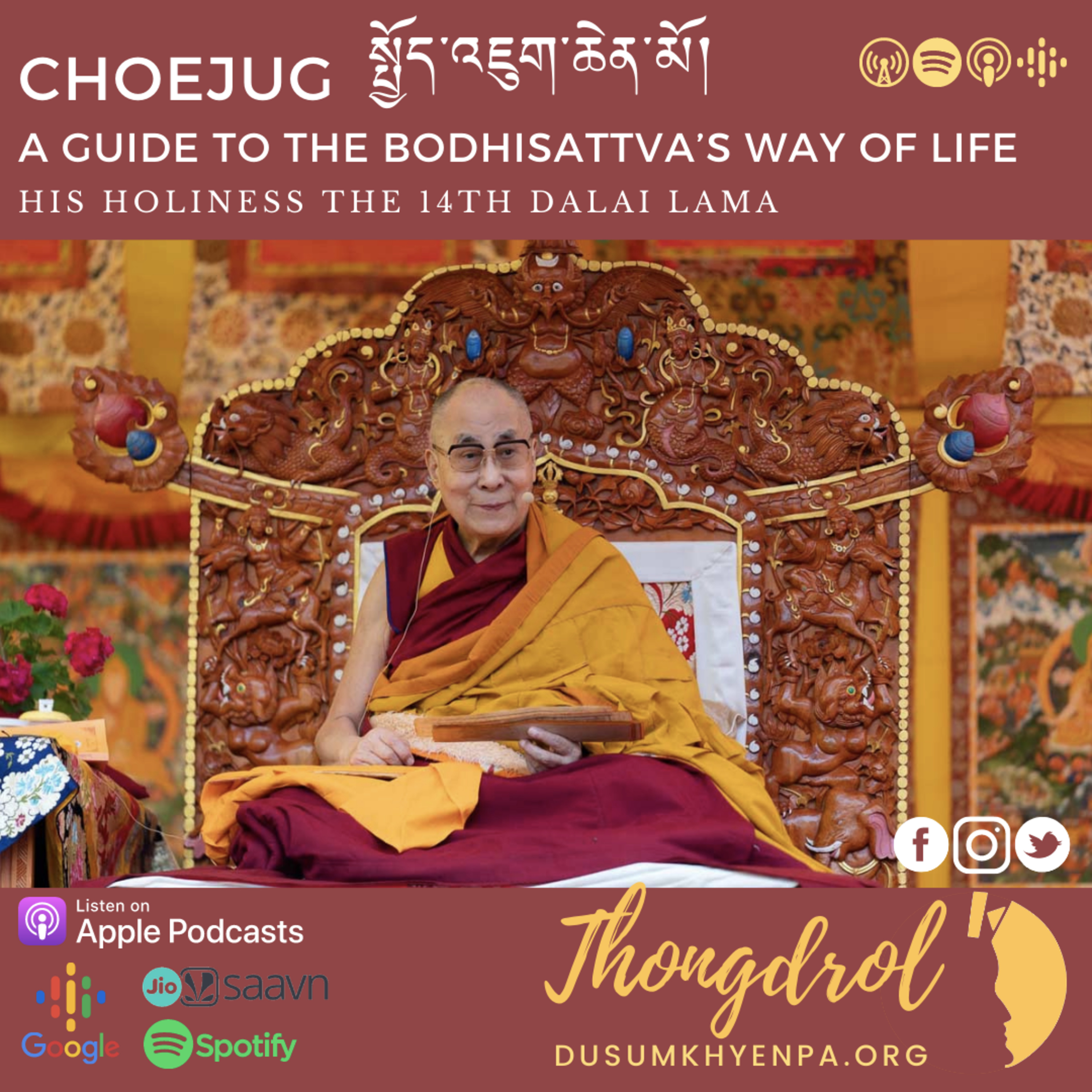
ThongdrolChoejug སྤྱོད་འཇུག་ཆེན་མོ། (ཆོས་ཀྱི་བདག་མེད་།) Ep 19 by His Holiness the 14th Dalai Lama 19The teaching is on Shantideva’s ‘A Guide to the Bodhisattva’s Way of Life’ (Tibetan: Choejug) by His Holiness the 14th Dalai Lama
The Bodhicharyavatara (The Guide) of the eighth-century Indian master Shantideva is one of the great works of Buddhist literature. It has been translated into Western languages at least a dozen times in this century and is already well-known to many students of Buddhism in its venerable translation by Stephen Batchelor, published by the Library of Tibetan Works and Archives as A Guide to the Bodhisattva’s Way of Life. Though Batchelor’s work will not soo...
2020-11-1200 min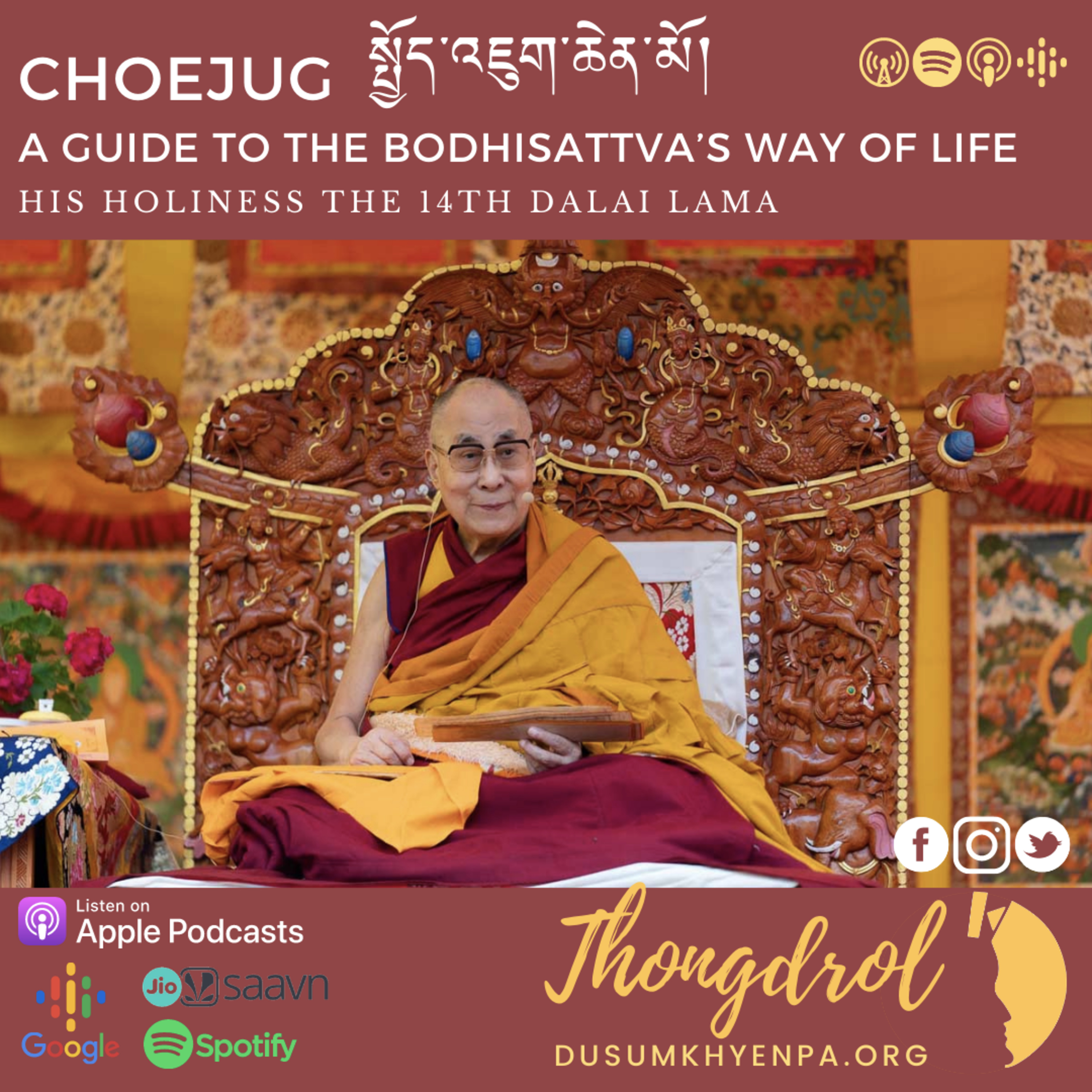
ThongdrolChoejug སྤྱོད་འཇུག་ཆེན་མོ། (སྟོང་ཉིད་དང་བདག་མེད།) Ep 18 by His Holiness the 14th Dalai Lama 18The teaching is on Shantideva’s ‘A Guide to the Bodhisattva’s Way of Life’ (Tibetan: Choejug) by His Holiness the 14th Dalai Lama
The Bodhicharyavatara (The Guide) of the eighth-century Indian master Shantideva is one of the great works of Buddhist literature. It has been translated into Western languages at least a dozen times in this century and is already well-known to many students of Buddhism in its venerable translation by Stephen Batchelor, published by the Library of Tibetan Works and Archives as A Guide to the Bodhisattva’s Way of Life. Though Batchelor’s work will not soo...
2020-11-1200 min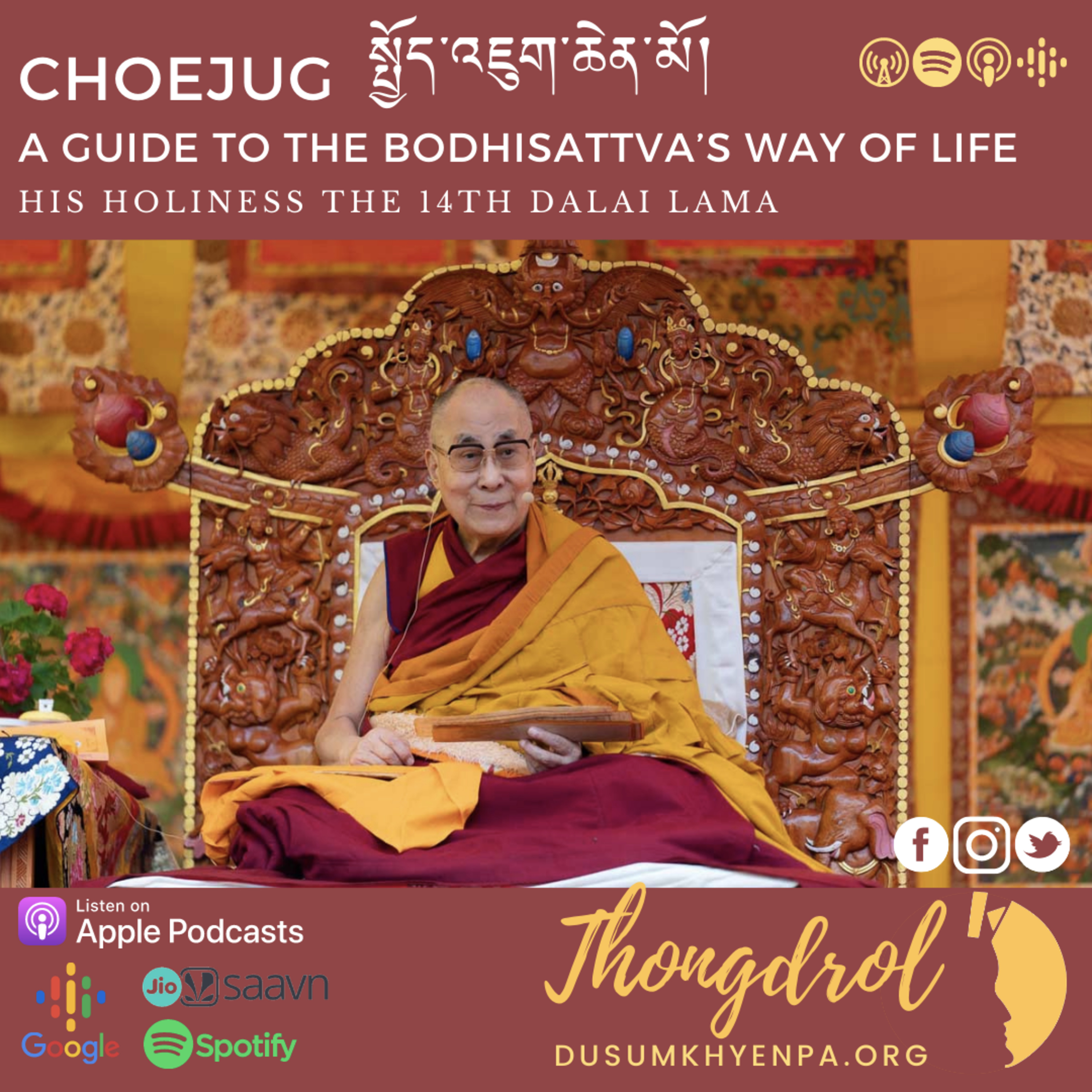
ThongdrolChoejug སྤྱོད་འཇུག་ཆེན་མོ། Ep 17 by His Holiness the 14th Dalai Lama 17The teaching is on Shantideva’s ‘A Guide to the Bodhisattva’s Way of Life’ (Tibetan: Choejug) by His Holiness the 14th Dalai Lama
The Bodhicharyavatara (The Guide) of the eighth-century Indian master Shantideva is one of the great works of Buddhist literature. It has been translated into Western languages at least a dozen times in this century and is already well-known to many students of Buddhism in its venerable translation by Stephen Batchelor, published by the Library of Tibetan Works and Archives as A Guide to the Bodhisattva’s Way of Life. Though Batchelor’s work will not soo...
2020-11-1200 min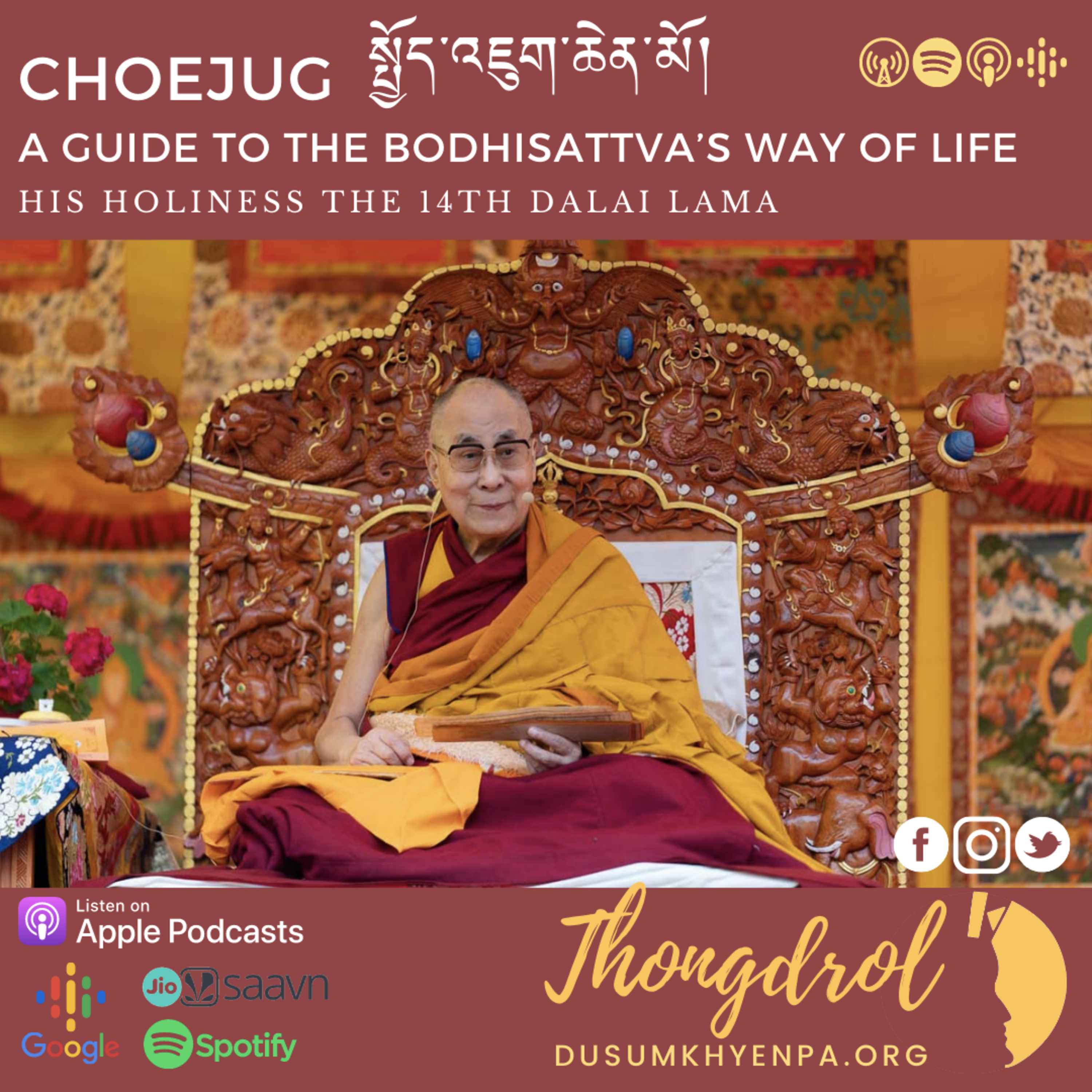
ThongdrolChoejug སྤྱོད་འཇུག་ཆེན་མོ། Ep 16 by His Holiness the 14th Dalai Lama 16The teaching is on Shantideva’s ‘A Guide to the Bodhisattva’s Way of Life’ (Tibetan: Choejug) by His Holiness the 14th Dalai Lama
The Bodhicharyavatara (The Guide) of the eighth-century Indian master Shantideva is one of the great works of Buddhist literature. It has been translated into Western languages at least a dozen times in this century and is already well-known to many students of Buddhism in its venerable translation by Stephen Batchelor, published by the Library of Tibetan Works and Archives as A Guide to the Bodhisattva’s Way of Life. Though Batchelor’s work will not soo...
2020-11-1200 min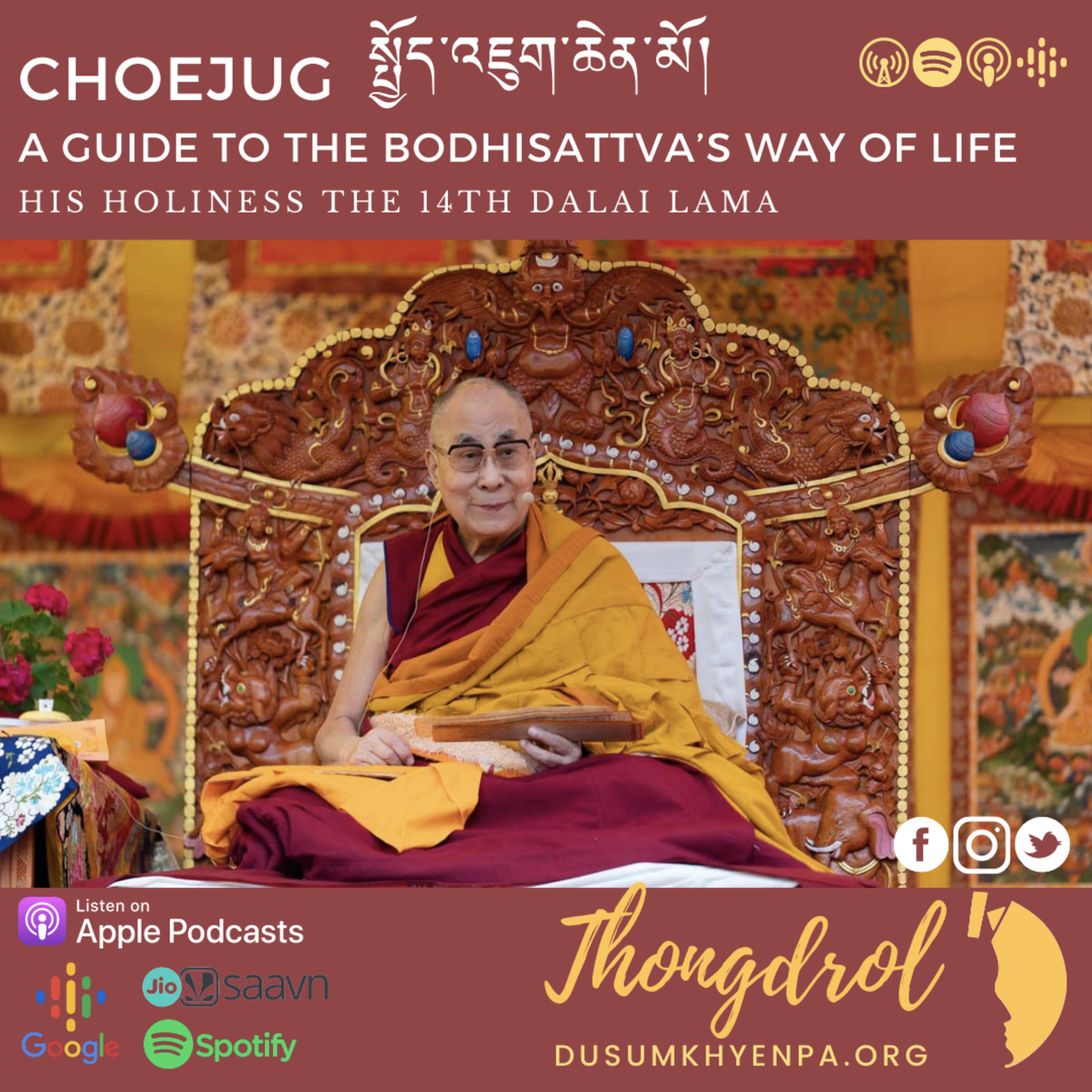
ThongdrolChoejug སྤྱོད་འཇུག་ཆེན་མོ། Ep 15 by His Holiness the 14th Dalai Lama 15The teaching is on Shantideva’s ‘A Guide to the Bodhisattva’s Way of Life’ (Tibetan: Choejug) by His Holiness the 14th Dalai Lama
The Bodhicharyavatara (The Guide) of the eighth-century Indian master Shantideva is one of the great works of Buddhist literature. It has been translated into Western languages at least a dozen times in this century and is already well-known to many students of Buddhism in its venerable translation by Stephen Batchelor, published by the Library of Tibetan Works and Archives as A Guide to the Bodhisattva’s Way of Life. Though Batchelor’s work will not soo...
2020-11-1200 min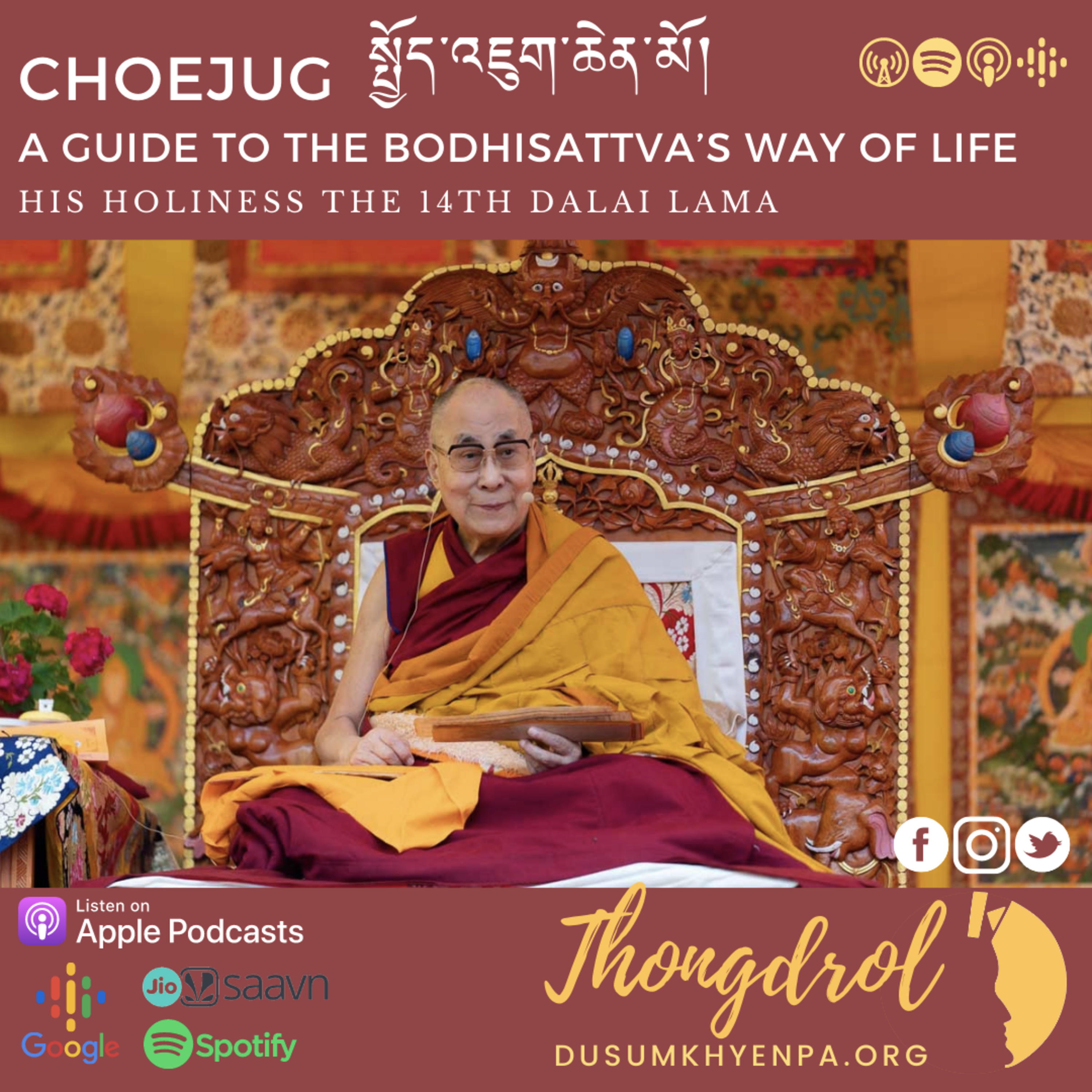
ThongdrolChoejug སྤྱོད་འཇུག་ཆེན་མོ། Ep 14 by His Holiness the 14th Dalai Lama 14The teaching is on Shantideva’s ‘A Guide to the Bodhisattva’s Way of Life’ (Tibetan: Choejug) by His Holiness the 14th Dalai Lama
The Bodhicharyavatara (The Guide) of the eighth-century Indian master Shantideva is one of the great works of Buddhist literature. It has been translated into Western languages at least a dozen times in this century and is already well-known to many students of Buddhism in its venerable translation by Stephen Batchelor, published by the Library of Tibetan Works and Archives as A Guide to the Bodhisattva’s Way of Life. Though Batchelor’s work will not soo...
2020-11-1200 min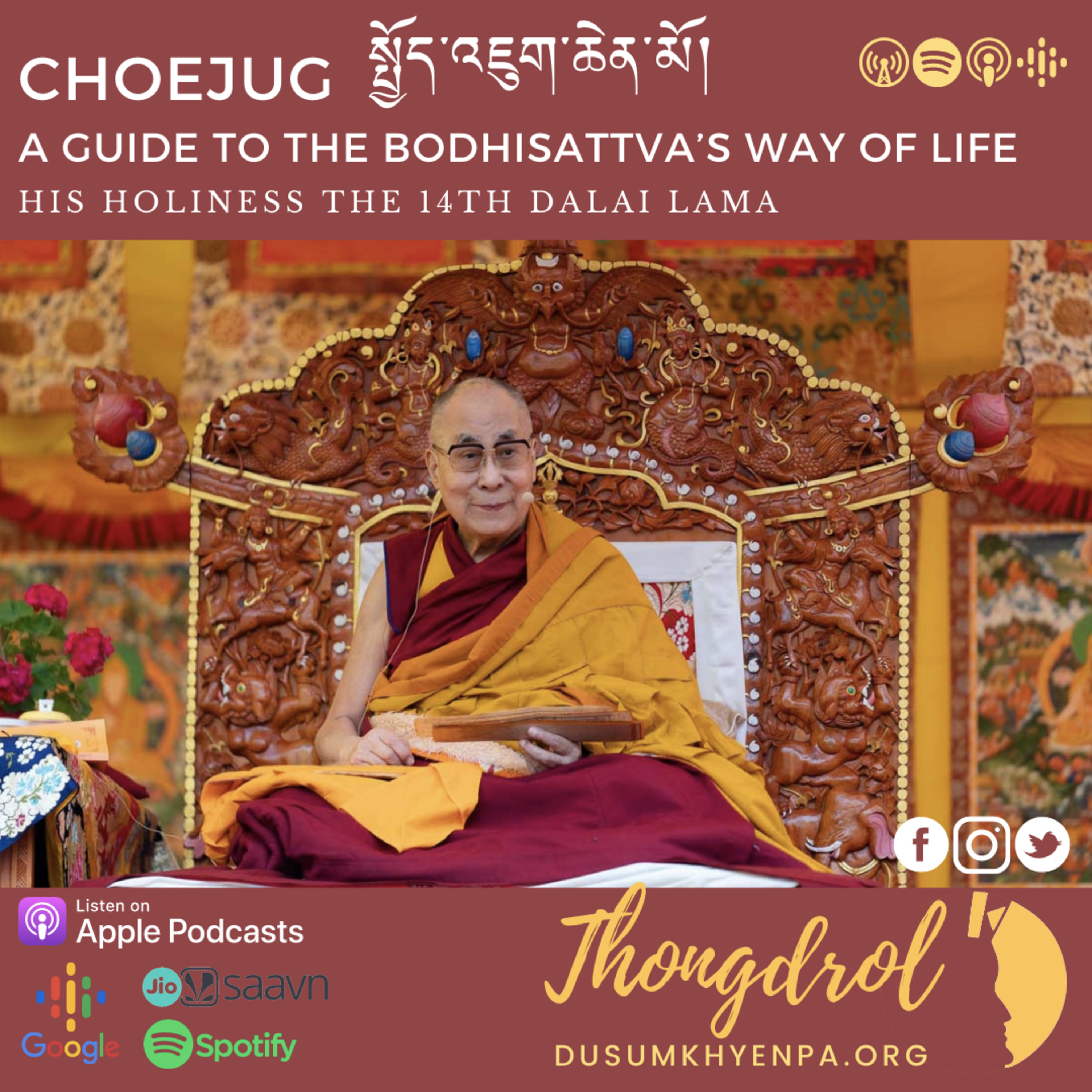
ThongdrolChoejug སྤྱོད་འཇུག་ཆེན་མོ། Ep 13 by His Holiness the 14th Dalai Lama 13The teaching is on Shantideva’s ‘A Guide to the Bodhisattva’s Way of Life’ (Tibetan: Choejug) by His Holiness the 14th Dalai Lama
The Bodhicharyavatara (The Guide) of the eighth-century Indian master Shantideva is one of the great works of Buddhist literature. It has been translated into Western languages at least a dozen times in this century and is already well-known to many students of Buddhism in its venerable translation by Stephen Batchelor, published by the Library of Tibetan Works and Archives as A Guide to the Bodhisattva’s Way of Life. Though Batchelor’s work will not soo...
2020-11-1200 min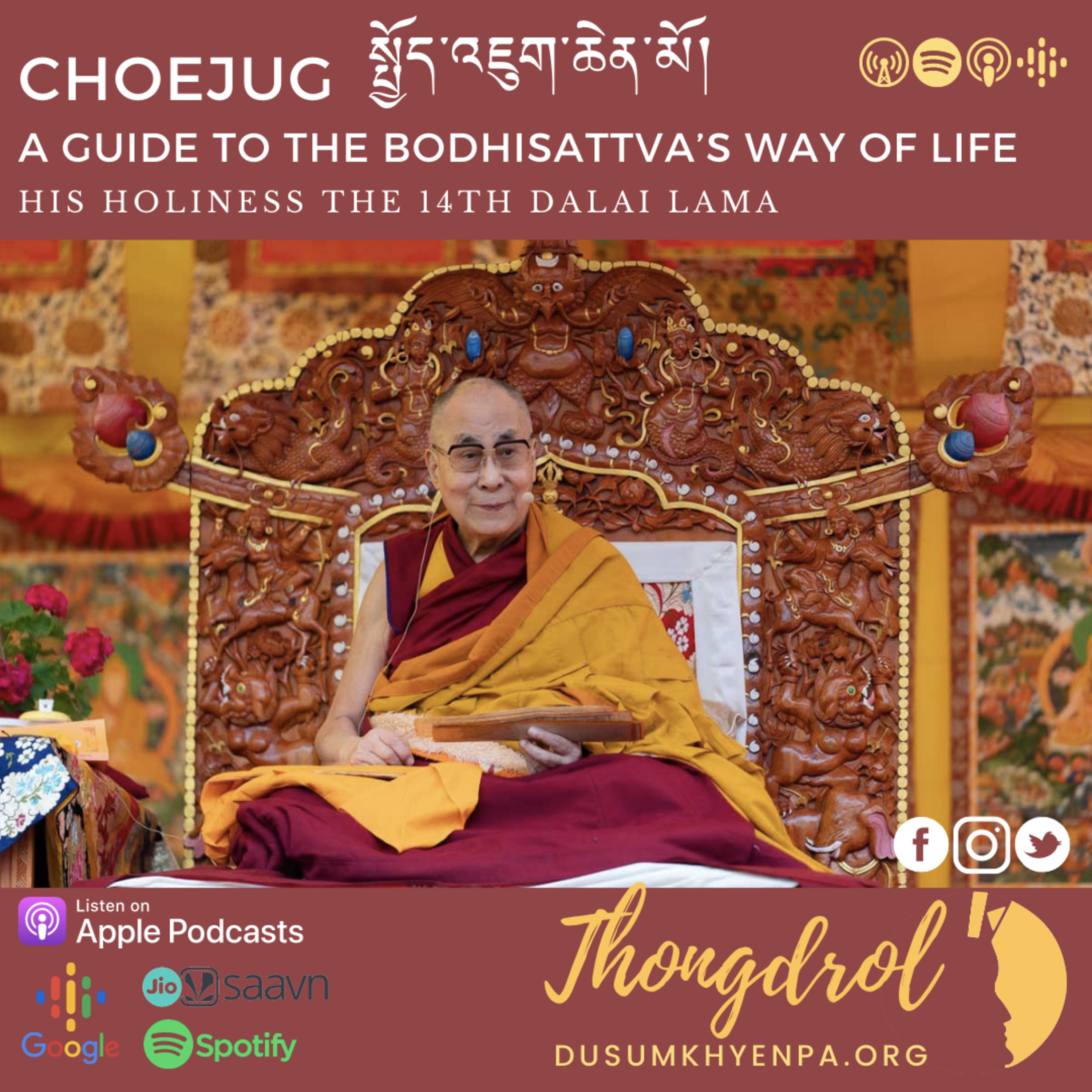
ThongdrolChoejug སྤྱོད་འཇུག་ཆེན་མོ། Ep 12 by His Holiness the 14th Dalai Lama 12The teaching is on Shantideva’s ‘A Guide to the Bodhisattva’s Way of Life’ (Tibetan: Choejug) by His Holiness the 14th Dalai Lama
The Bodhicharyavatara (The Guide) of the eighth-century Indian master Shantideva is one of the great works of Buddhist literature. It has been translated into Western languages at least a dozen times in this century and is already well-known to many students of Buddhism in its venerable translation by Stephen Batchelor, published by the Library of Tibetan Works and Archives as A Guide to the Bodhisattva’s Way of Life. Though Batchelor’s work will not soo...
2020-11-1200 min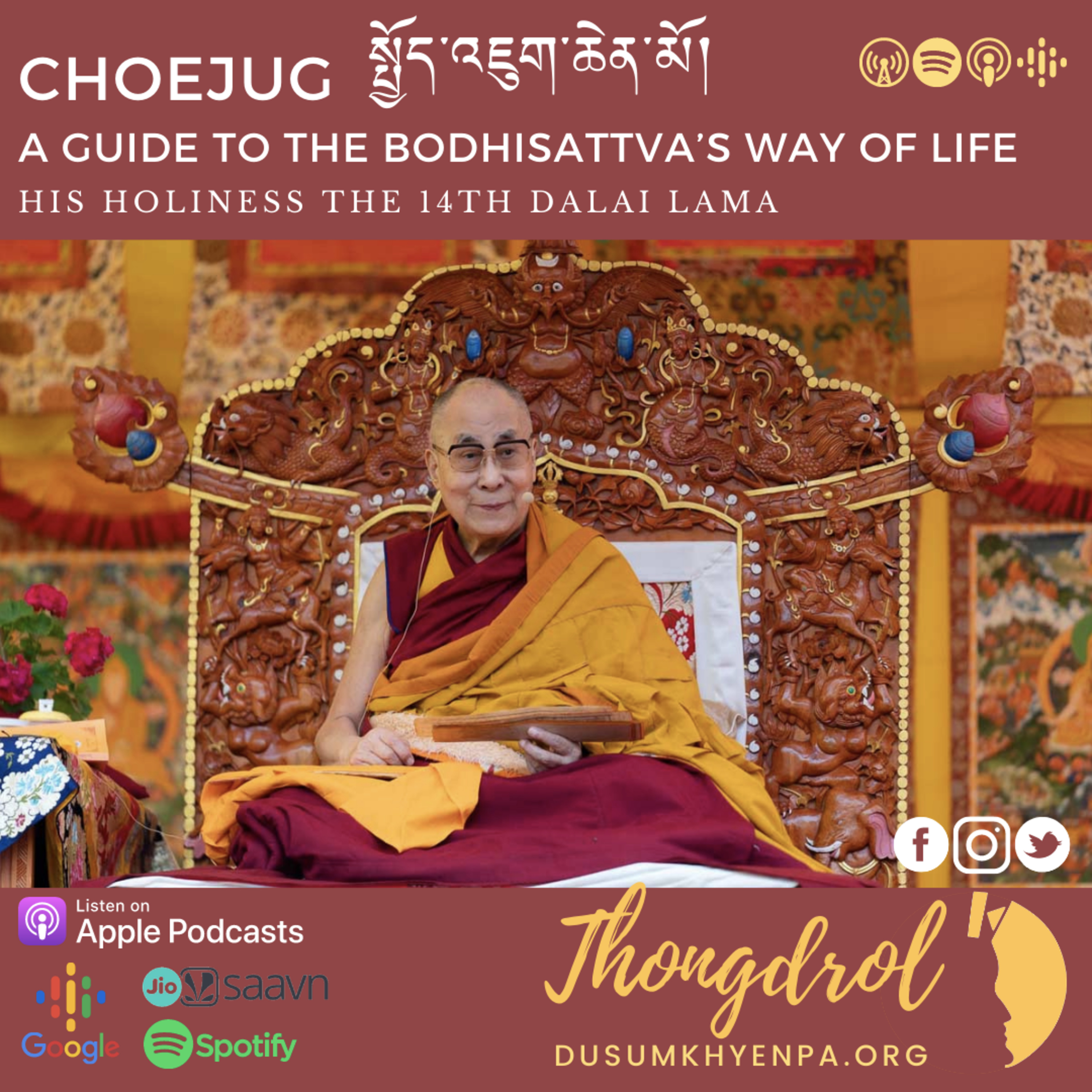
ThongdrolChoejug སྤྱོད་འཇུག་ཆེན་མོ། Ep 11 by His Holiness the 14th Dalai Lama 11The teaching is on Shantideva’s ‘A Guide to the Bodhisattva’s Way of Life’ (Tibetan: Choejug) by His Holiness the 14th Dalai Lama
The Bodhicharyavatara (The Guide) of the eighth-century Indian master Shantideva is one of the great works of Buddhist literature. It has been translated into Western languages at least a dozen times in this century and is already well-known to many students of Buddhism in its venerable translation by Stephen Batchelor, published by the Library of Tibetan Works and Archives as A Guide to the Bodhisattva’s Way of Life. Though Batchelor’s work will not soo...
2020-11-1200 min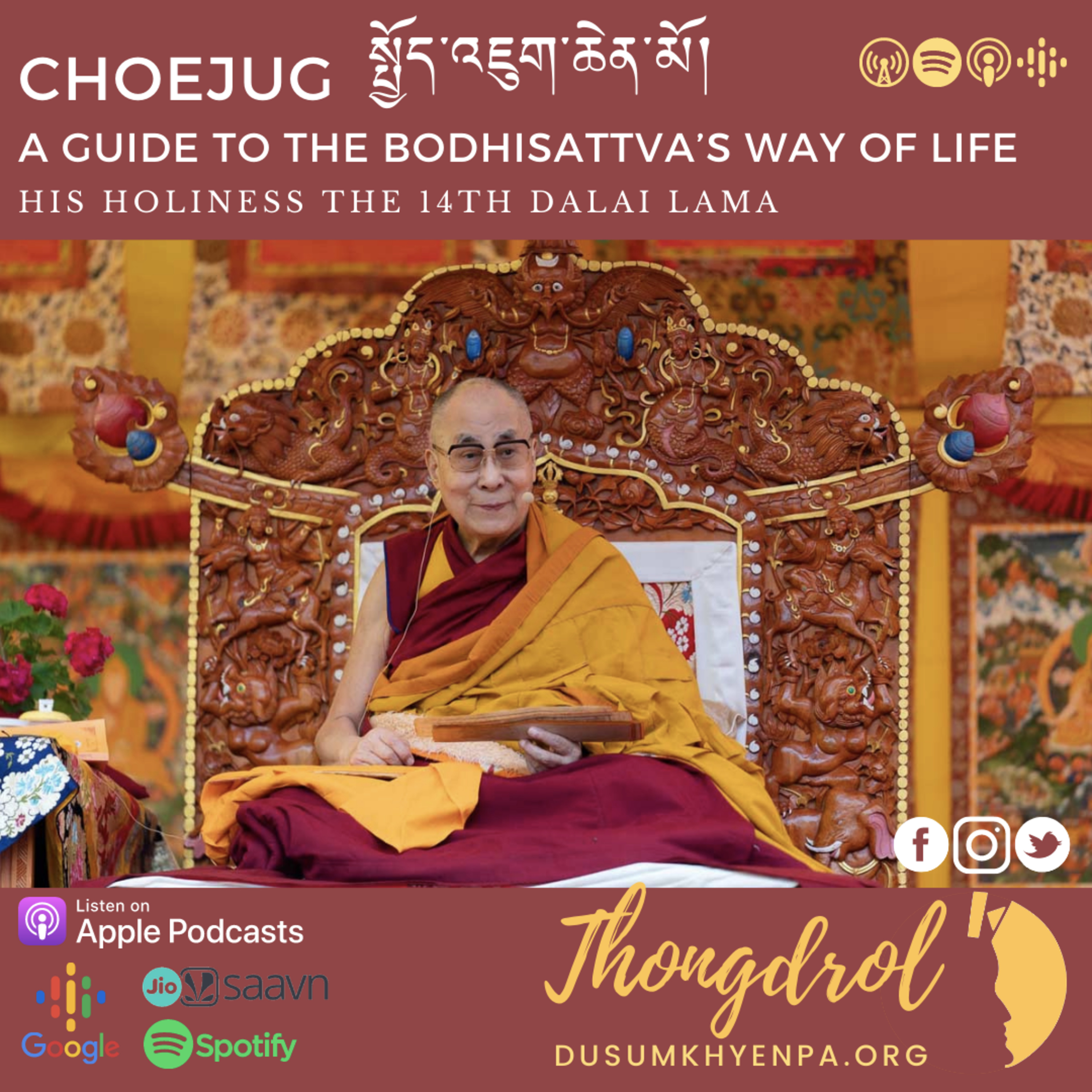
ThongdrolChoejug སྤྱོད་འཇུག་ཆེན་མོ། Ep 10 by His Holiness the 14th Dalai Lama 10The teaching is on Shantideva’s ‘A Guide to the Bodhisattva’s Way of Life’ (Tibetan: Choejug) by His Holiness the 14th Dalai Lama
The Bodhicharyavatara (The Guide) of the eighth-century Indian master Shantideva is one of the great works of Buddhist literature. It has been translated into Western languages at least a dozen times in this century and is already well-known to many students of Buddhism in its venerable translation by Stephen Batchelor, published by the Library of Tibetan Works and Archives as A Guide to the Bodhisattva’s Way of Life. Though Batchelor’s work will not soo...
2020-11-1200 min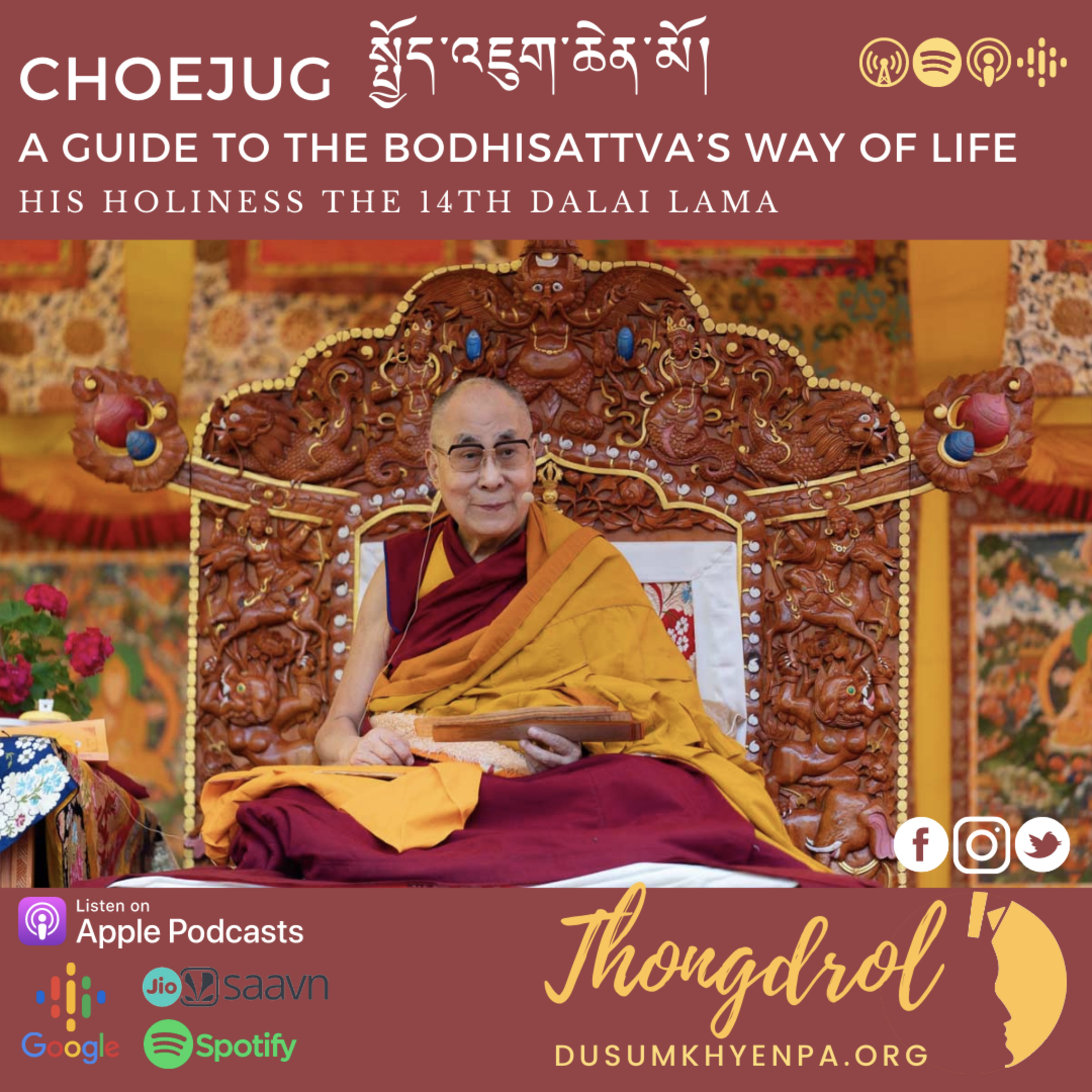
ThongdrolChoejug སྤྱོད་འཇུག་ཆེན་མོ། Ep 9 by His Holiness the 14th Dalai Lama 9The teaching is on Shantideva’s ‘A Guide to the Bodhisattva’s Way of Life’ (Tibetan: Choejug) by His Holiness the 14th Dalai Lama
The Bodhicharyavatara (The Guide) of the eighth-century Indian master Shantideva is one of the great works of Buddhist literature. It has been translated into Western languages at least a dozen times in this century and is already well-known to many students of Buddhism in its venerable translation by Stephen Batchelor, published by the Library of Tibetan Works and Archives as A Guide to the Bodhisattva’s Way of Life. Though Batchelor’s work will not soo...
2020-11-1200 min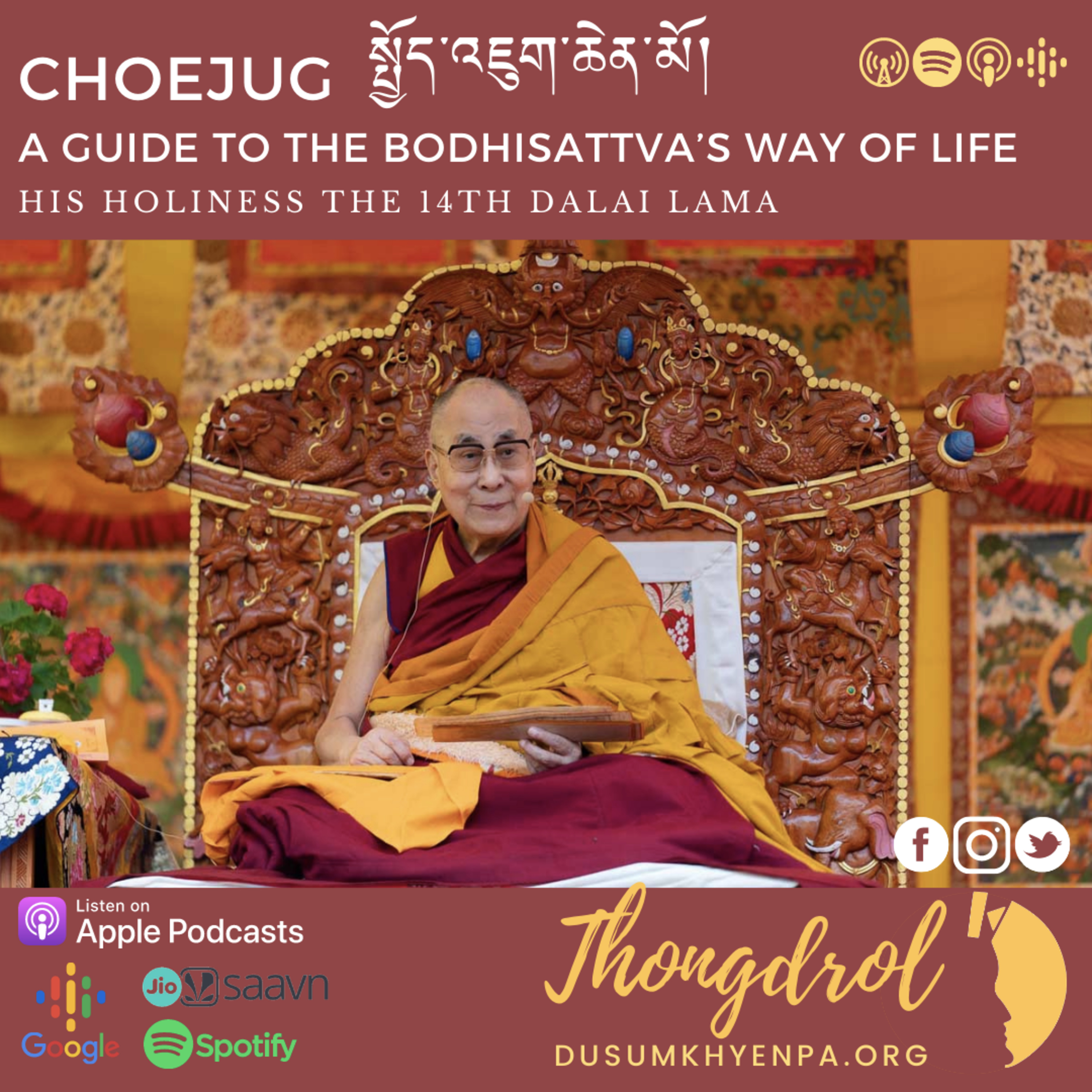
ThongdrolChoejug སྤྱོད་འཇུག་ཆེན་མོ། Ep 8 by His Holiness the 14th Dalai Lama 8The teaching is on Shantideva’s ‘A Guide to the Bodhisattva’s Way of Life’ (Tibetan: Choejug) by His Holiness the 14th Dalai Lama
The Bodhicharyavatara (The Guide) of the eighth-century Indian master Shantideva is one of the great works of Buddhist literature. It has been translated into Western languages at least a dozen times in this century and is already well-known to many students of Buddhism in its venerable translation by Stephen Batchelor, published by the Library of Tibetan Works and Archives as A Guide to the Bodhisattva’s Way of Life. Though Batchelor’s work will not soo...
2020-11-1200 min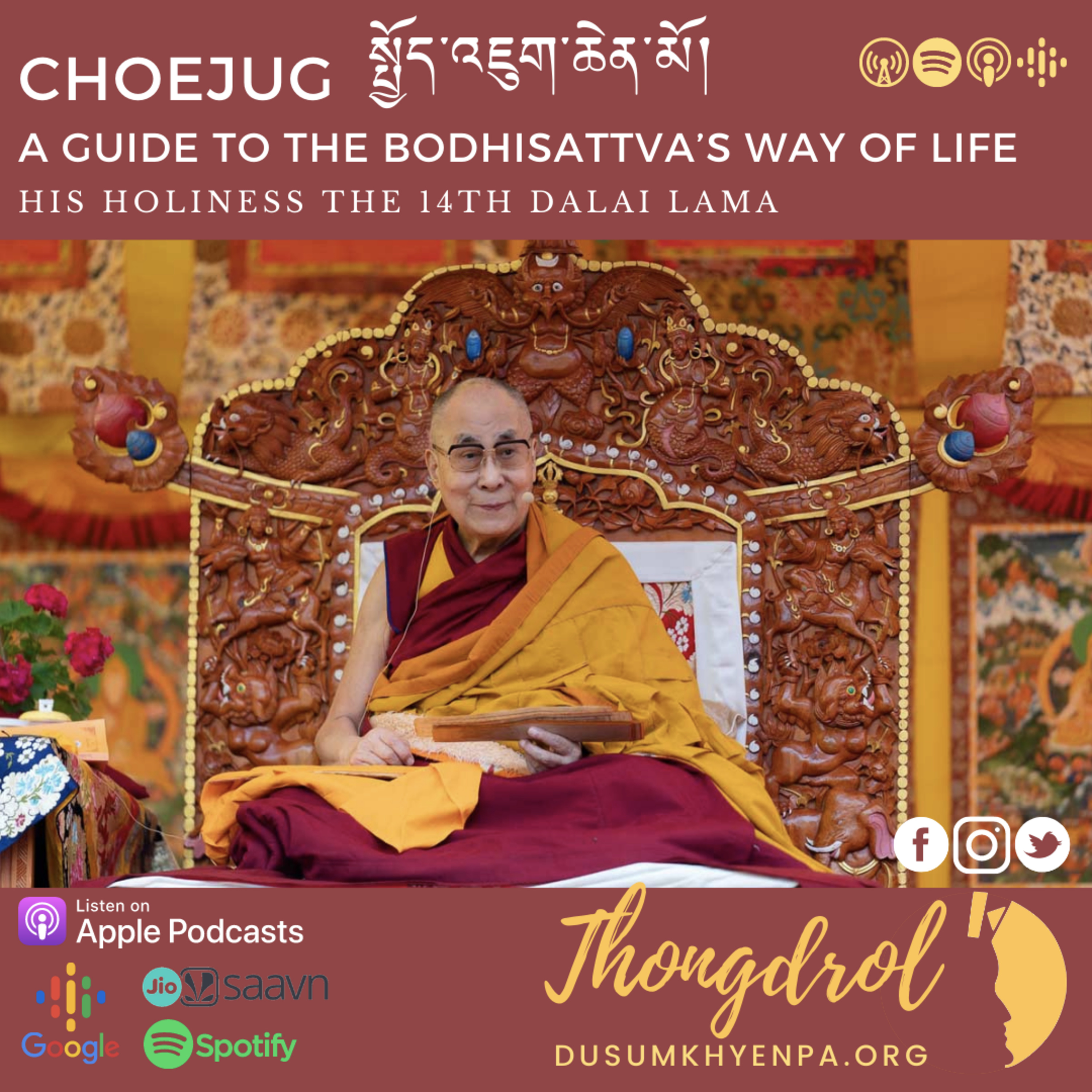
ThongdrolChoejug སྤྱོད་འཇུག་ཆེན་མོ། Ep 7 by His Holiness the 14th Dalai Lama 7The teaching is on Shantideva’s ‘A Guide to the Bodhisattva’s Way of Life’ (Tibetan: Choejug) by His Holiness the 14th Dalai Lama
The Bodhicharyavatara (The Guide) of the eighth-century Indian master Shantideva is one of the great works of Buddhist literature. It has been translated into Western languages at least a dozen times in this century and is already well-known to many students of Buddhism in its venerable translation by Stephen Batchelor, published by the Library of Tibetan Works and Archives as A Guide to the Bodhisattva’s Way of Life. Though Batchelor’s work will not soo...
2020-11-1200 min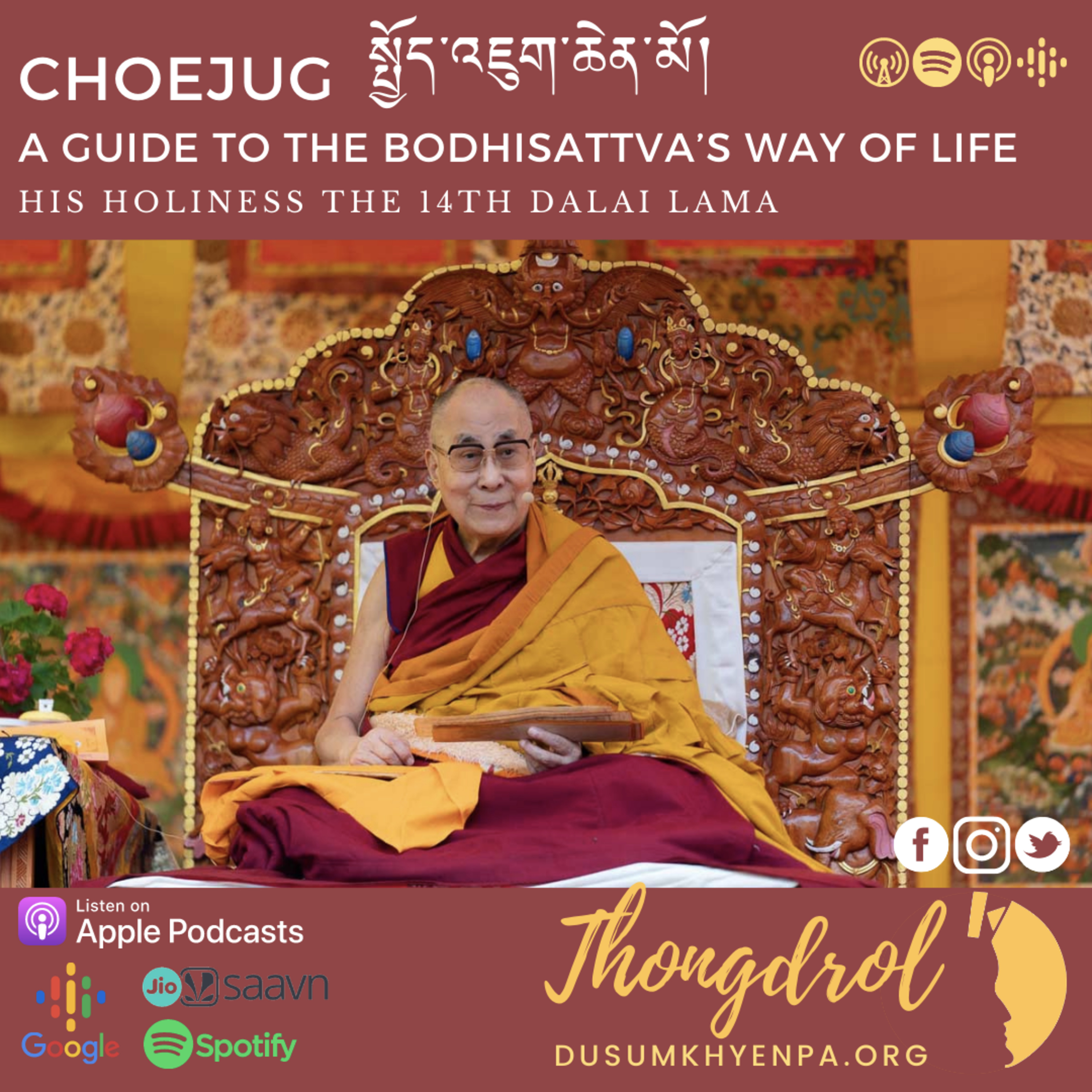
ThongdrolChoejug སྤྱོད་འཇུག་ཆེན་མོ། Ep 6 by His Holiness the 14th Dalai Lama 6The teaching is on Shantideva’s ‘A Guide to the Bodhisattva’s Way of Life’ (Tibetan: Choejug) by His Holiness the 14th Dalai Lama
The Bodhicharyavatara (The Guide) of the eighth-century Indian master Shantideva is one of the great works of Buddhist literature. It has been translated into Western languages at least a dozen times in this century and is already well-known to many students of Buddhism in its venerable translation by Stephen Batchelor, published by the Library of Tibetan Works and Archives as A Guide to the Bodhisattva’s Way of Life. Though Batchelor’s work will not soo...
2020-11-1200 min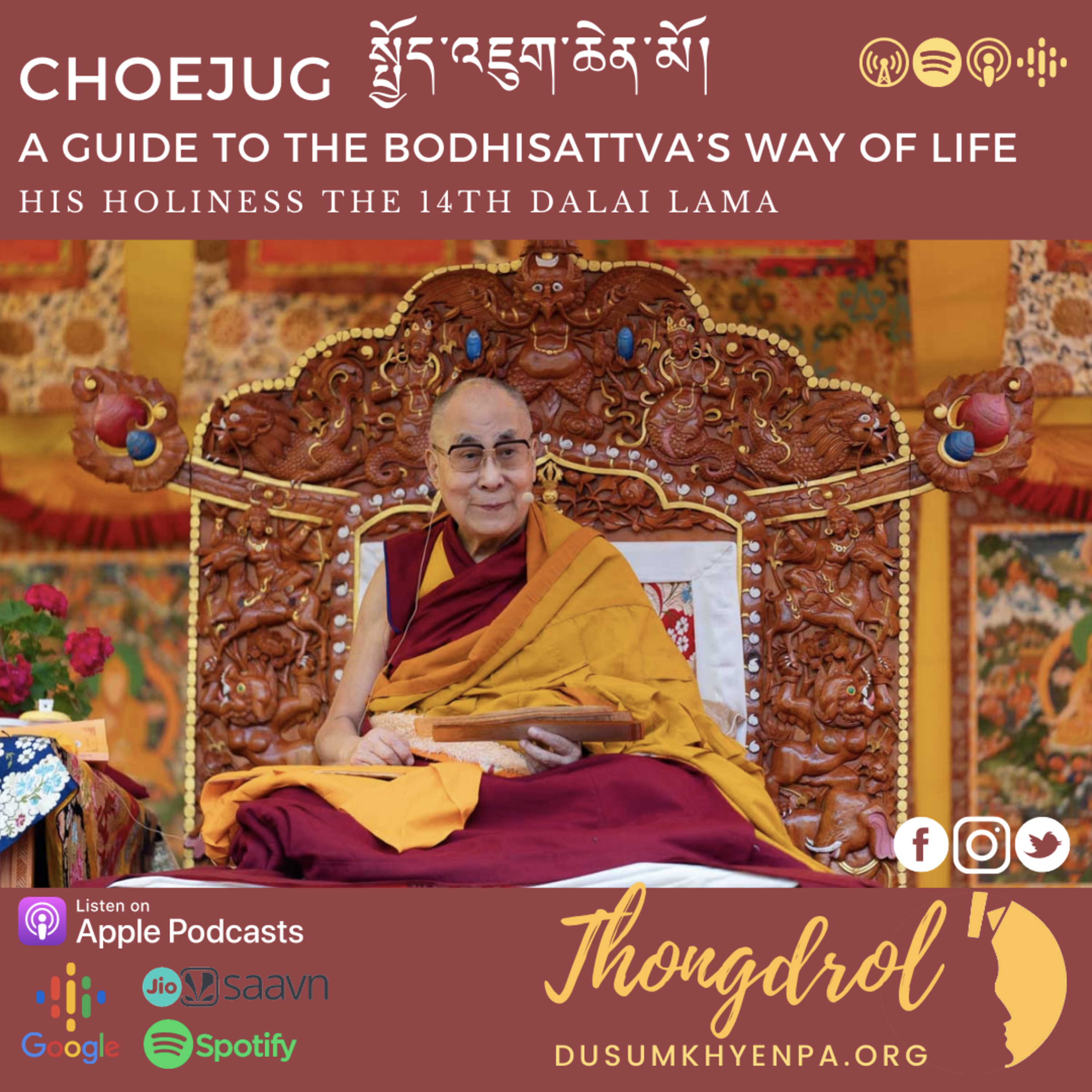
ThongdrolChoejug སྤྱོད་འཇུག་ཆེན་མོ། Ep 5 by His Holiness the 14th Dalai Lama 5The teaching is on Shantideva’s ‘A Guide to the Bodhisattva’s Way of Life’ (Tibetan: Choejug) by His Holiness the 14th Dalai Lama
The Bodhicharyavatara (The Guide) of the eighth-century Indian master Shantideva is one of the great works of Buddhist literature. It has been translated into Western languages at least a dozen times in this century and is already well-known to many students of Buddhism in its venerable translation by Stephen Batchelor, published by the Library of Tibetan Works and Archives as A Guide to the Bodhisattva’s Way of Life. Though Batchelor’s work will not soo...
2020-11-1200 min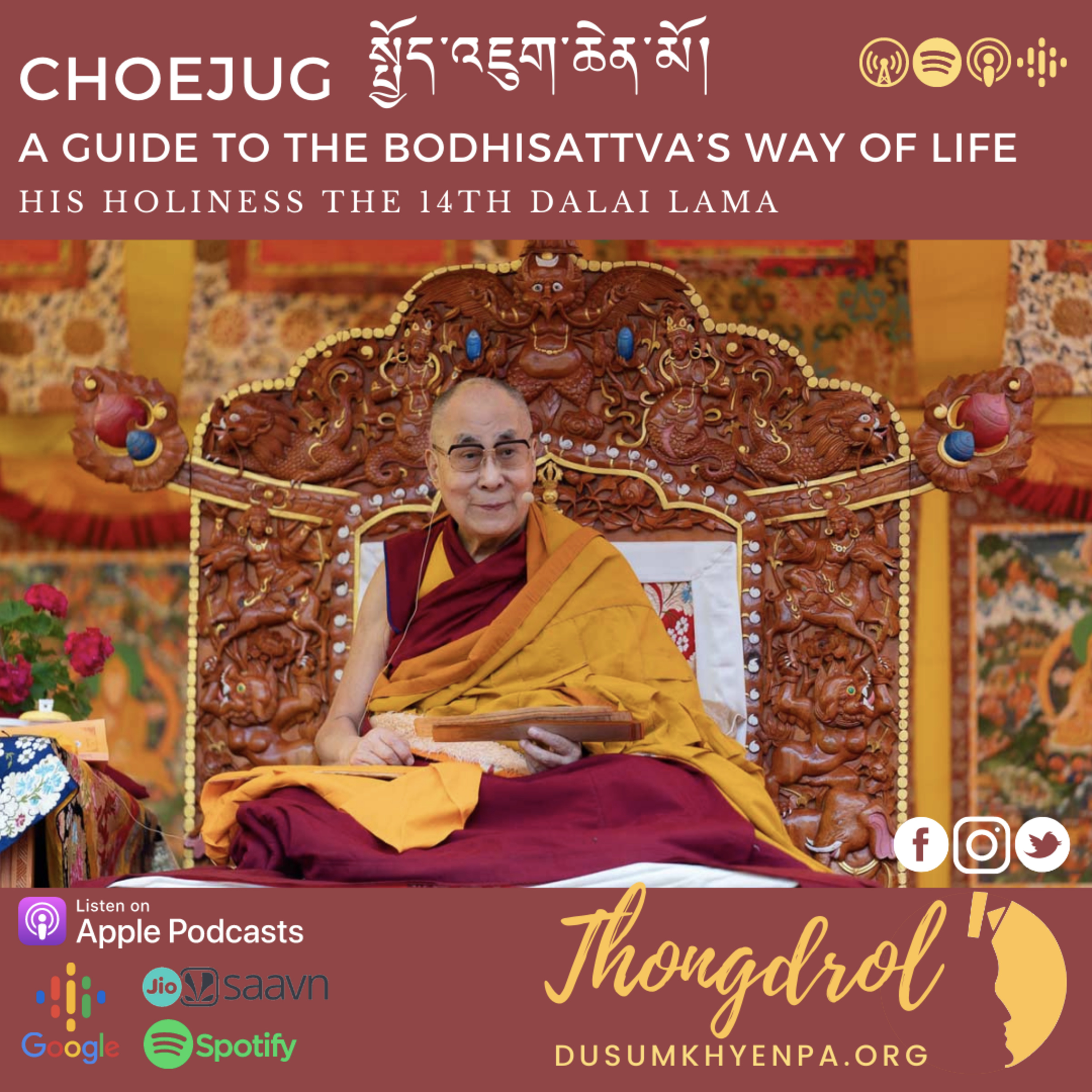
ThongdrolChoejug སྤྱོད་འཇུག་ཆེན་མོ། Ep 4 by His Holiness the 14th Dalai Lama 4The teaching is on Shantideva’s ‘A Guide to the Bodhisattva’s Way of Life’ (Tibetan: Choejug) by His Holiness the 14th Dalai Lama
The Bodhicharyavatara (The Guide) of the eighth-century Indian master Shantideva is one of the great works of Buddhist literature. It has been translated into Western languages at least a dozen times in this century and is already well-known to many students of Buddhism in its venerable translation by Stephen Batchelor, published by the Library of Tibetan Works and Archives as A Guide to the Bodhisattva’s Way of Life. Though Batchelor’s work will not soo...
2020-11-1200 min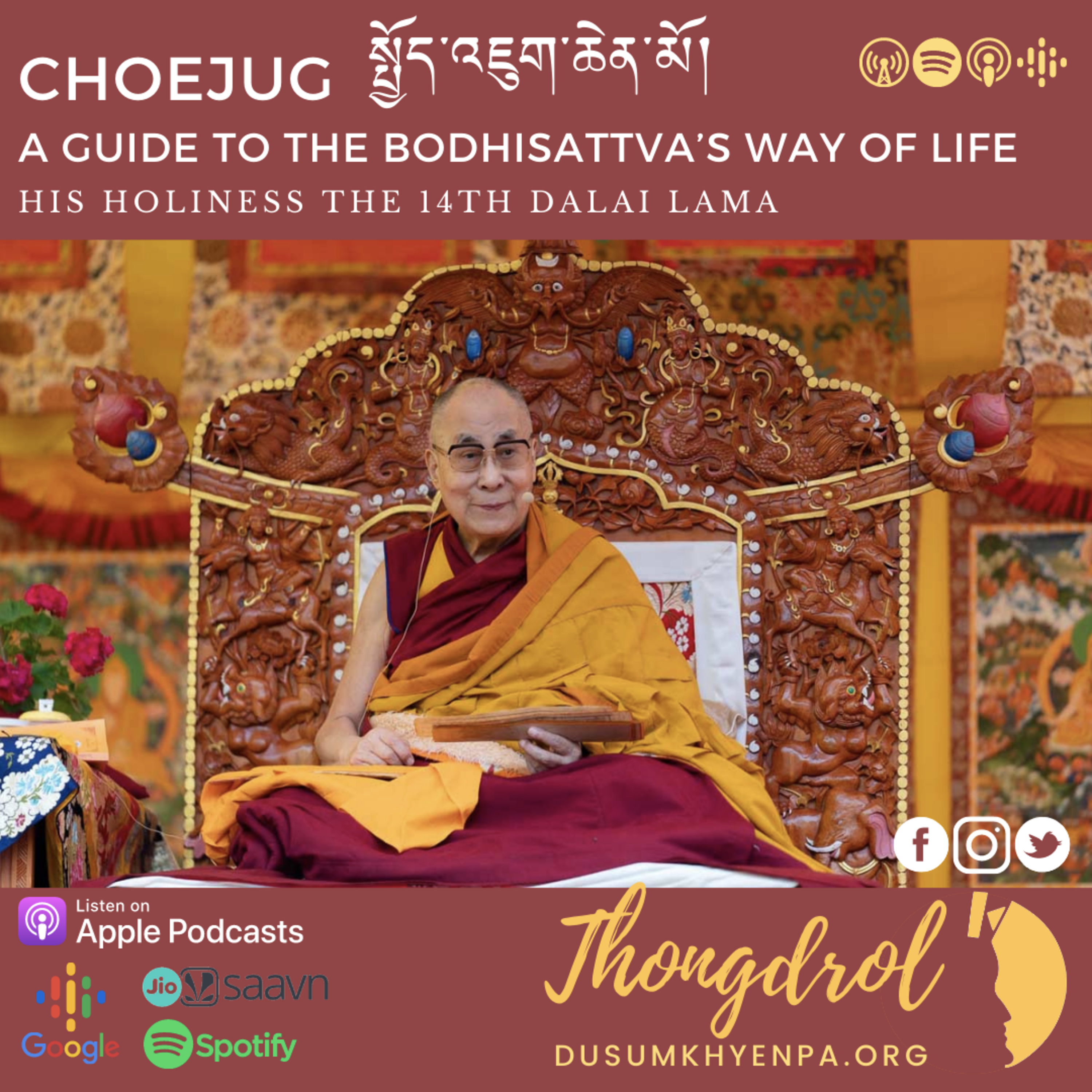
ThongdrolChoejug སྤྱོད་འཇུག་ཆེན་མོ། Ep 3 by His Holiness the 14th Dalai Lama 3The teaching is on Shantideva’s ‘A Guide to the Bodhisattva’s Way of Life’ (Tibetan: Choejug) by His Holiness the 14th Dalai Lama
The Bodhicharyavatara (The Guide) of the eighth-century Indian master Shantideva is one of the great works of Buddhist literature. It has been translated into Western languages at least a dozen times in this century and is already well-known to many students of Buddhism in its venerable translation by Stephen Batchelor, published by the Library of Tibetan Works and Archives as A Guide to the Bodhisattva’s Way of Life. Though Batchelor’s work will not soo...
2020-11-1200 min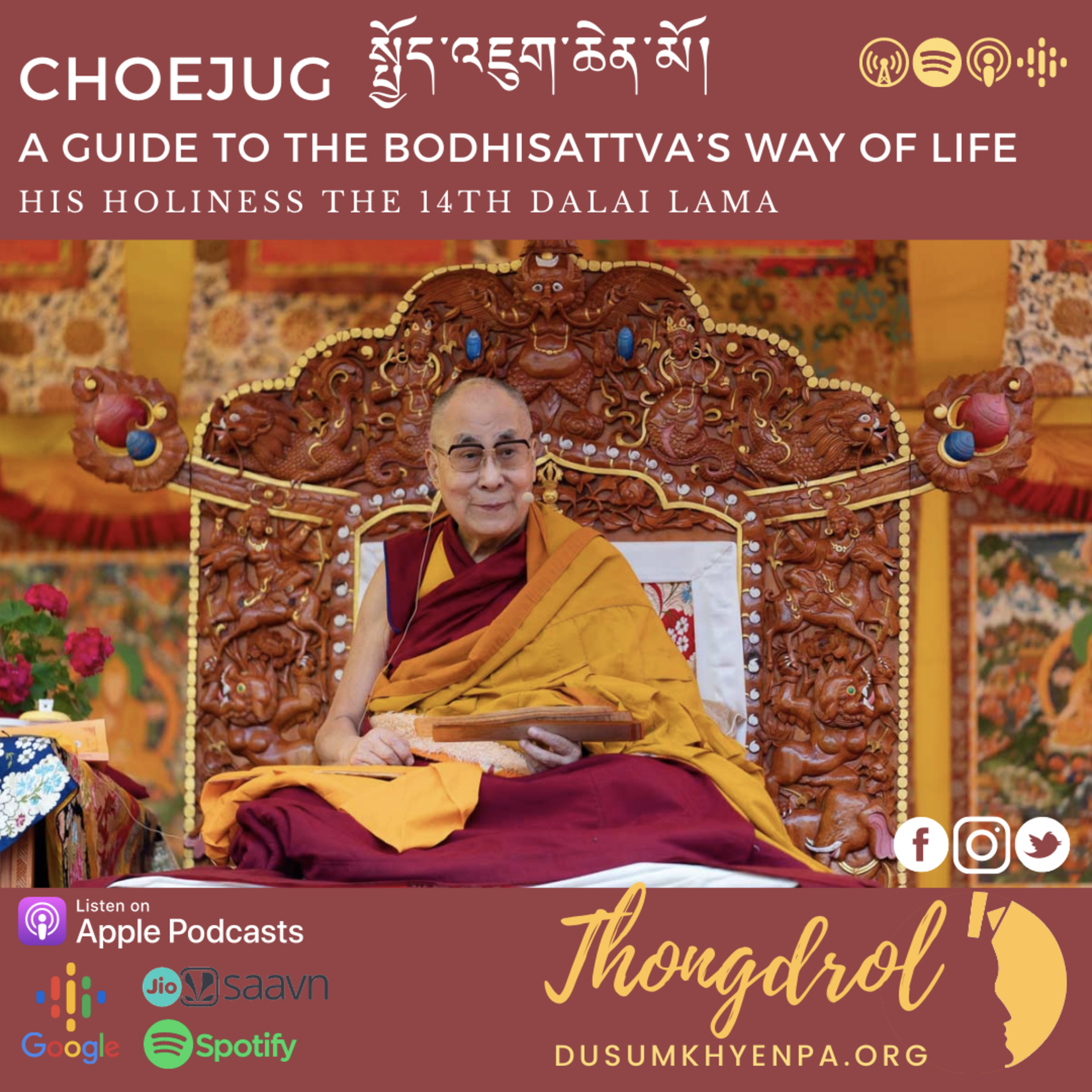
ThongdrolChoejug སྤྱོད་འཇུག་ཆེན་མོ། Ep 2 by His Holiness the 14th Dalai Lama 2The teaching is on Shantideva’s ‘A Guide to the Bodhisattva’s Way of Life’ (Tibetan: Choejug) by His Holiness the 14th Dalai Lama
The Bodhicharyavatara (The Guide) of the eighth-century Indian master Shantideva is one of the great works of Buddhist literature. It has been translated into Western languages at least a dozen times in this century and is already well-known to many students of Buddhism in its venerable translation by Stephen Batchelor, published by the Library of Tibetan Works and Archives as A Guide to the Bodhisattva’s Way of Life. Though Batchelor’s work will not soo...
2020-11-1200 min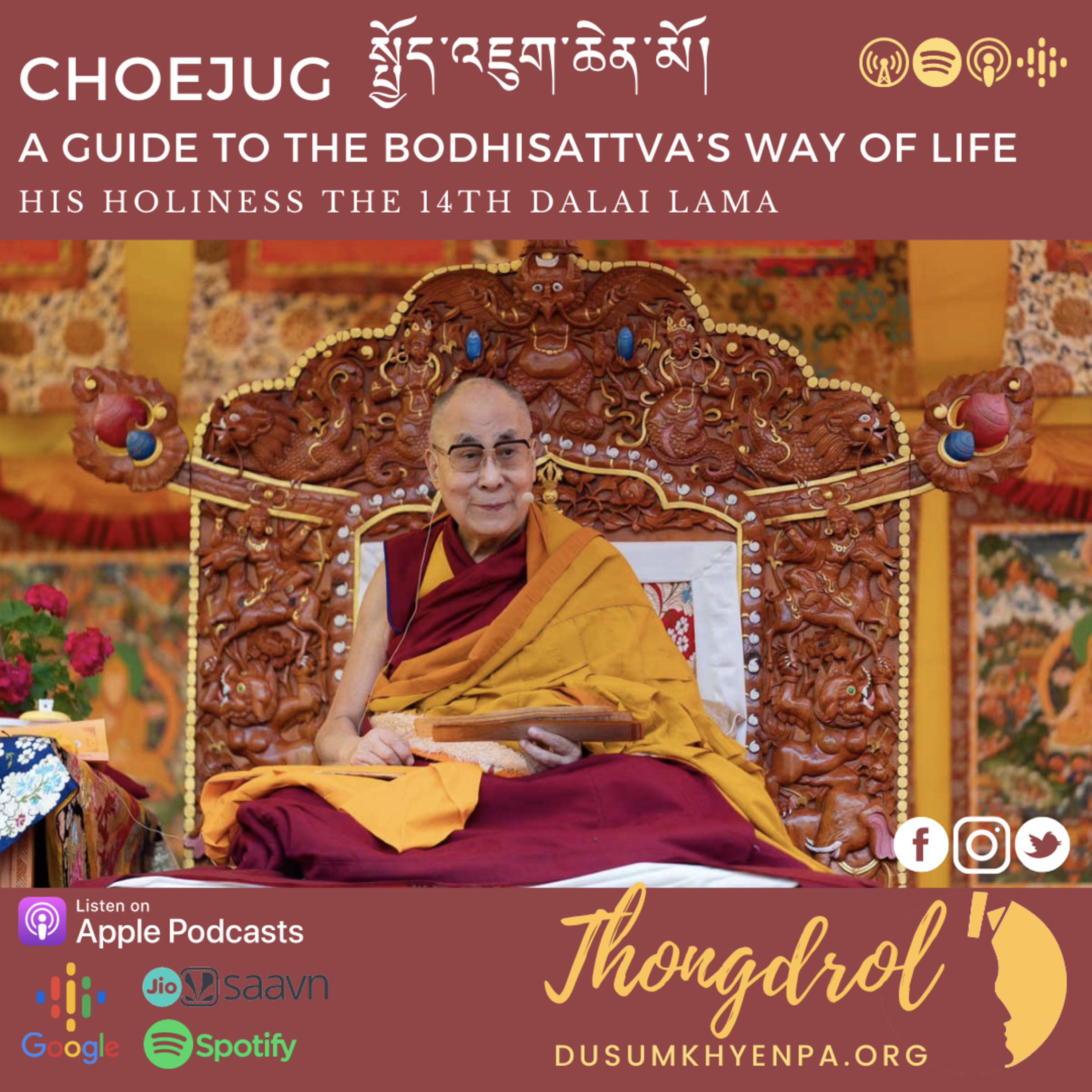
ThongdrolChoejug སྤྱོད་འཇུག་ཆེན་མོ། Ep 1 by His Holiness the 14th Dalai Lama 1Choejug སྤྱོད་འཇུག་ཆེན་མོ། Ep 1 by His Holiness the 14th Dalai Lama
The teaching is on Shantideva’s ‘A Guide to the Bodhisattva’s Way of Life’ (Tibetan: Choejug) by His Holiness the 14th Dalai Lama
The Bodhicharyavatara (The Guide) of the eighth-century Indian master Shantideva is one of the great works of Buddhist literature. It has been translated into Western languages at least a dozen times in this century and is already well-known to many students of Buddhism in its venerable translation by Stephen Batchelor, published by the Library of Tibetan Works and Archives as A Guide to the Bodhisattva’s Way of Life. Though Bat...
2020-11-1200 min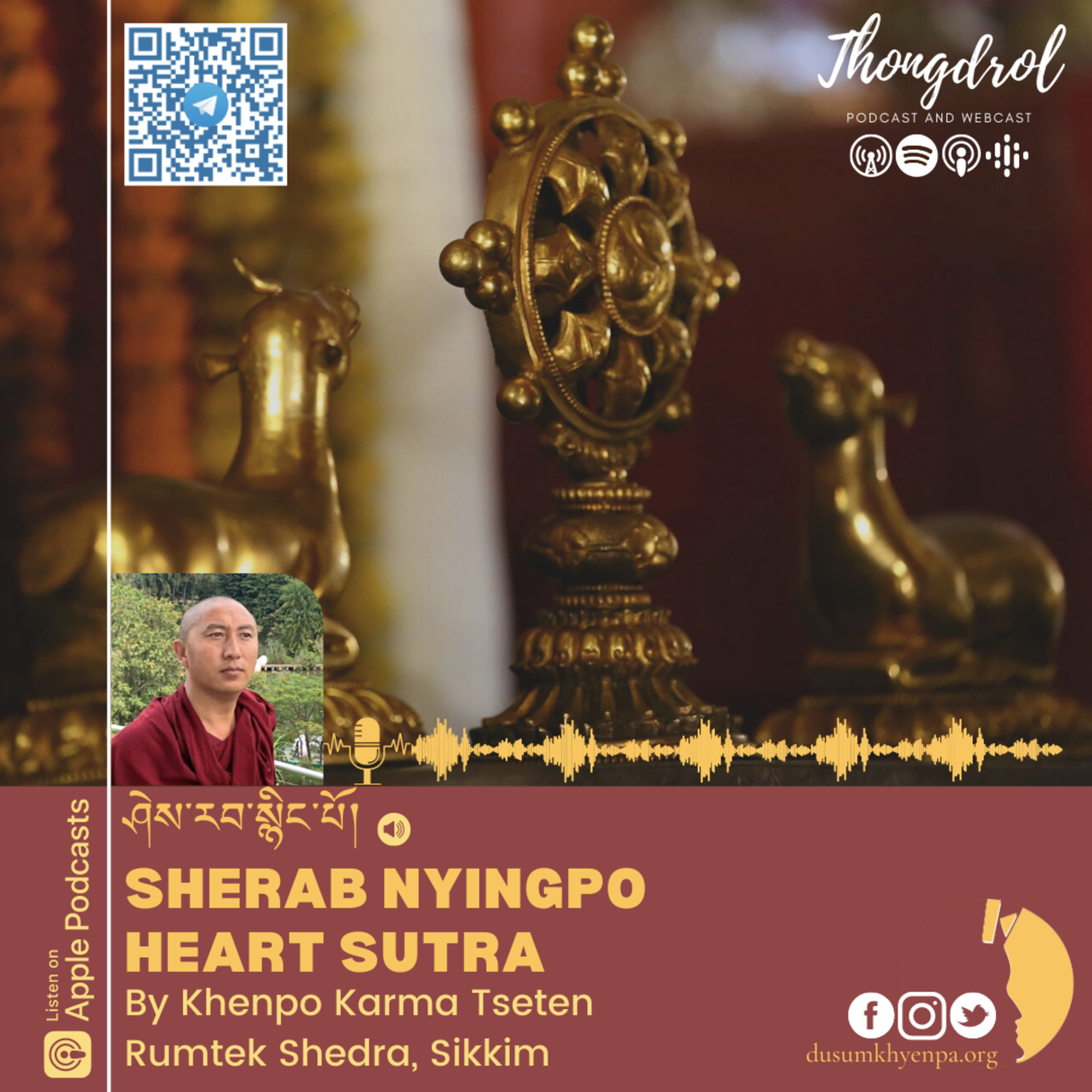
ThongdrolSherab Nyingpo Ep 5 - Heart Sutra by Khenpo Karma Tseten - 5The Heart Sutra(བཅོམ་ལྡན་འདས་མ་ཤེས་རབ་ཀྱི་ཕ་རོལ་ཏུ་ཕྱིན་པའི་སྙིང་པོ) is the most widely known sutra of the Mahayana tradition of Tibetan Buddhism. It is part of the Prajnaparamita Sutras, which is a collection of about 40 sutras composed between 100 BCE and 500 CE. The Heart Sutra is a presentation of profound wisdom on the nature of emptiness. The Sutra famously states, "Form is emptiness (śūnyatā), emptiness is form." It is a condensed exposé on the Buddhist Mahayana teaching of the Two Truths doctrine, which says that ultimately all phenomena are sunyata, empty of an unchanging essence. This emptiness is a 'characteristic' of all phenomena, and not a transcendent reality, but also "empty" of essence of its own. Specifically, it is a response to Sarvastiva...
2020-11-1200 min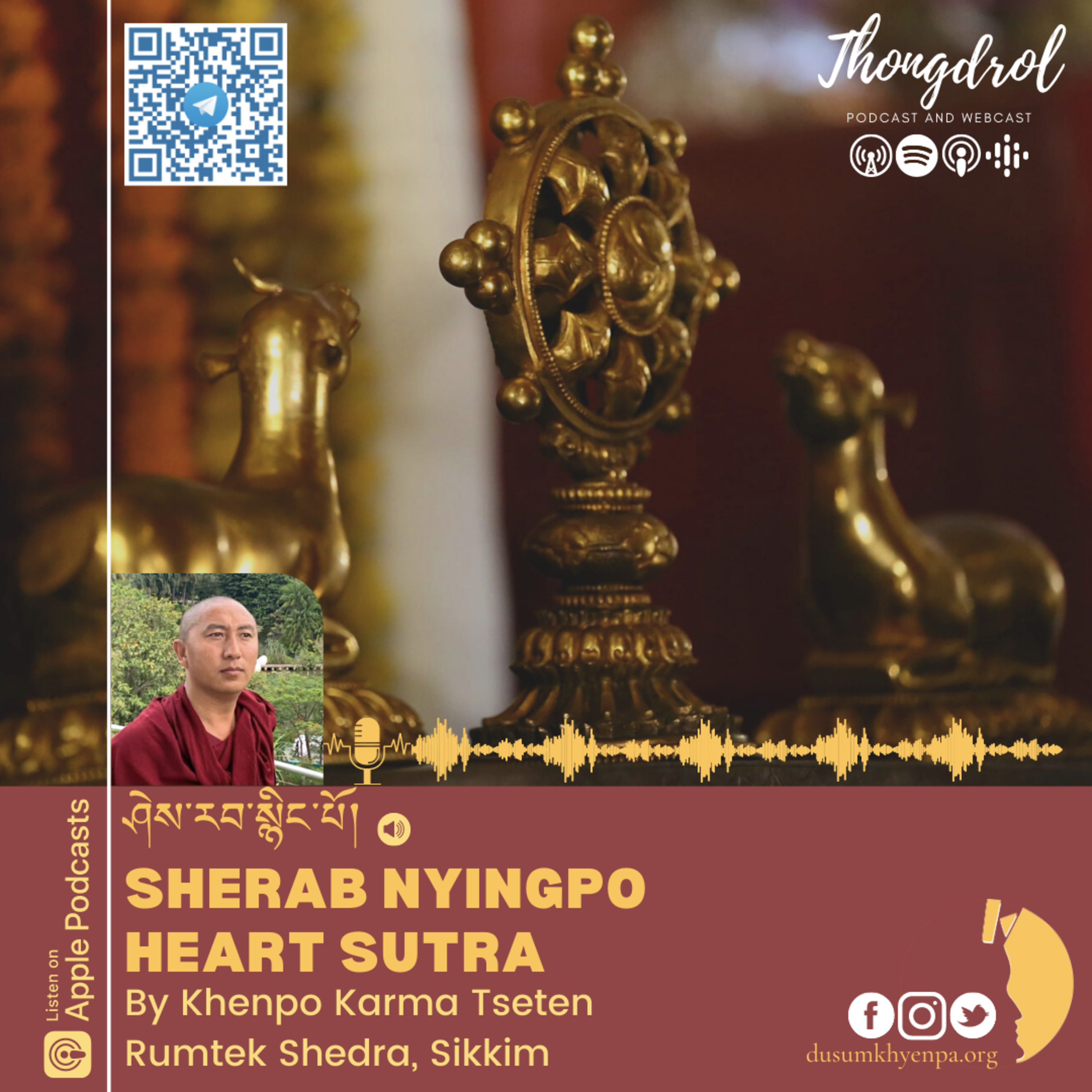
ThongdrolSherab Nyingpo Ep 4 - Heart Sutra by Khenpo Karma Tseten - 4The Heart Sutra(བཅོམ་ལྡན་འདས་མ་ཤེས་རབ་ཀྱི་ཕ་རོལ་ཏུ་ཕྱིན་པའི་སྙིང་པོ) is the most widely known sutra of the Mahayana tradition of Tibetan Buddhism. It is part of the Prajnaparamita Sutras, which is a collection of about 40 sutras composed between 100 BCE and 500 CE. The Heart Sutra is a presentation of profound wisdom on the nature of emptiness.
The Sutra famously states, "Form is emptiness (śūnyatā), emptiness is form." It is a condensed exposé on the Buddhist Mahayana teaching of the Two Truths doctrine, which says that ultimately all phenomena are sunyata, empty of an unchanging essence. This emptiness is a 'characteristic' of all phenomena, and not a transcendent reality, but also "empty" of essence of its own. Specifically, it is a response to Sarv...
2020-11-1100 min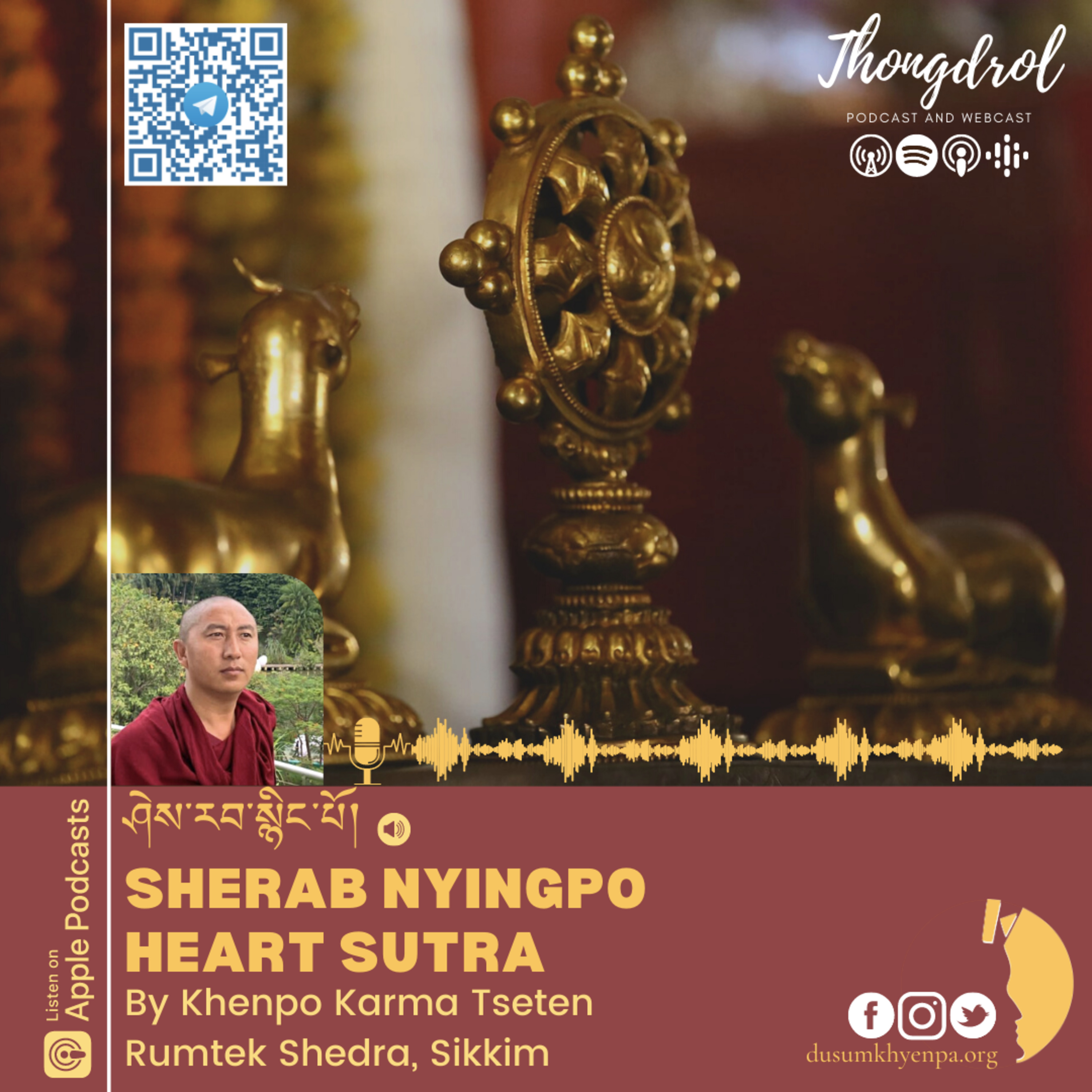
ThongdrolSherab Nyingpo Ep 3 - Heart Sutra by Khenpo Karma Tseten - 3The Heart Sutra(བཅོམ་ལྡན་འདས་མ་ཤེས་རབ་ཀྱི་ཕ་རོལ་ཏུ་ཕྱིན་པའི་སྙིང་པོ) is the most widely known sutra of the Mahayana tradition of Tibetan Buddhism. It is part of the Prajnaparamita Sutras, which is a collection of about 40 sutras composed between 100 BCE and 500 CE. The Heart Sutra is a presentation of profound wisdom on the nature of emptiness.
The Sutra famously states, "Form is emptiness (śūnyatā), emptiness is form." It is a condensed exposé on the Buddhist Mahayana teaching of the Two Truths doctrine, which says that ultimately all phenomena are sunyata, empty of an unchanging essence. This emptiness is a 'characteristic' of all phenomena, and not a transcendent reality, but also "empty" of essence of its own. Specifically, it is a response to Sarv...
2020-11-1100 min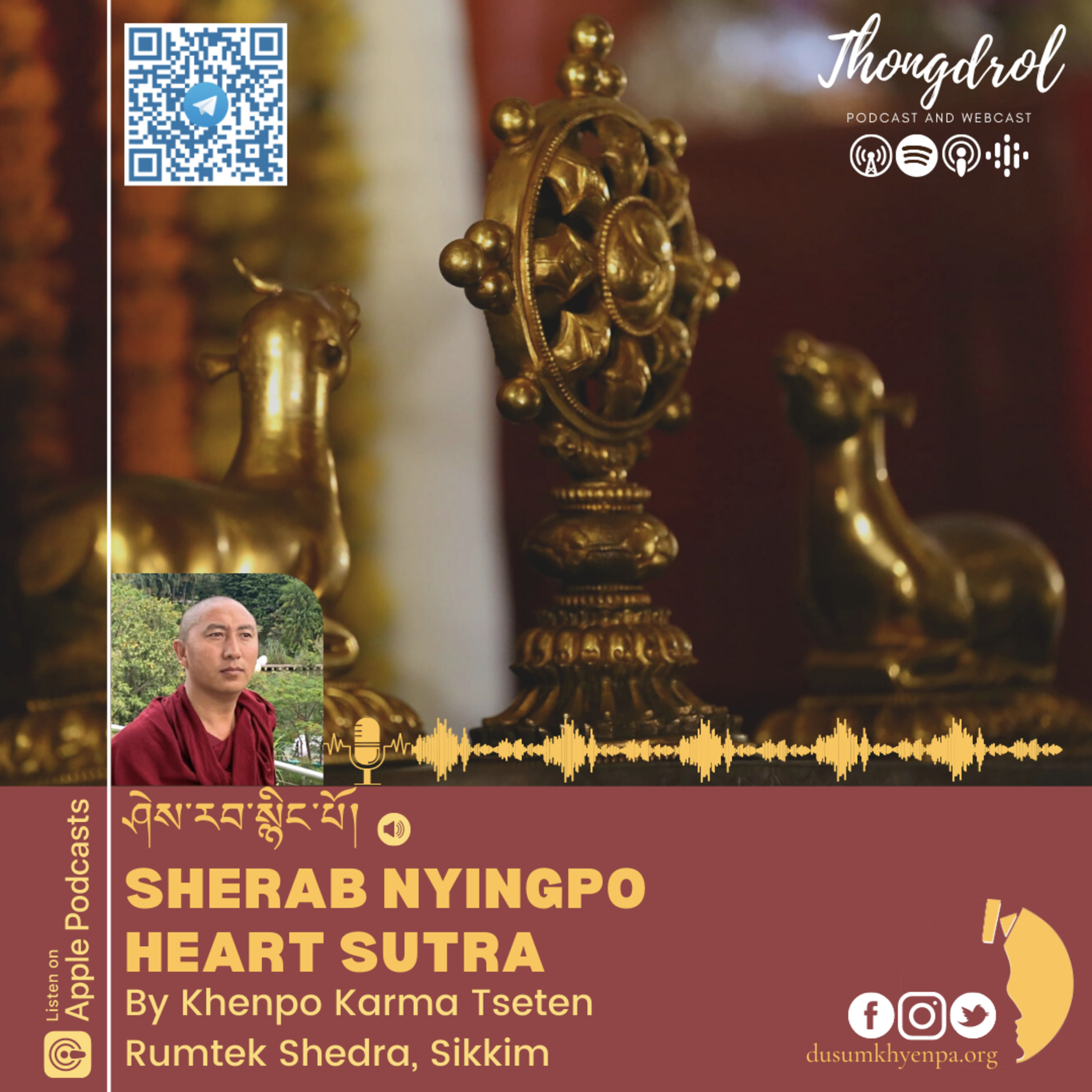
ThongdrolSherab Nyingpo Ep 2 - Heart Sutra by Khenpo Karma Tseten - 2The Heart Sutra(བཅོམ་ལྡན་འདས་མ་ཤེས་རབ་ཀྱི་ཕ་རོལ་ཏུ་ཕྱིན་པའི་སྙིང་པོ) is the most widely known sutra of the Mahayana tradition of Tibetan Buddhism. It is part of the Prajnaparamita Sutras, which is a collection of about 40 sutras composed between 100 BCE and 500 CE. The Heart Sutra is a presentation of profound wisdom on the nature of emptiness.
The Sutra famously states, "Form is emptiness (śūnyatā), emptiness is form." It is a condensed exposé on the Buddhist Mahayana teaching of the Two Truths doctrine, which says that ultimately all phenomena are sunyata, empty of an unchanging essence. This emptiness is a 'characteristic' of all phenomena, and not a transcendent reality, but also "empty" of essence of its own. Specifically, it is a response to Sarv...
2020-11-1100 min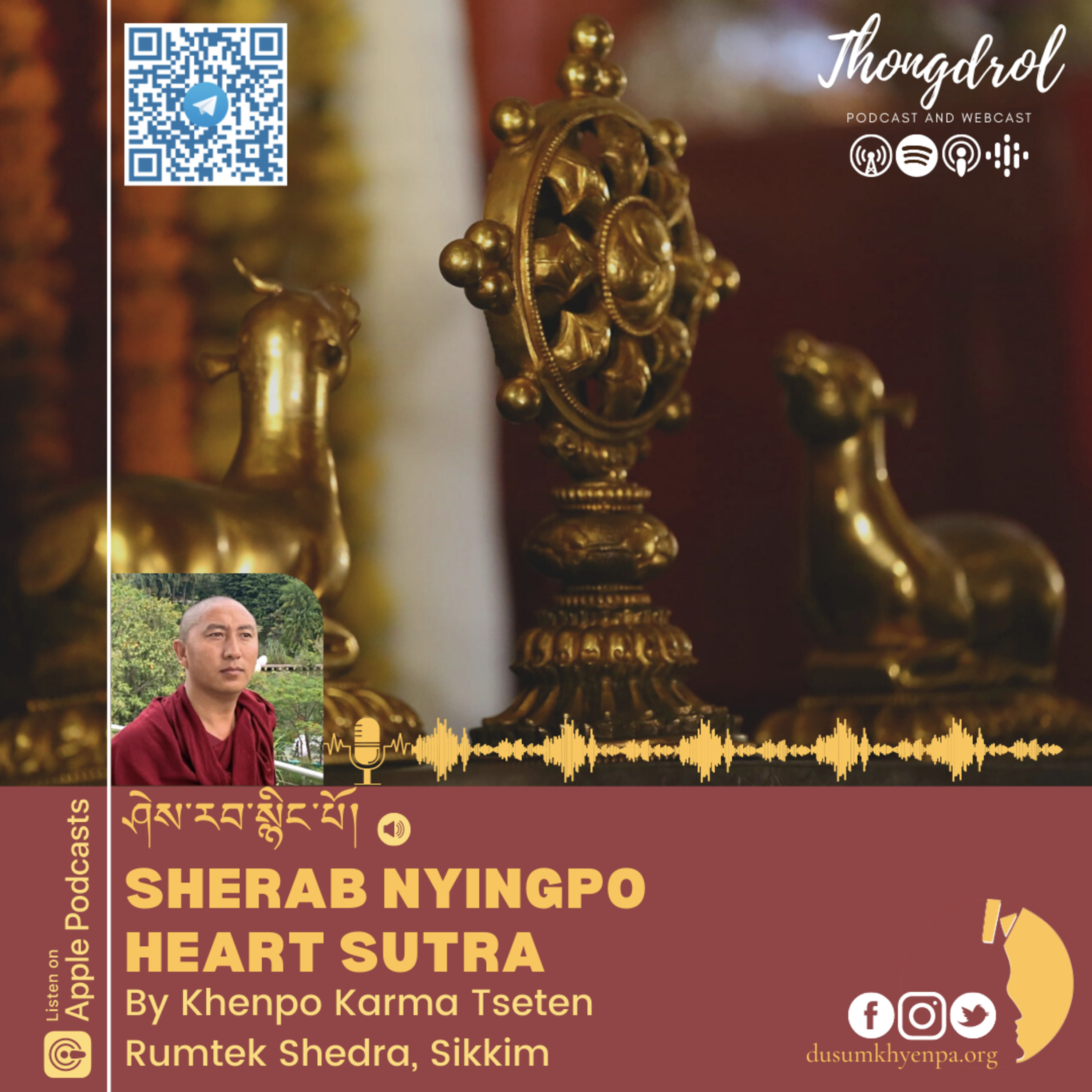
ThongdrolSherab Nyingpo Ep 1 - Heart Sutra by Khenpo Karma Tseten - 1The Heart Sutra(བཅོམ་ལྡན་འདས་མ་ཤེས་རབ་ཀྱི་ཕ་རོལ་ཏུ་ཕྱིན་པའི་སྙིང་པོ) is the most widely known sutra of the Mahayana tradition of Tibetan Buddhism. It is part of the Prajnaparamita Sutras, which is a collection of about 40 sutras composed between 100 BCE and 500 CE. The Heart Sutra is a presentation of profound wisdom on the nature of emptiness.
The Sutra famously states, "Form is emptiness (śūnyatā), emptiness is form." It is a condensed exposé on the Buddhist Mahayana teaching of the Two Truths doctrine, which says that ultimately all phenomena are sunyata, empty of an unchanging essence. This emptiness is a 'characteristic' of all phenomena, and not a transcendent reality, but also "empty" of essence of its own. Specifically, it is a response to Sarv...
2020-11-1100 min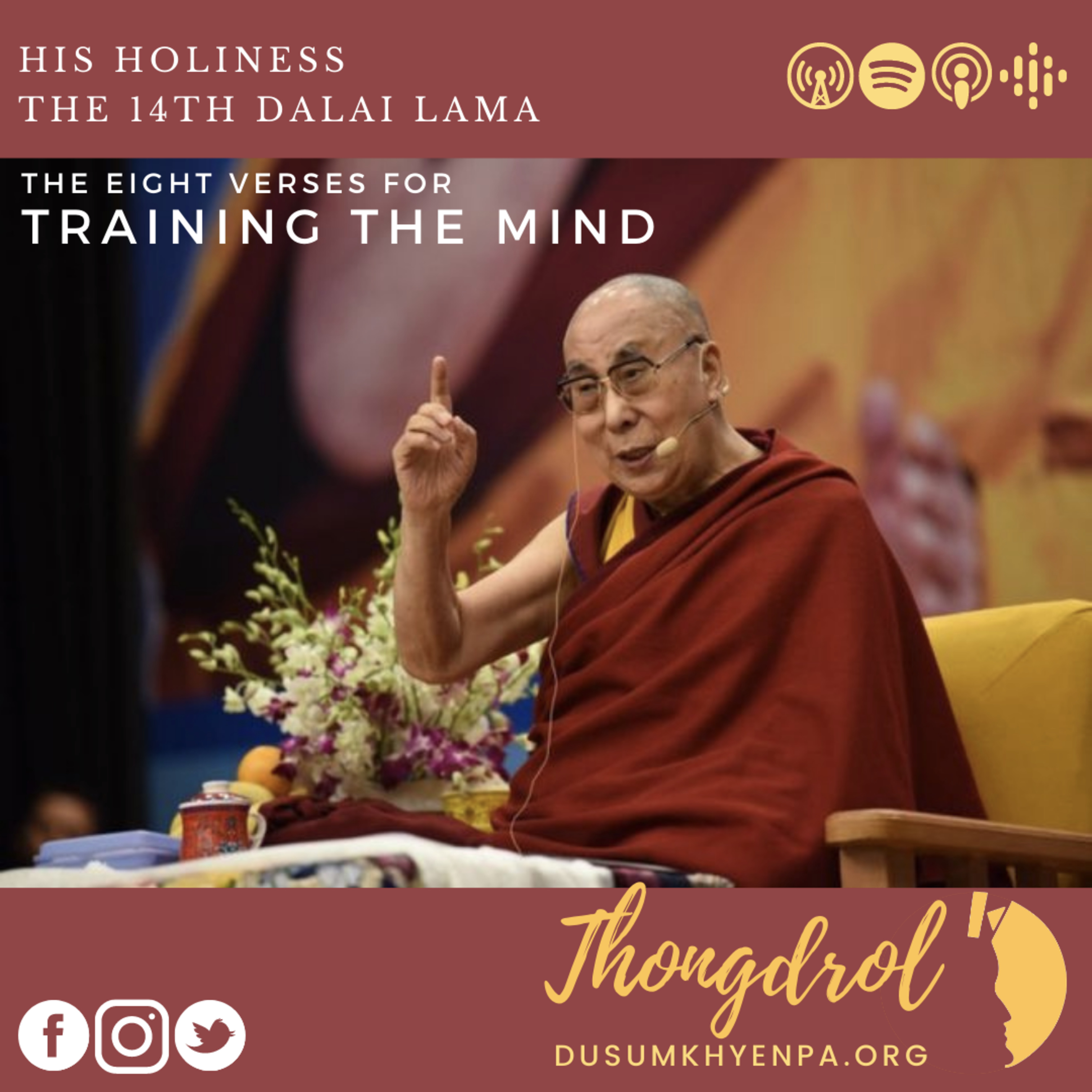
ThongdrolThe Eight Verses for Training the Mind by HH the Dalai Lama Ep. 4Generating the Mind for Enlightenment
For those who admire the spiritual ideals of the Eight verses on Transforming the Mind it is helpful to recite the following verses for generating the mind for enlightenment. Practicing Buddhists should recite the verses and reflect upon the meaning of the words, while trying to enhance their altruism and compassion. Those of you who are practitioners of other religious traditions can draw from your own spiritual teachings, and try to commit yourselves to cultivating altruistic thoughts in pursuit of the altruistic ideal.
With a wish to free all beings...
2020-11-0900 min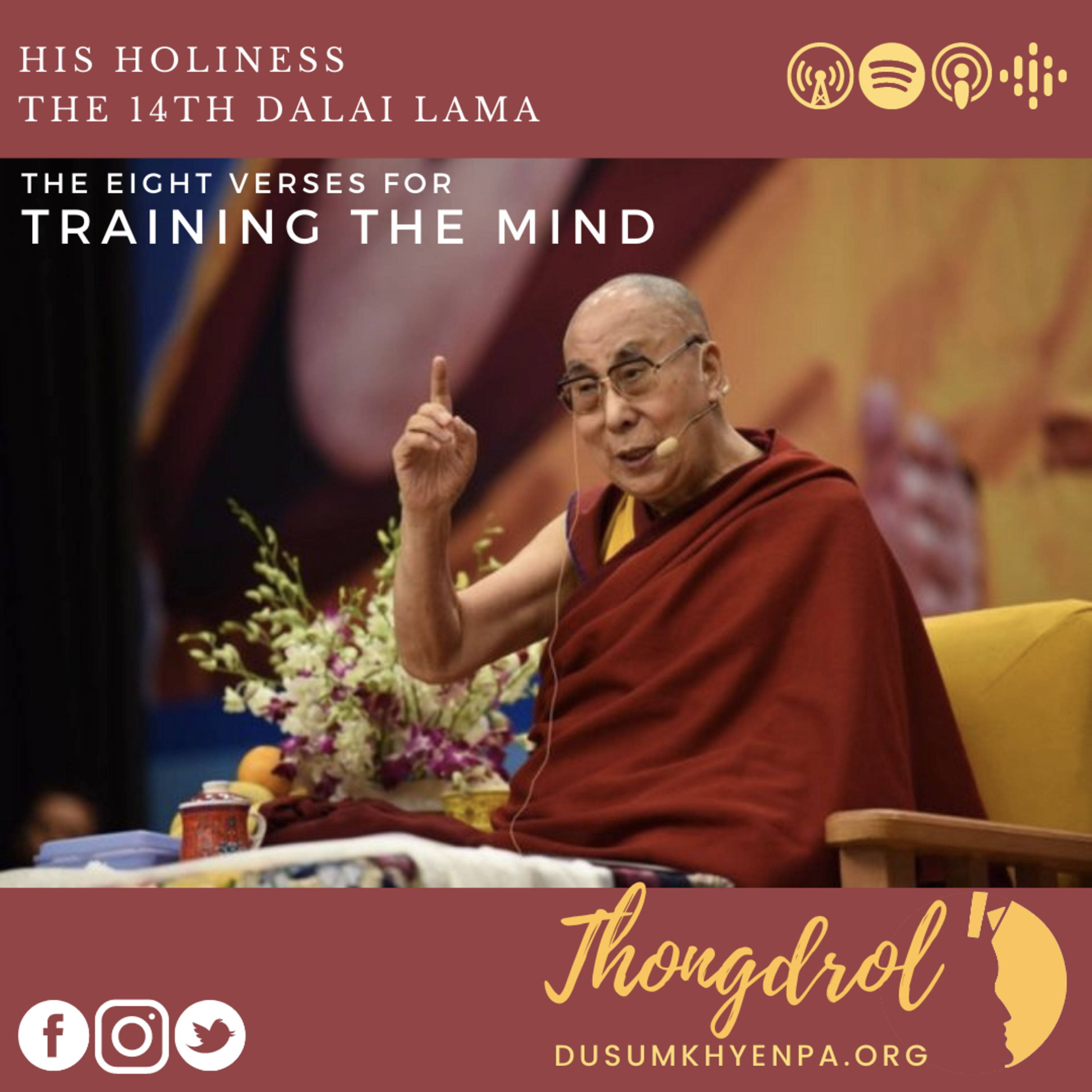
ThongdrolThe Eight Verses for Training the Mind by HH the Dalai Lama Ep. 3Generating the Mind for Enlightenment
For those who admire the spiritual ideals of the Eight verses on Transforming the Mind it is helpful to recite the following verses for generating the mind for enlightenment. Practicing Buddhists should recite the verses and reflect upon the meaning of the words, while trying to enhance their altruism and compassion. Those of you who are practitioners of other religious traditions can draw from your own spiritual teachings, and try to commit yourselves to cultivating altruistic thoughts in pursuit of the altruistic ideal.
...
2020-11-0900 min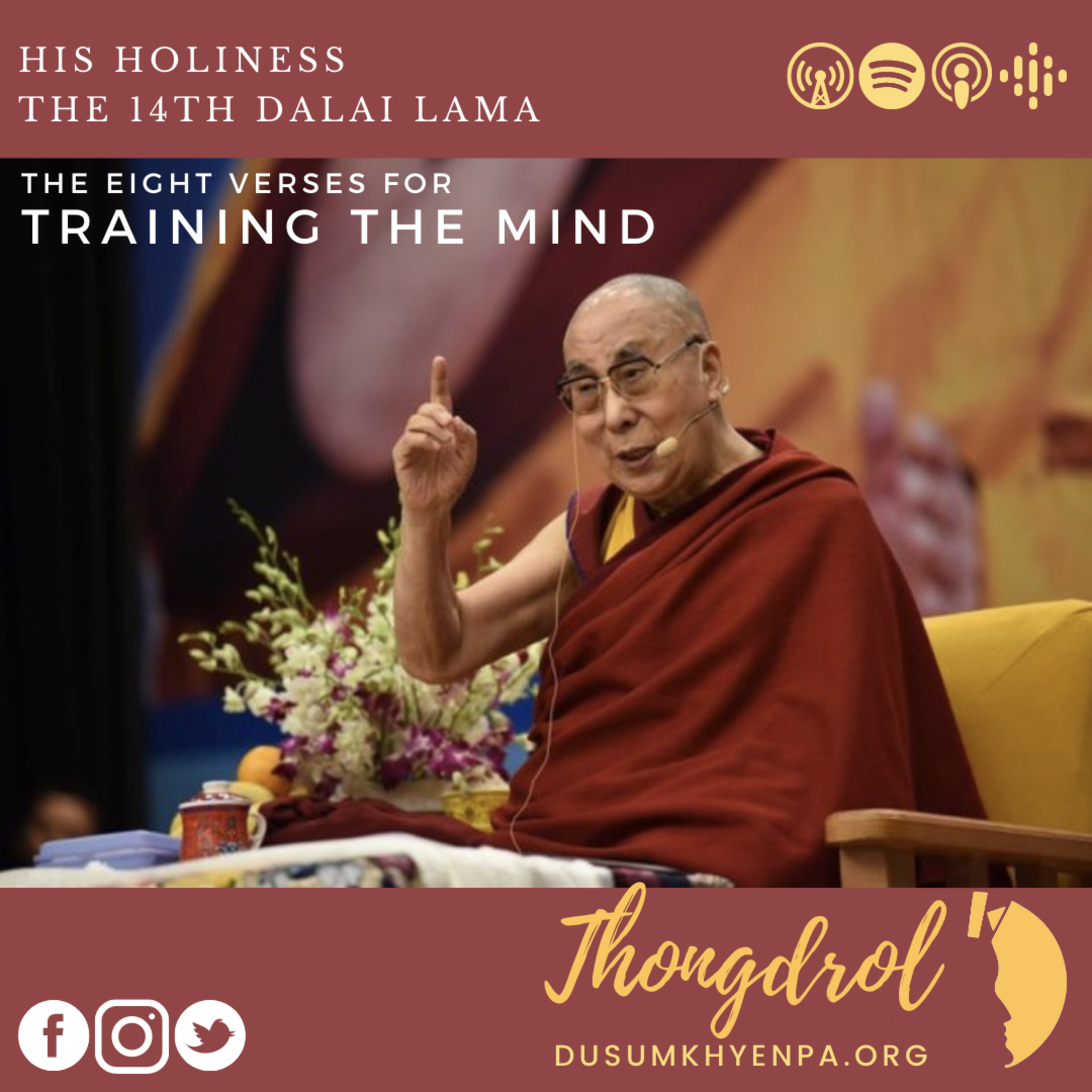
ThongdrolThe Eight Verses for Training the Mind by HH the Dalai Lama Ep. 2Generating the Mind for Enlightenment
For those who admire the spiritual ideals of the Eight verses on Transforming the Mind it is helpful to recite the following verses for generating the mind for enlightenment. Practicing Buddhists should recite the verses and reflect upon the meaning of the words, while trying to enhance their altruism and compassion. Those of you who are practitioners of other religious traditions can draw from your own spiritual teachings, and try to commit yourselves to cultivating altruistic thoughts in pursuit of the altruistic ideal.
...
2020-11-0900 min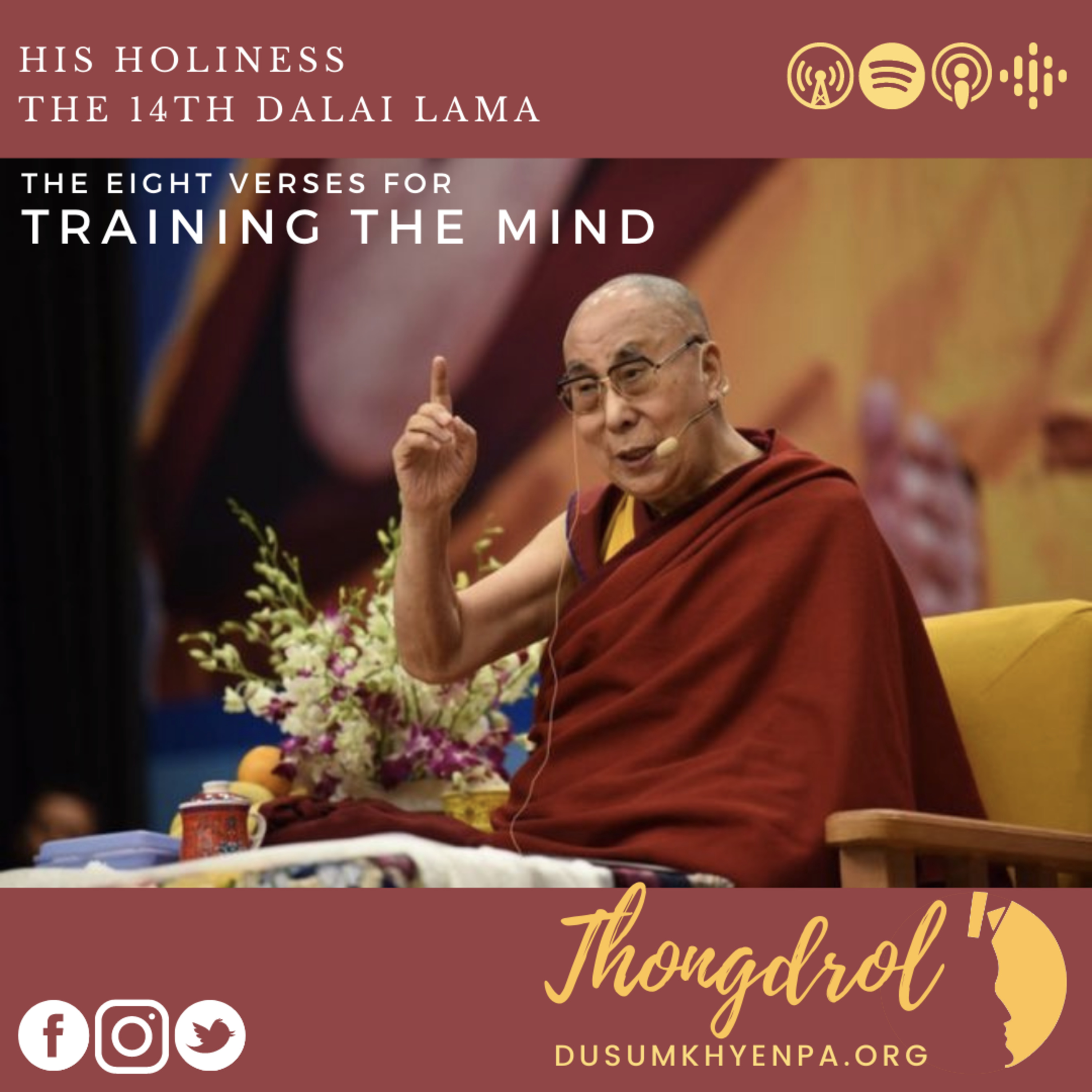
ThongdrolThe Eight Verses for Training the Mind by HH the Dalai Lama Ep. 1Generating the Mind for Enlightenment
For those who admire the spiritual ideals of the Eight verses on Transforming the Mind it is helpful to recite the following verses for generating the mind for enlightenment. Practicing Buddhists should recite the verses and reflect upon the meaning of the words, while trying to enhance their altruism and compassion. Those of you who are practitioners of other religious traditions can draw from your own spiritual teachings, and try to commit yourselves to cultivating altruistic thoughts in pursuit of the altruistic ideal.
With a wish to free all beings...
2020-11-0900 min
ThongdrolGood & Bad དགེ་སྐྱོན། by HH the Dalai Lama - Words of Wisdom seriesWords of wisdom series present bits of advice extracted from different teachings of His Holiness the Dalai lama. This series covers how to train ourselves from anger, family life, religion, daily practice, emotions, and understanding mind.
2020-11-0900 min
ThongdrolChange འགྱུར་བ། by HH the Dalai Lama - Words of Wisdom seriesWords of wisdom series present bits of advice extracted from different teachings of His Holiness the Dalai lama. This series covers how to train ourselves from anger, family life, religion, daily practice, emotions, and understanding mind.
2020-11-0900 min
ThongdrolReligion ཆོས། by HH the Dalai Lama - Words of Wisdom seriesWords of wisdom series present bits of advice extracted from different teachings of His Holiness the Dalai lama. This series covers how to train ourselves from anger, family life, religion, daily practice, emotions, and understanding mind.
2020-11-0900 min
ThongdrolChoepa མཆོད་པ། by HH the Dalai Lama - Words of Wisdom seriesWords of wisdom series present bits of advice extracted from different teachings of His Holiness the Dalai lama. This series covers how to train ourselves from anger, family life, religion, daily practice, emotions, and understanding mind.
2020-11-0900 min
ThongdrolFamily Life ནང་ཚང by HH the Dalai Lama - Words of Wisdom seriesWords of wisdom series present bits of advice extracted from different teachings of His Holiness the Dalai lama. This series covers how to train ourselves from anger, family life, religion, daily practice, emotions, and understanding mind.
2020-11-0900 min
ThongdrolJigten Pey Lha འཇིག་རྟེན་པའི་ལྷ། by HH the Dalai Lama - Words of Wisdom seriesWords of wisdom series present bits of advice extracted from different teachings of His Holiness the Dalai lama. This series covers how to train ourselves from anger, family life, religion, daily practice, emotions, and understanding mind.
2020-11-0900 min
ThongdrolAnger ཁོང་ཁྲོ། by HH the Dalai Lama - Words of Wisdom seriesWords of wisdom series present bits of advice extracted from different teachings of His Holiness the Dalai lama. This series covers how to train ourselves from anger, family life, religion, daily practice, emotions, and understanding mind.
2020-11-0900 min
ThongdrolMind སེམས་ by HH the Dalai Lama - Words of Wisdom seriesWords of wisdom series present bits of advice extracted from different teachings of His Holiness the Dalai lama. This series covers how to train ourselves from anger, family life, religion, daily practice, emotions, and understanding mind.
2020-11-0900 min
ThongdrolProstration ཕྱག་འཚལ་བ། by HH the Dalai Lama - Words of Wisdom seriesWords of wisdom series present bits of advice extracted from different teachings of His Holiness the Dalai lama. This series covers how to train ourselves from anger, family life, religion, daily practice, emotions, and understanding mind.
2020-11-0900 min
ThongdrolJangchup Sempa བྱང་ཆུབ་སེམས། by HH the Dalai Lama - Words of Wisdom seriesWords of wisdom consist of bits of advice extracted from different teachings of His Holiness the Dalai lama. This series covers how to train our ourselves from anger, family life, religion, daily practice, emotions, and understanding once own mind.
2020-11-0900 min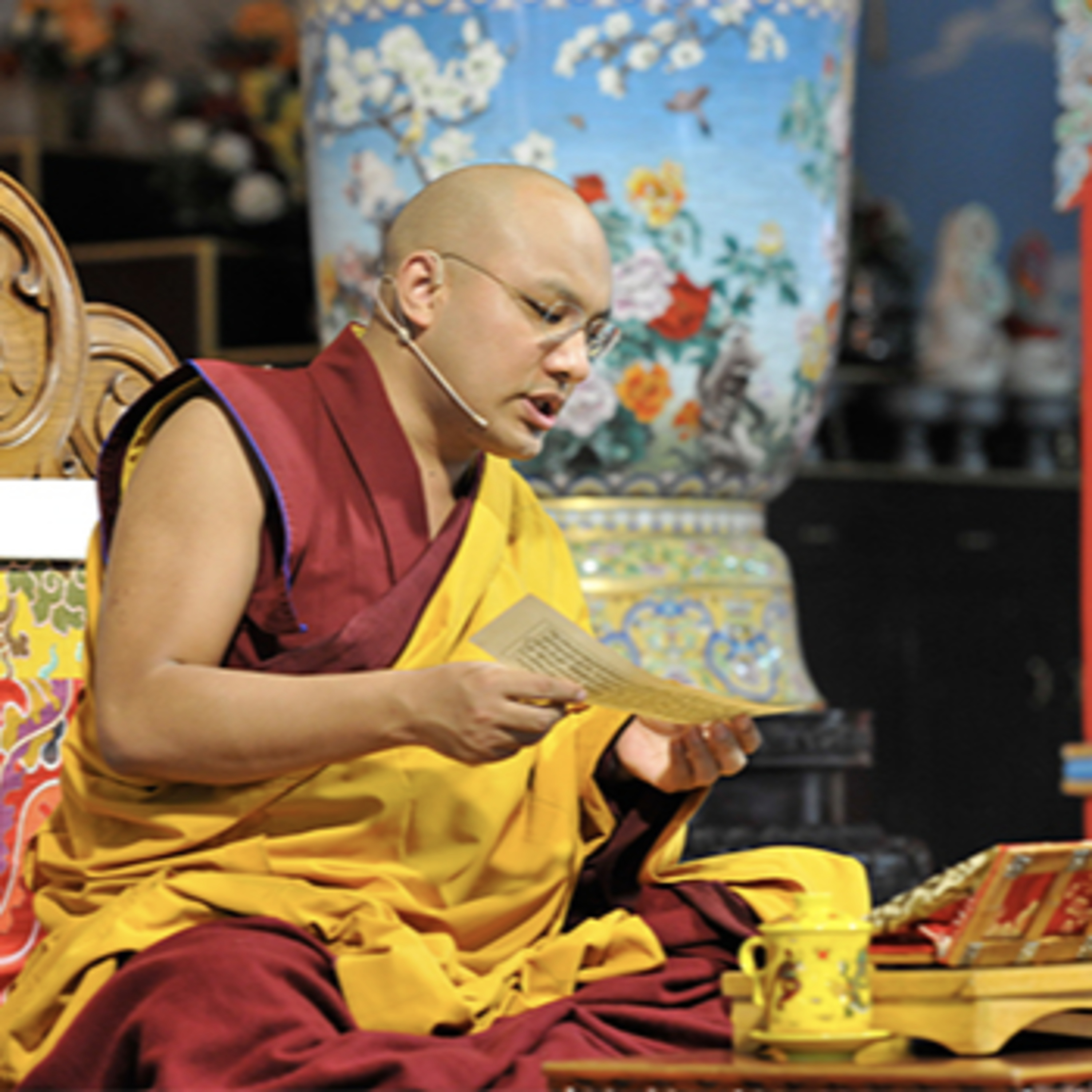
ThongdrolEight Verses of Training the Mind by 17th Gyalwang Karmapaབློ་སྦྱོང་ཚིགས་བརྒྱད་མའི་བཀའ་ཁྲིད། ༧ རྒྱལ་དབང་ཀརྨ་པ་མཆོག
Eight Verses of Training the Mind by 17th Gyalwang Karmapa
January 11 - 12, 2014
Monlam Pavilion, Bodhgaya
Language: Tibetan and English
The Gyalwang Karmapa teaches on The Eight Verses of Training the Mind, one of the most beloved texts on mind training (lojong) that distills its very essence. The author, Geshe Langri Thangpa, was a famous Kadampa teacher, who was also called, “the Serious One,” or “Gloomy Face.” Due to his compassionate focus on the suffering of living beings in samsara, he hardly ever smiled.
“Why are sentient beings so valuable? Because in order to achieve awakening we need bodhicitta, and in order to generate bodhi...
2020-05-022h 02